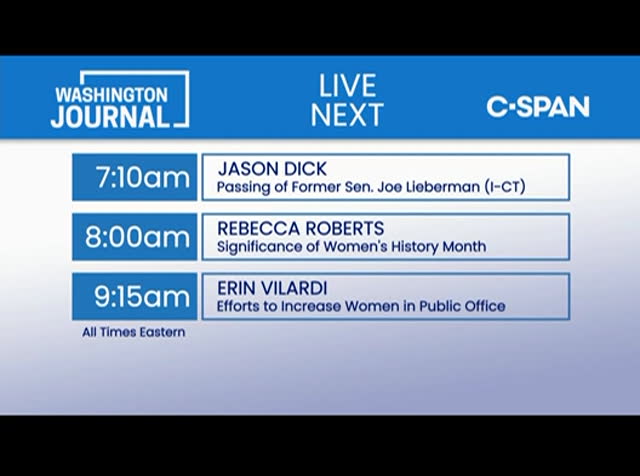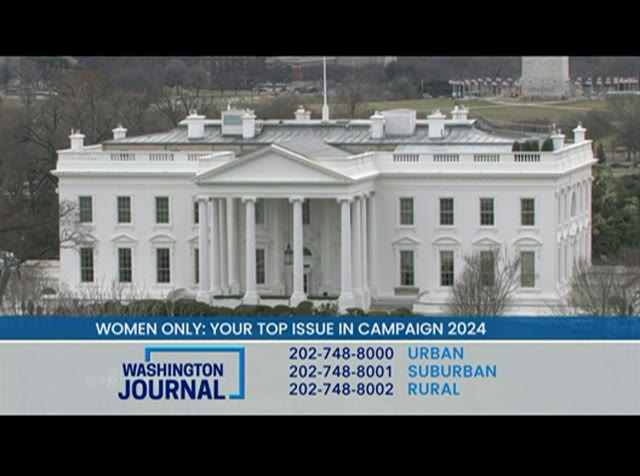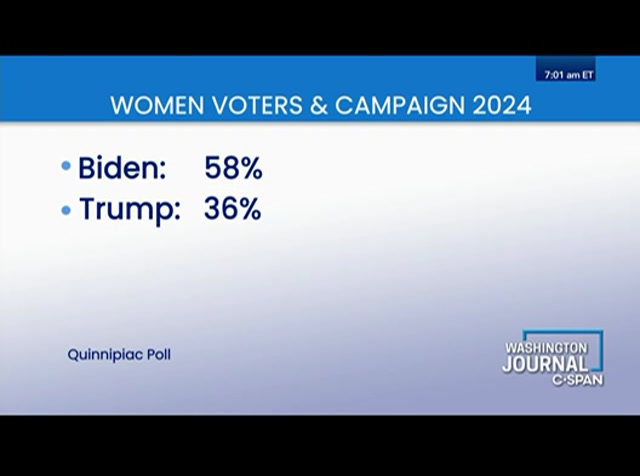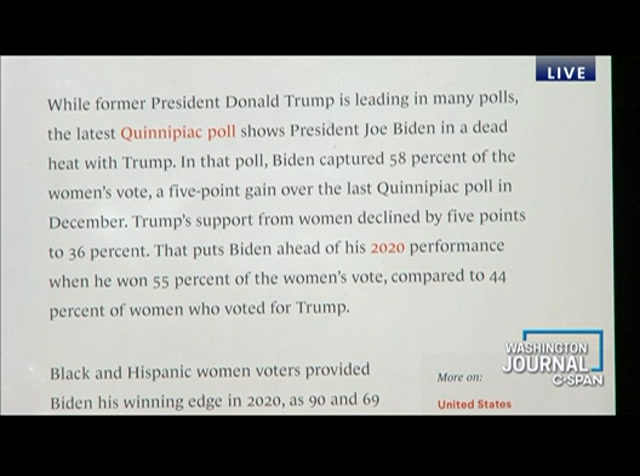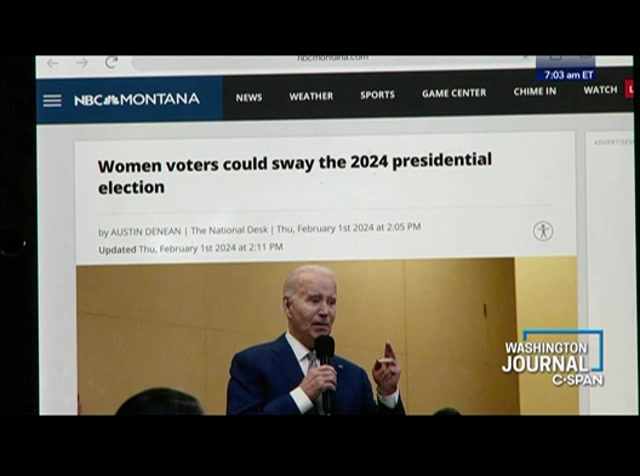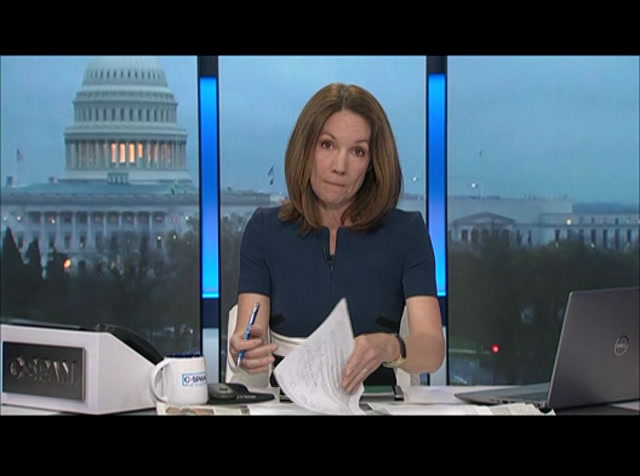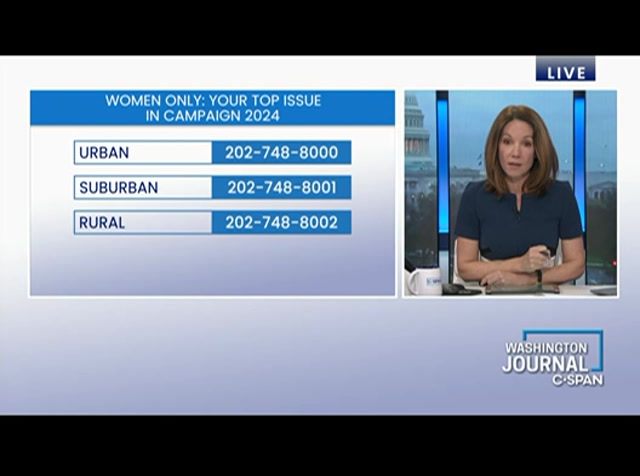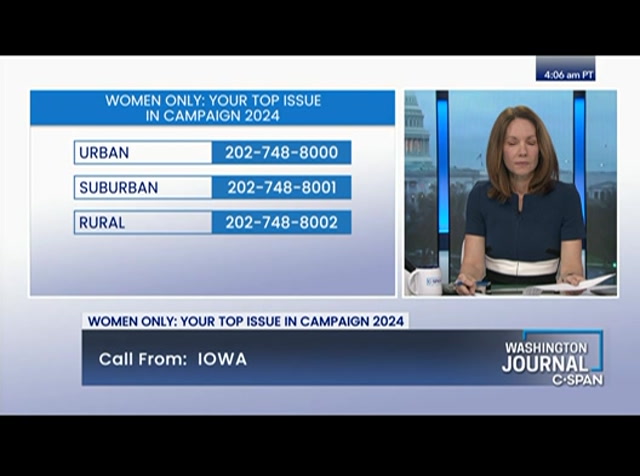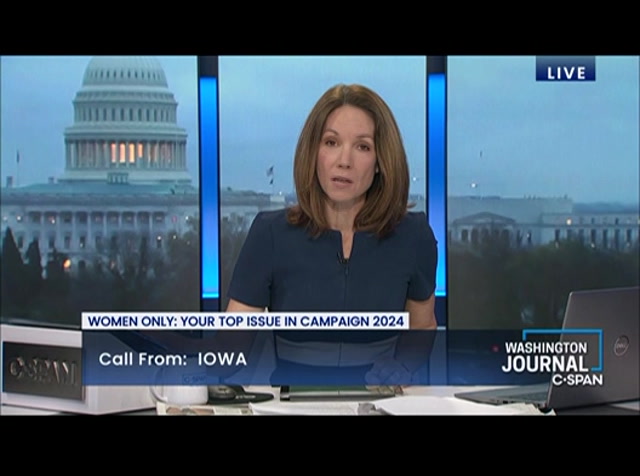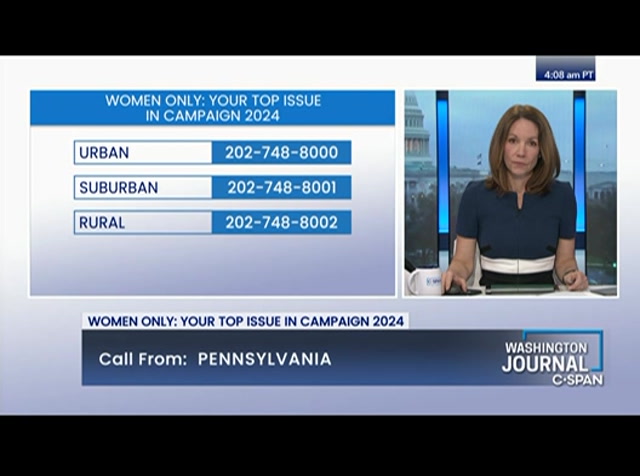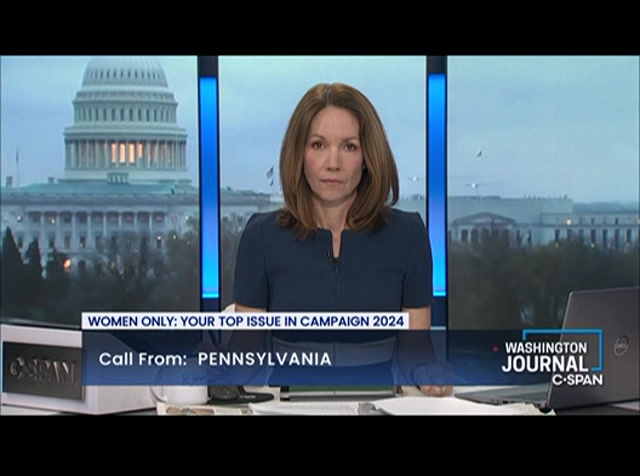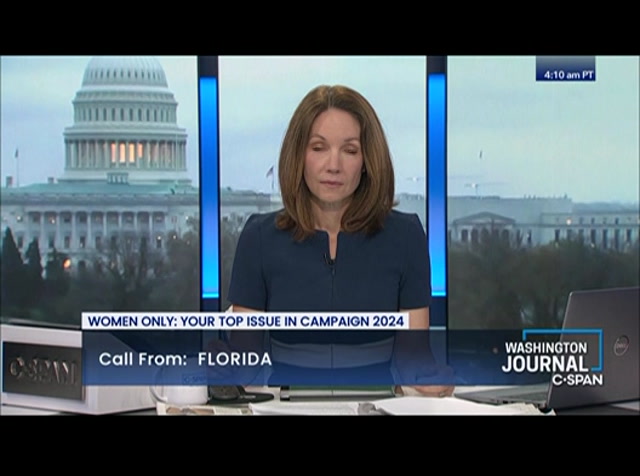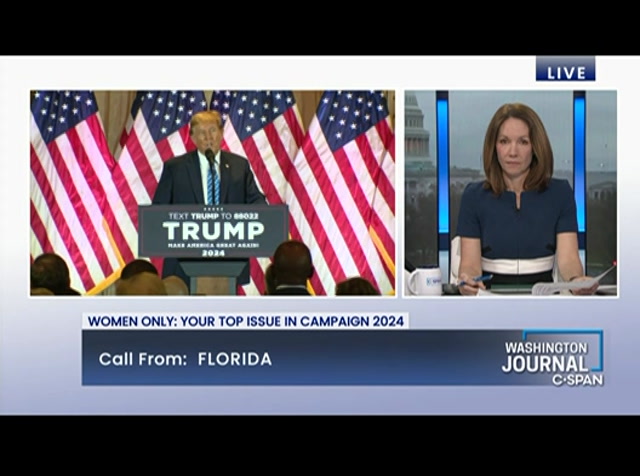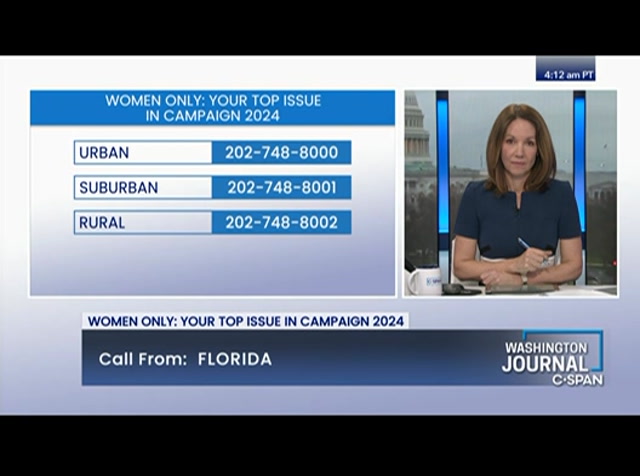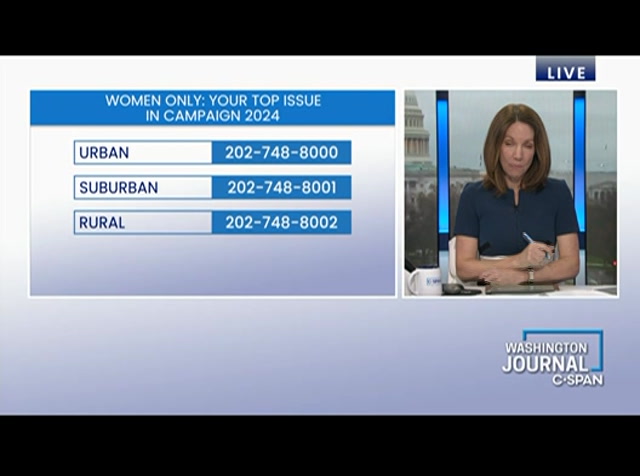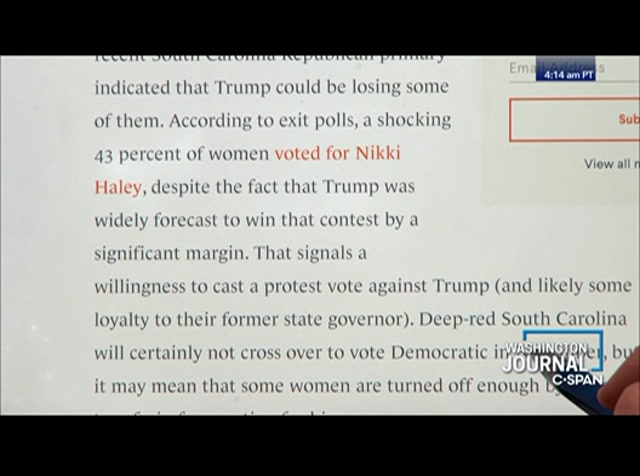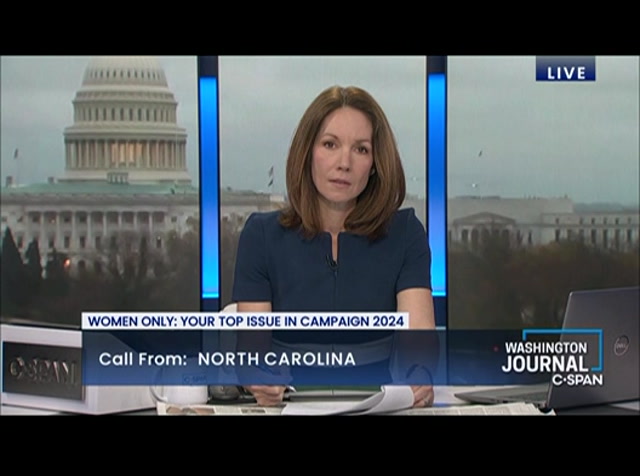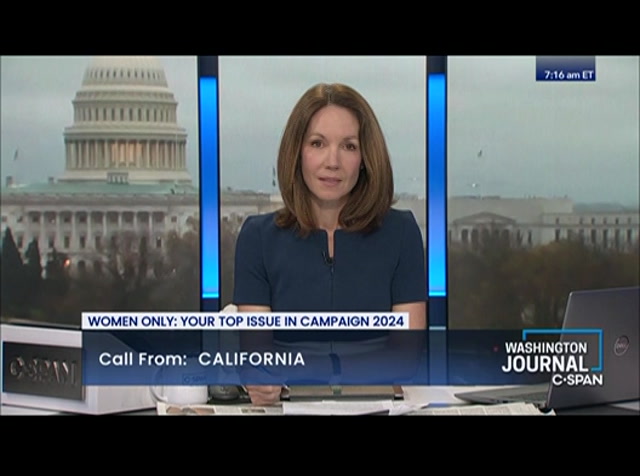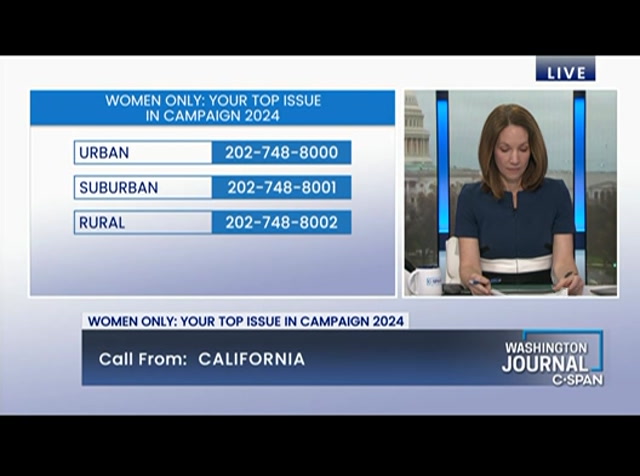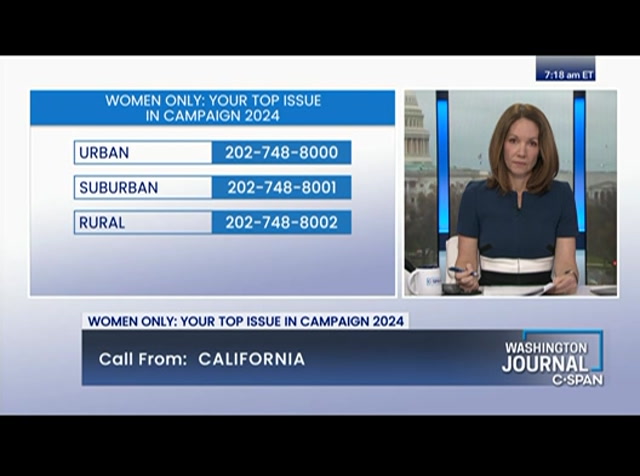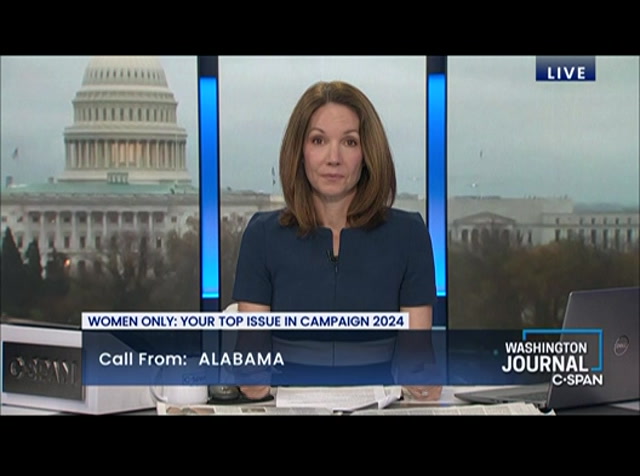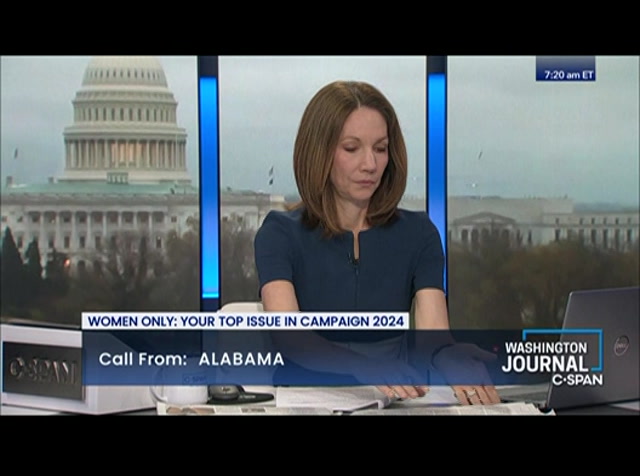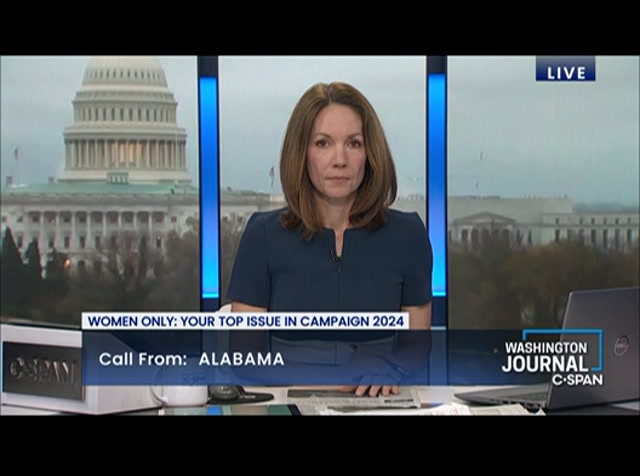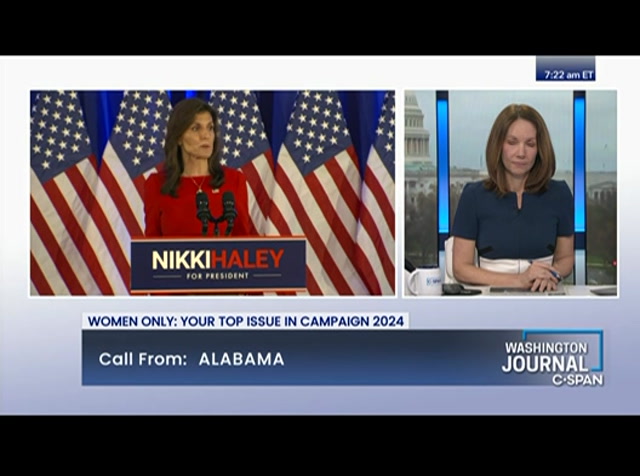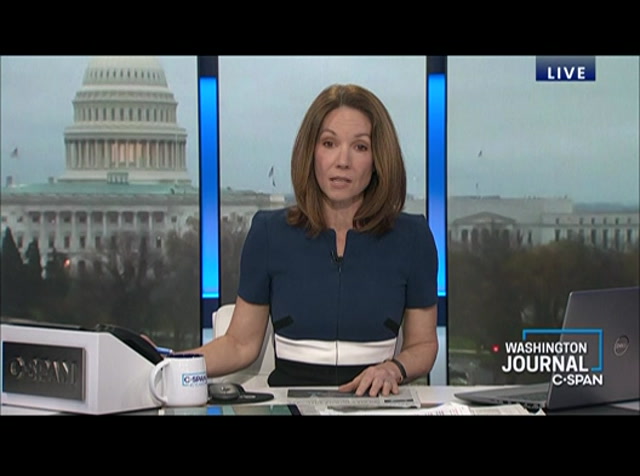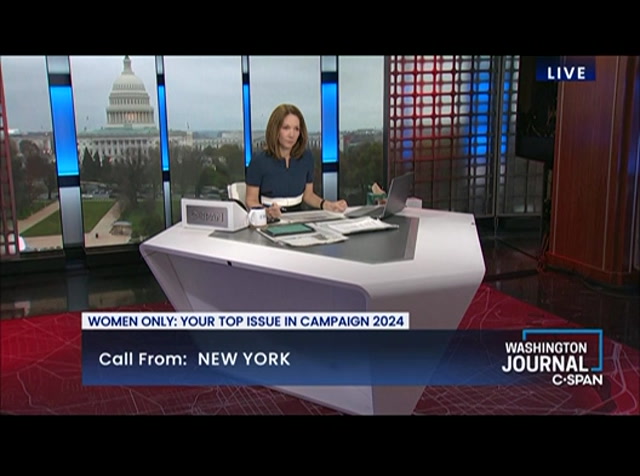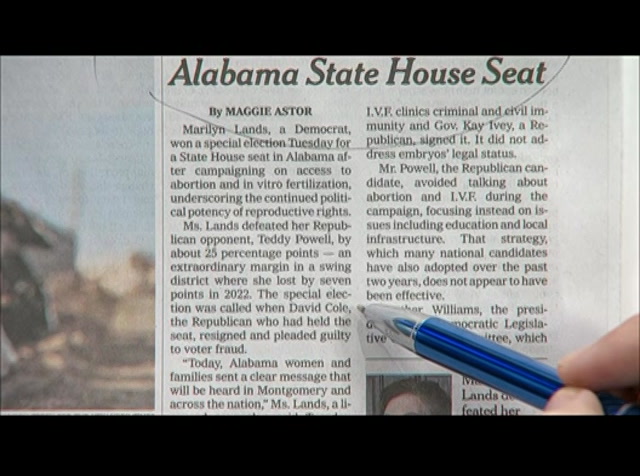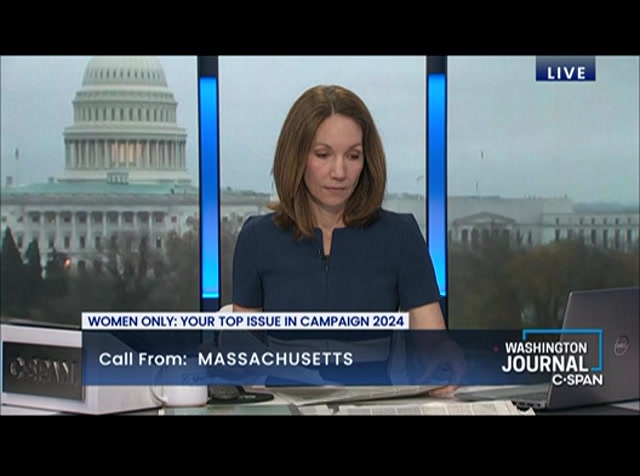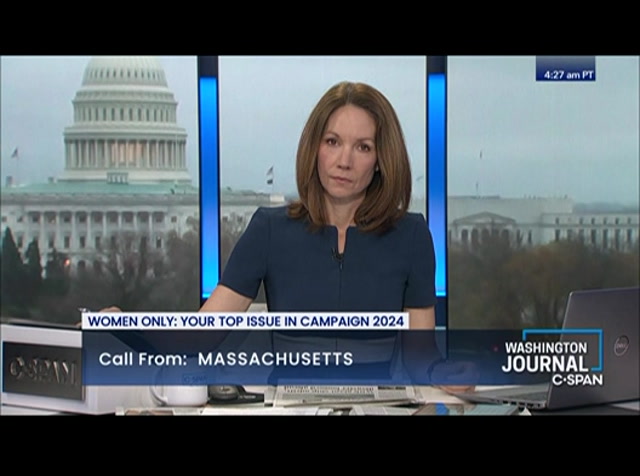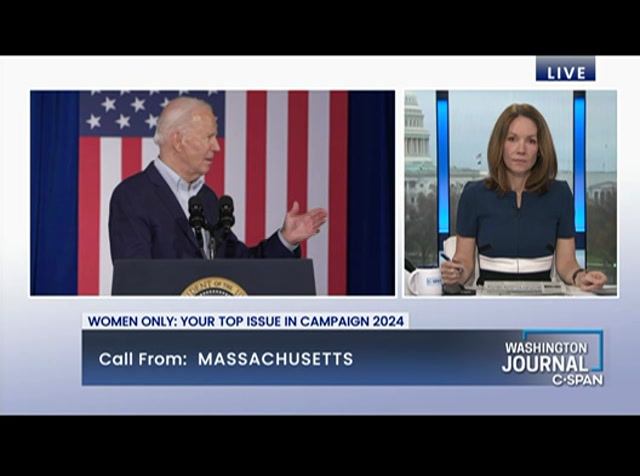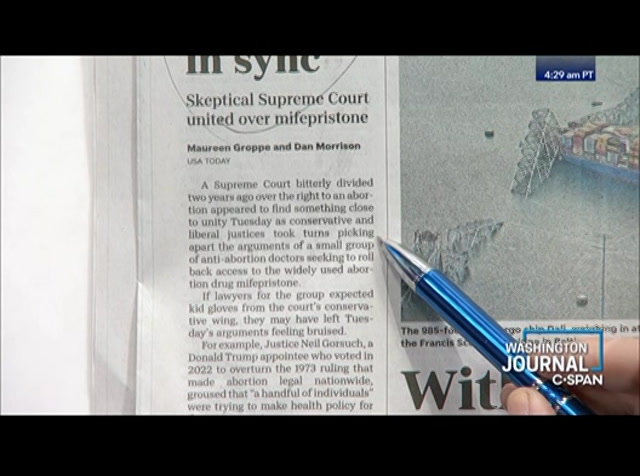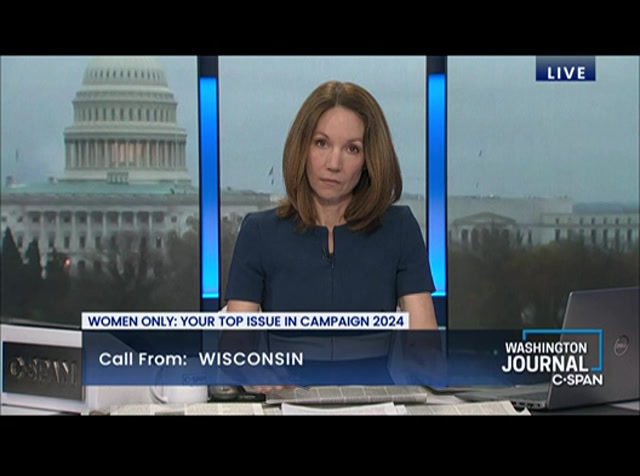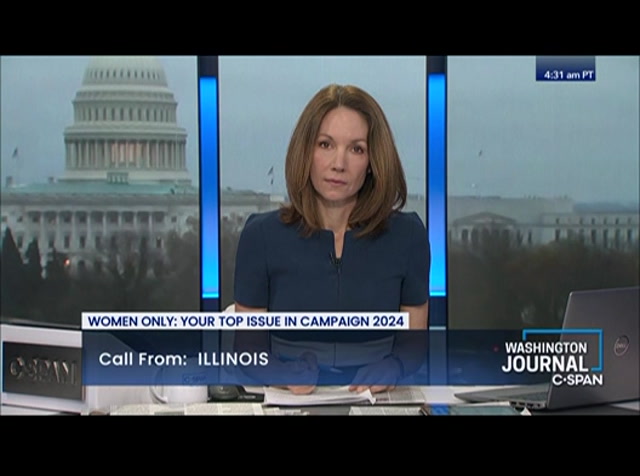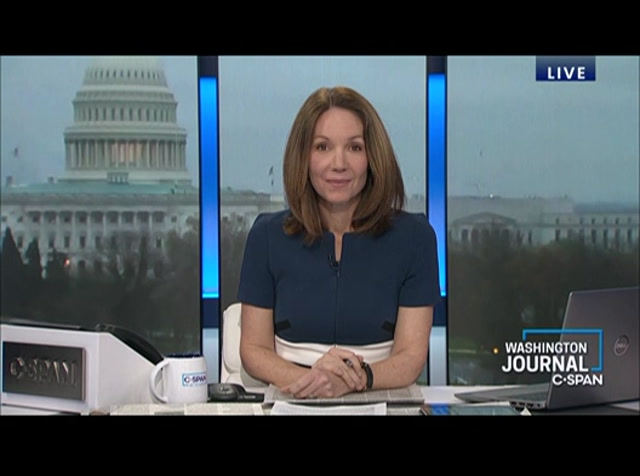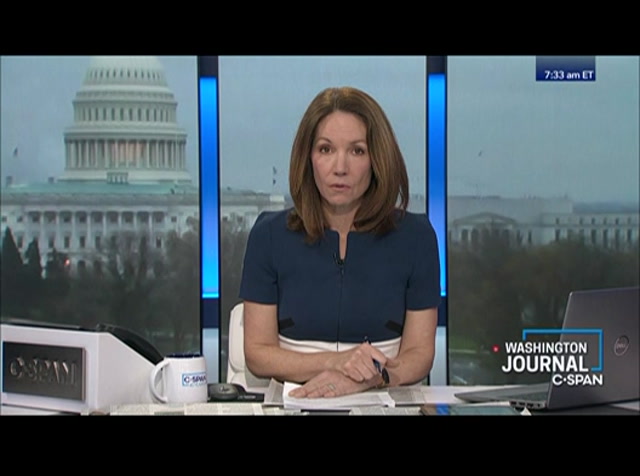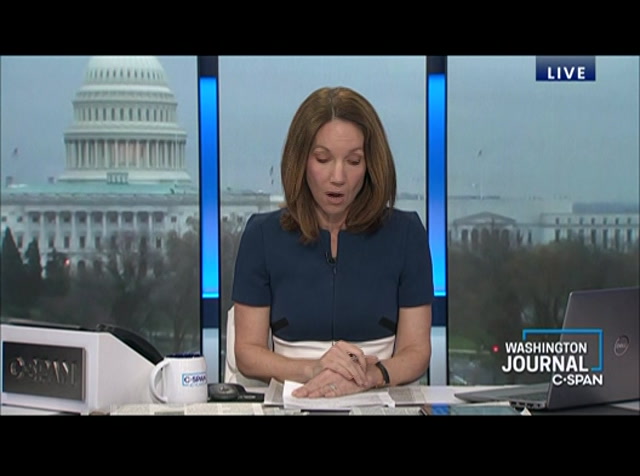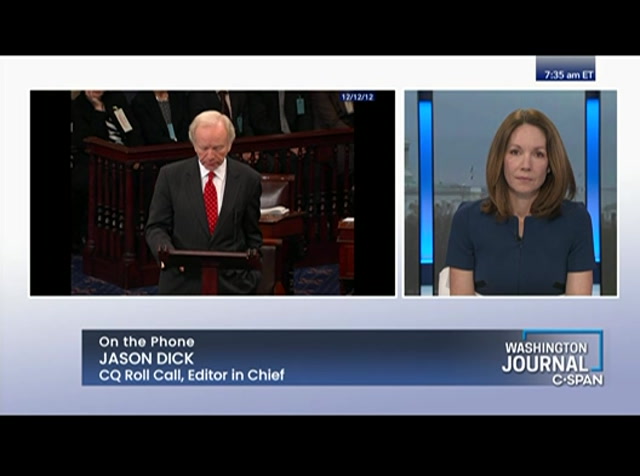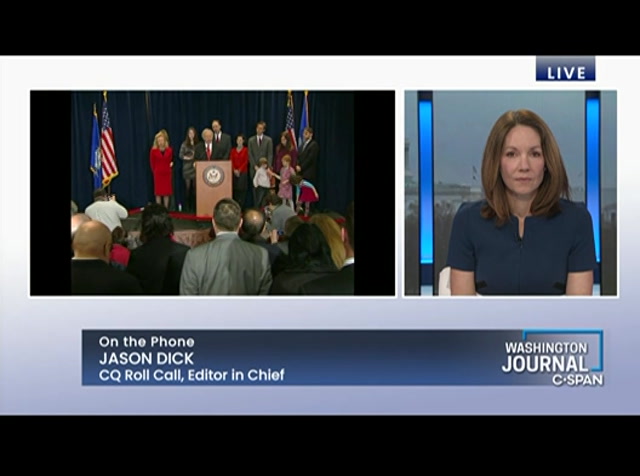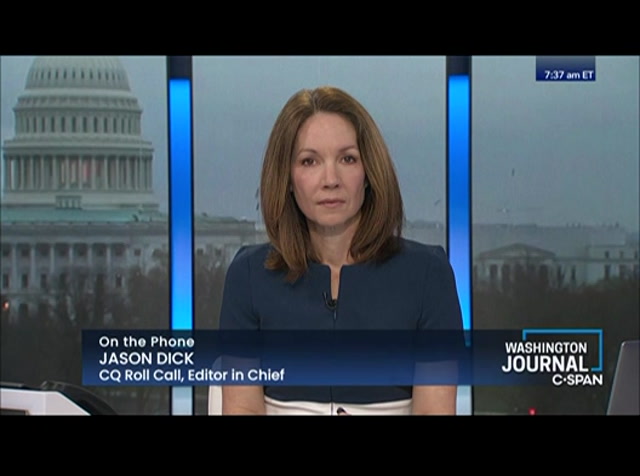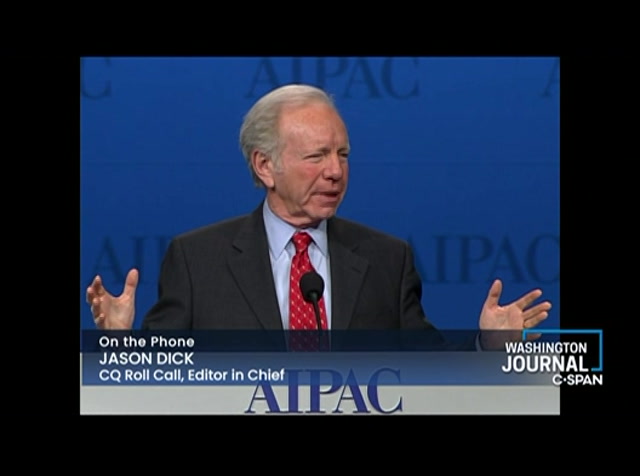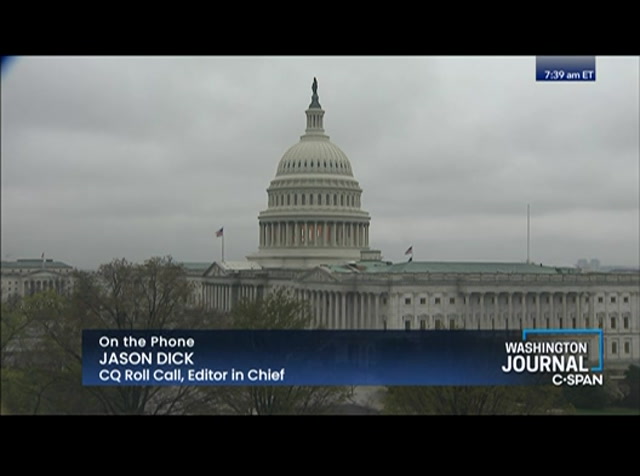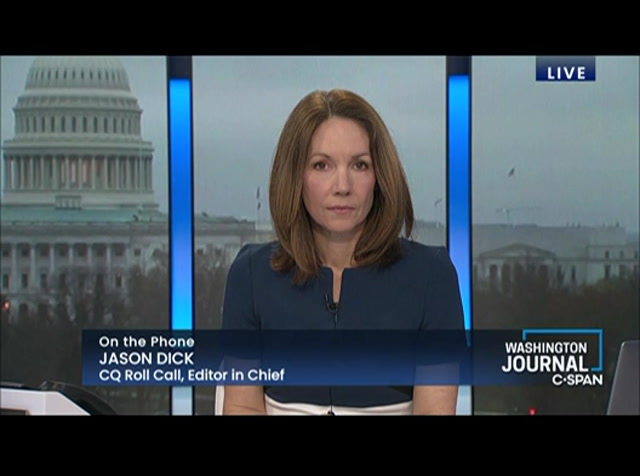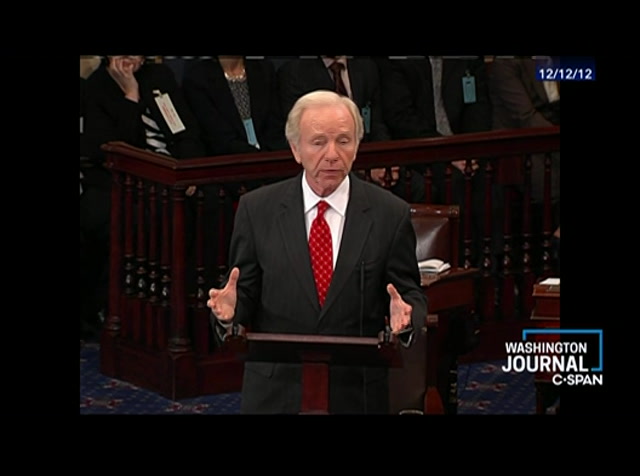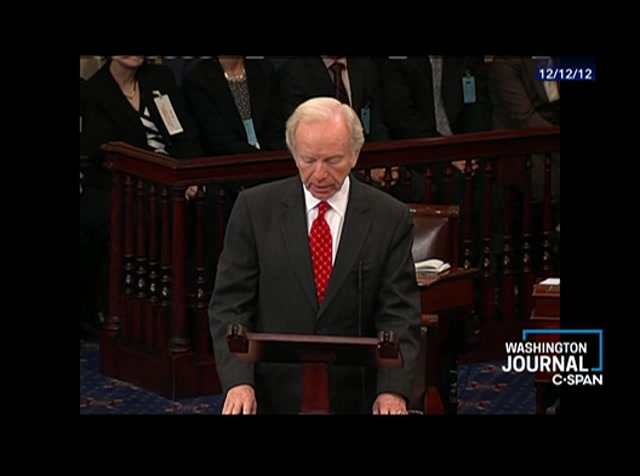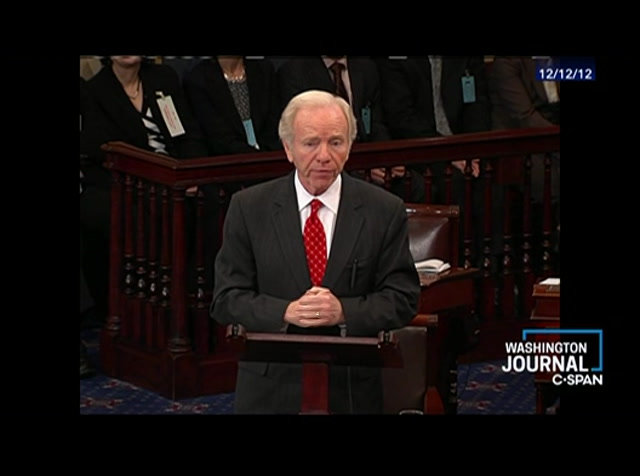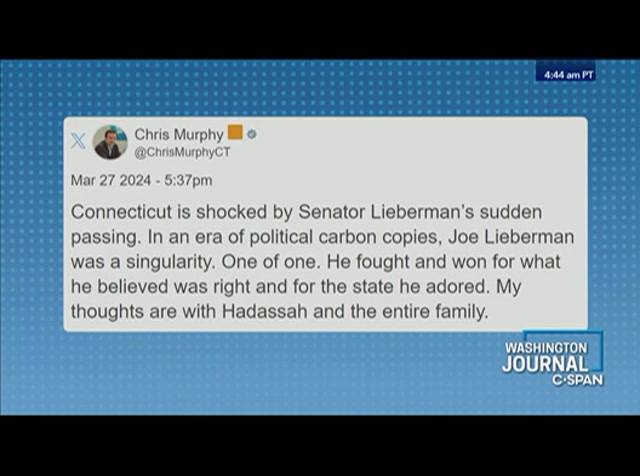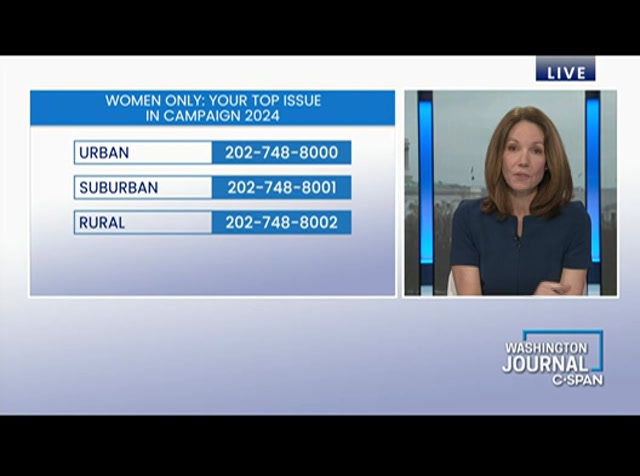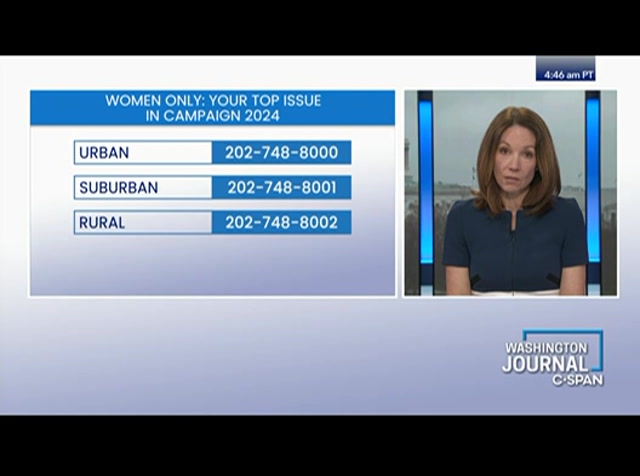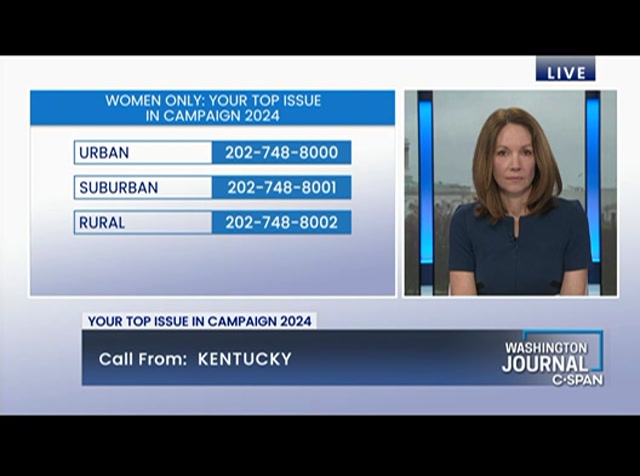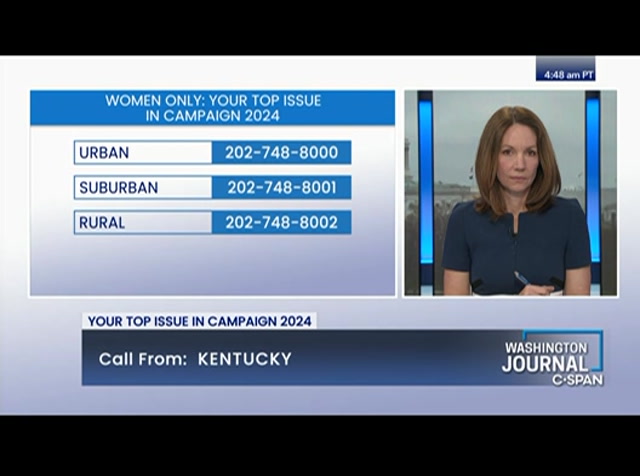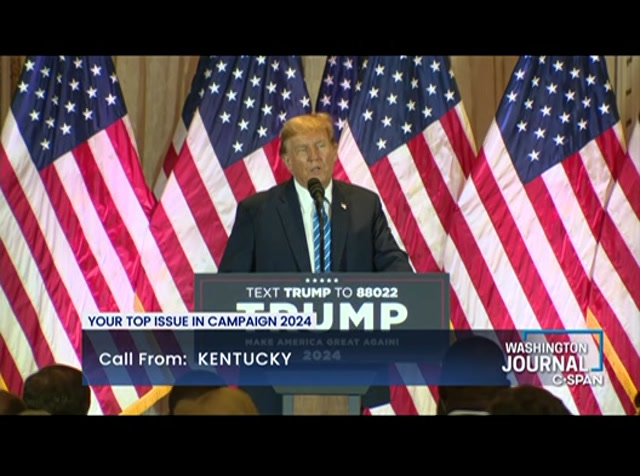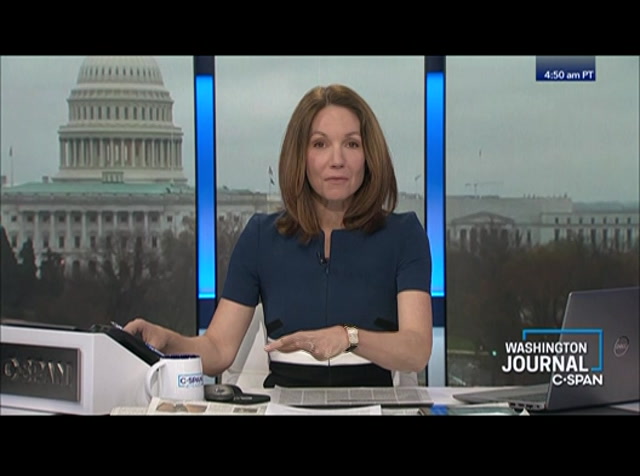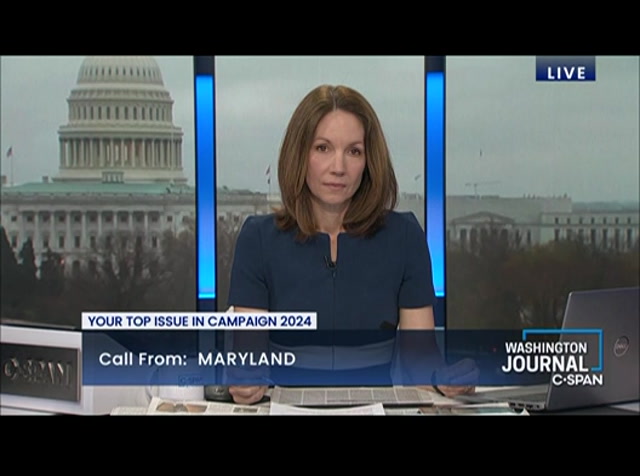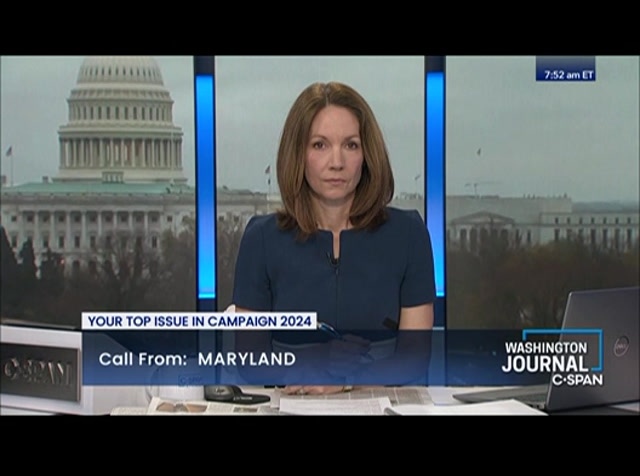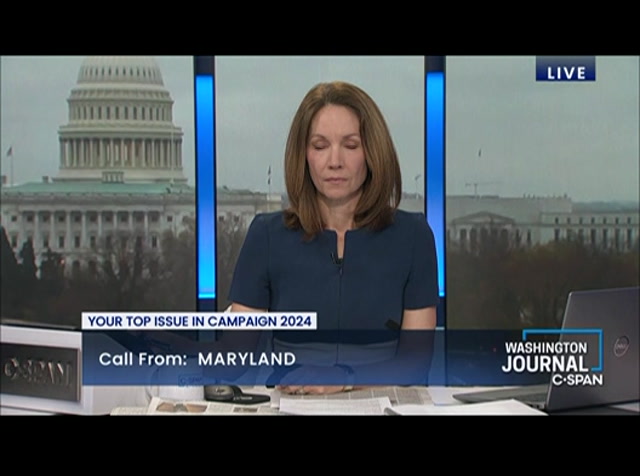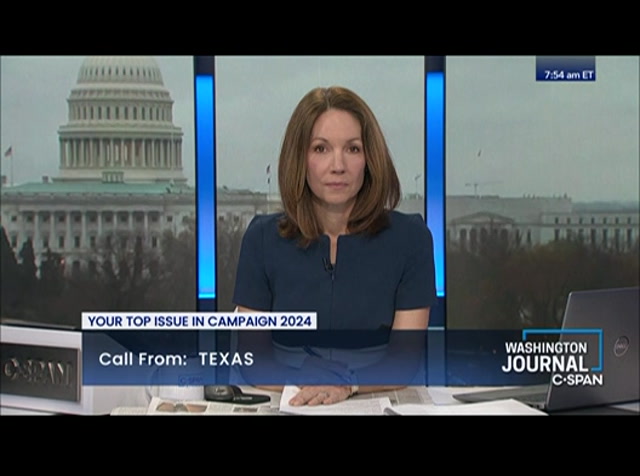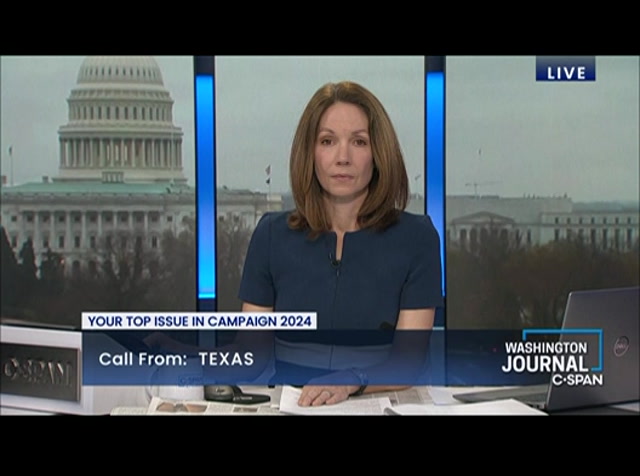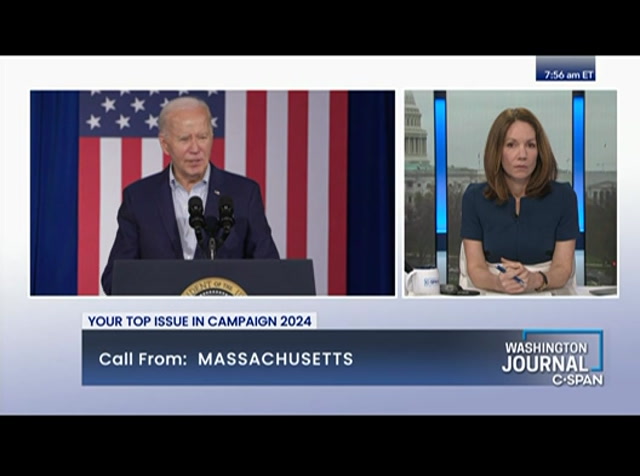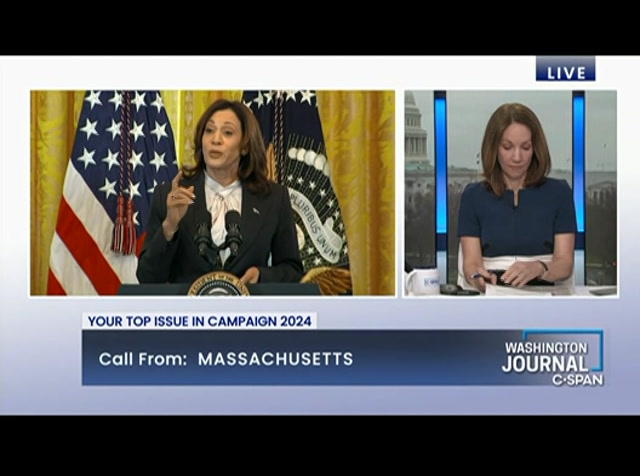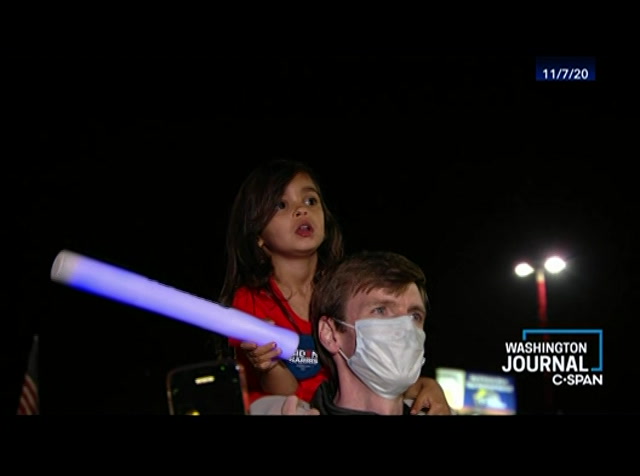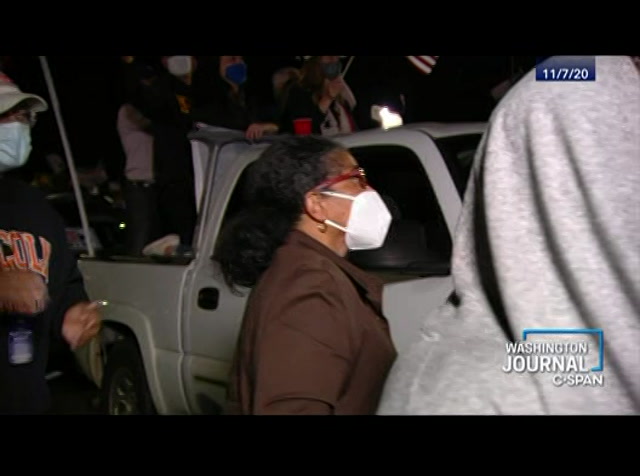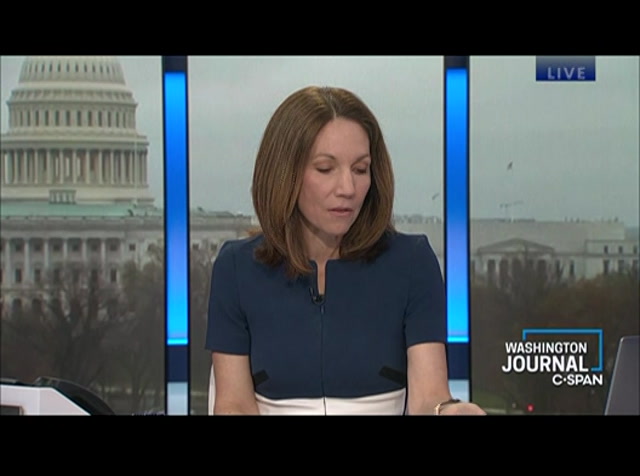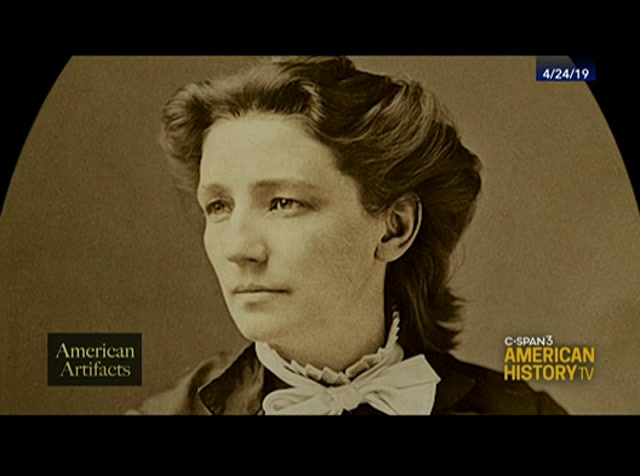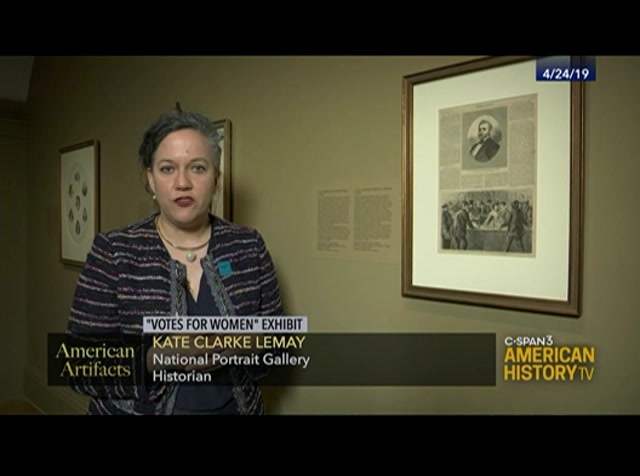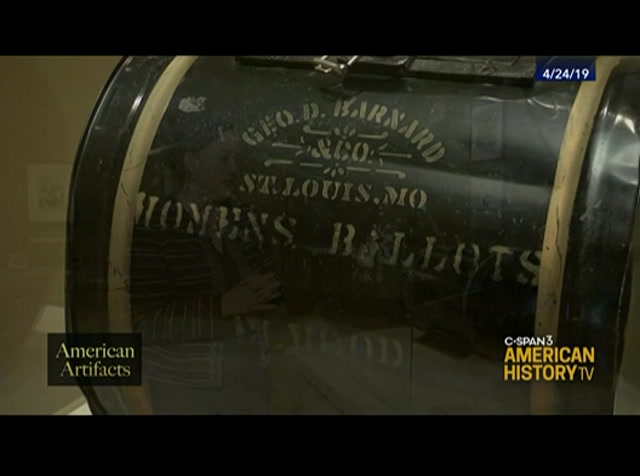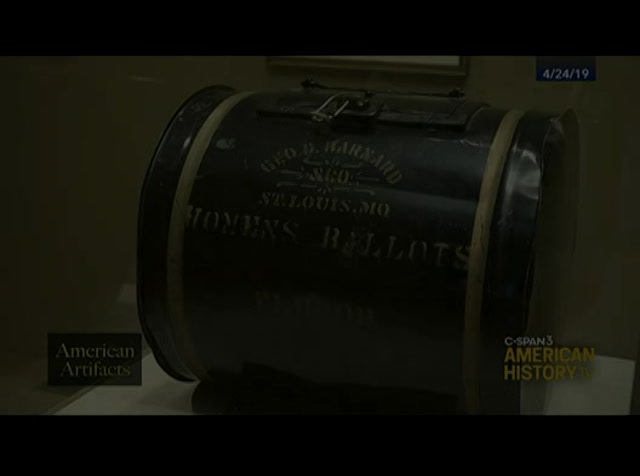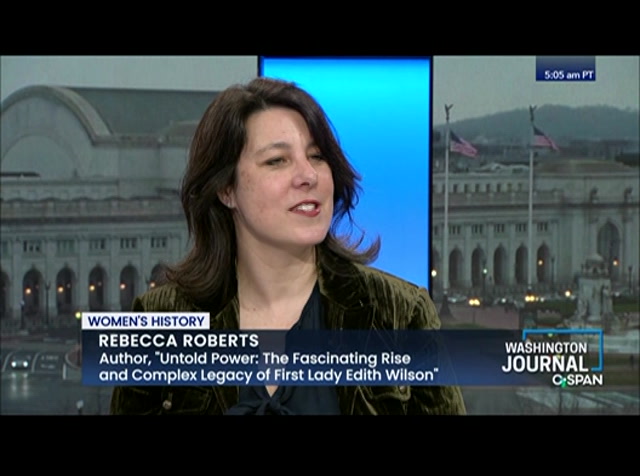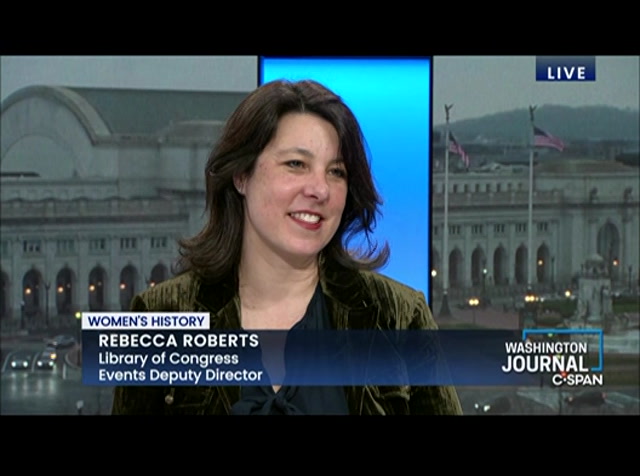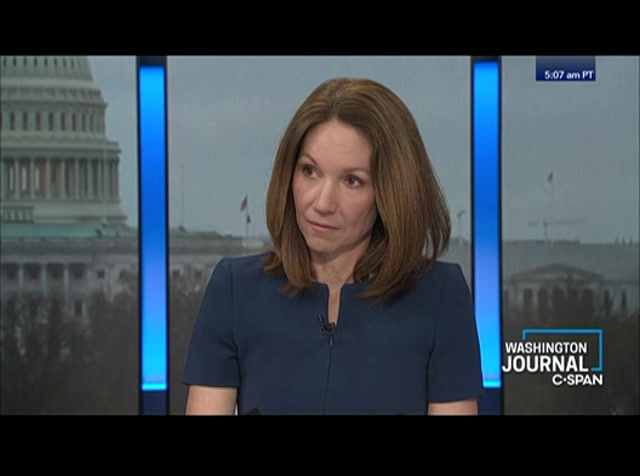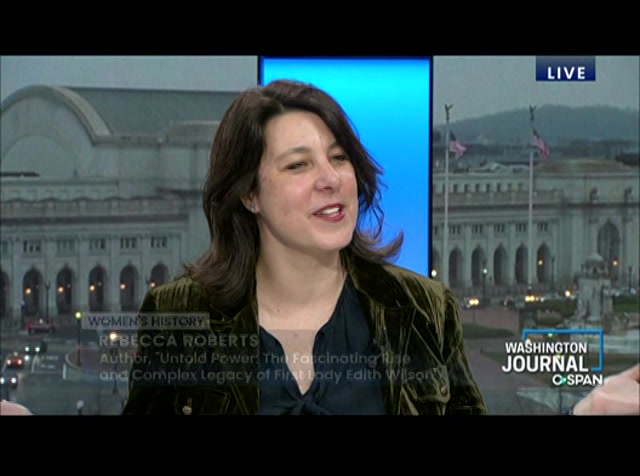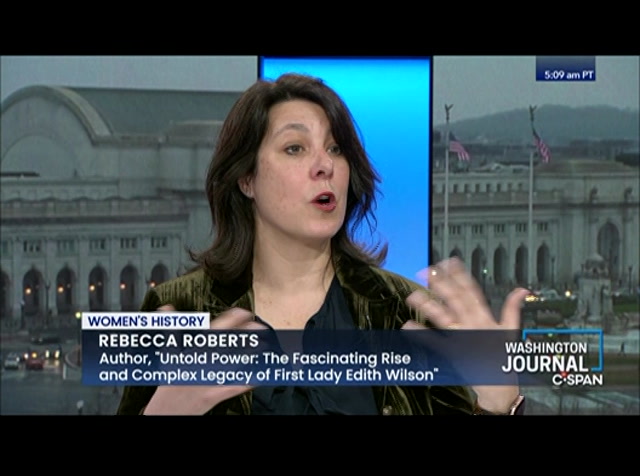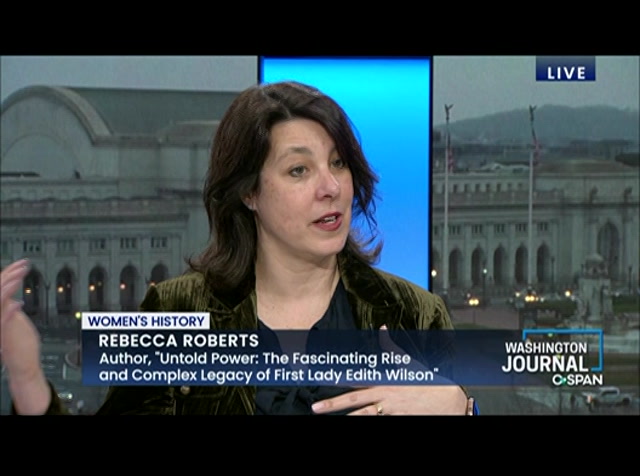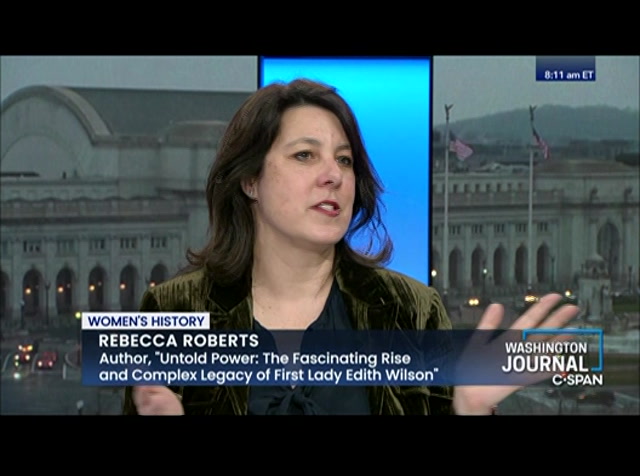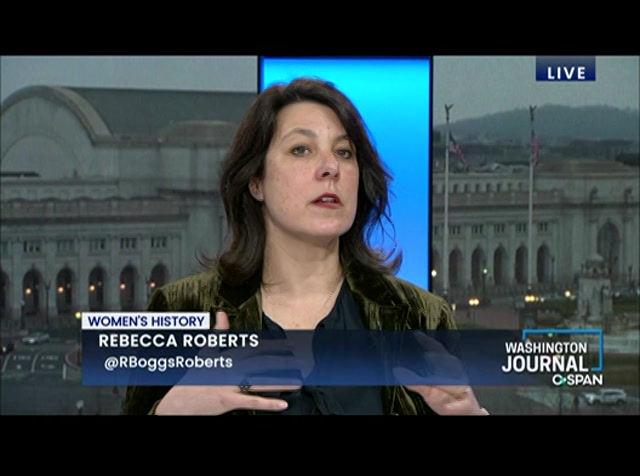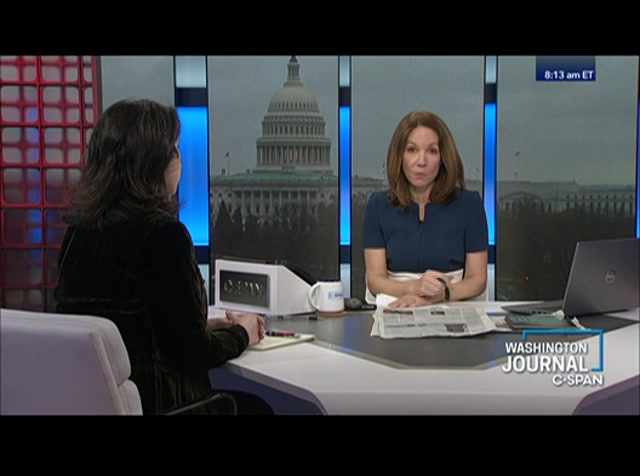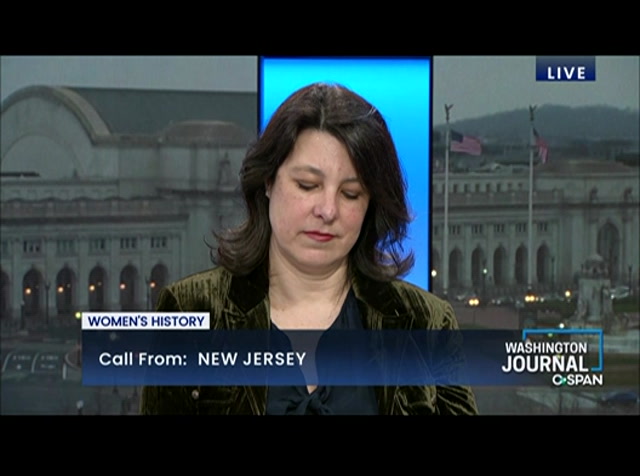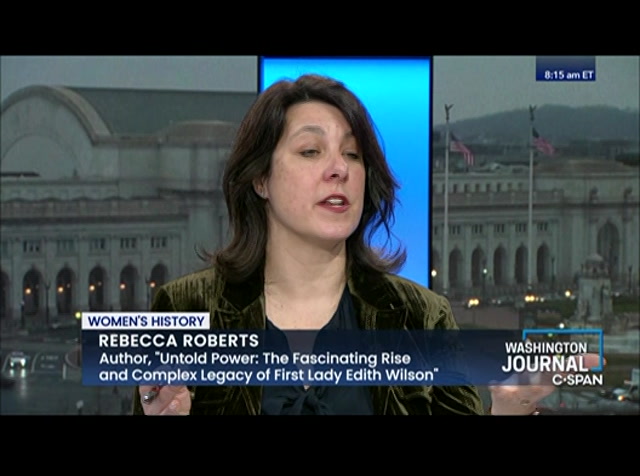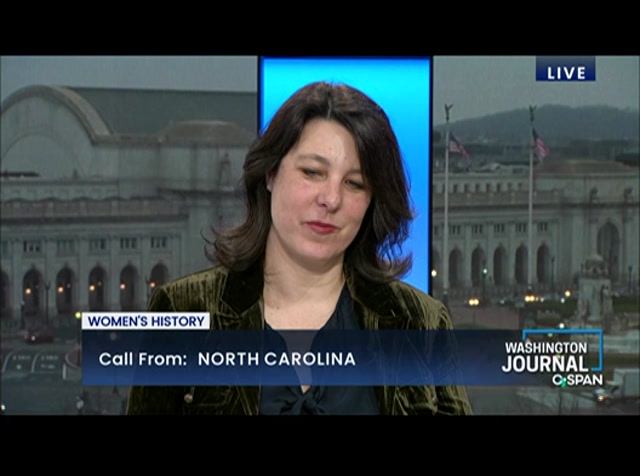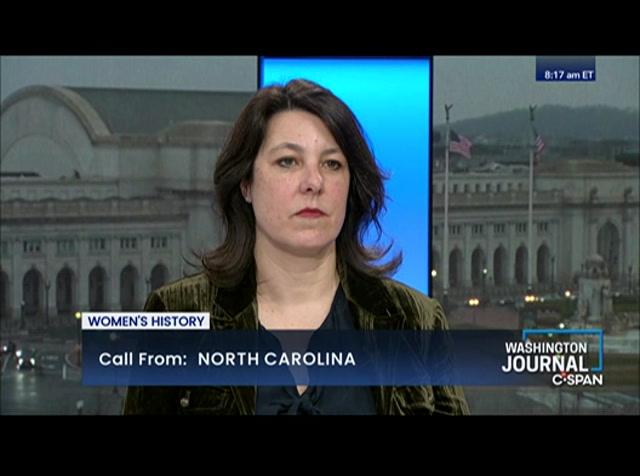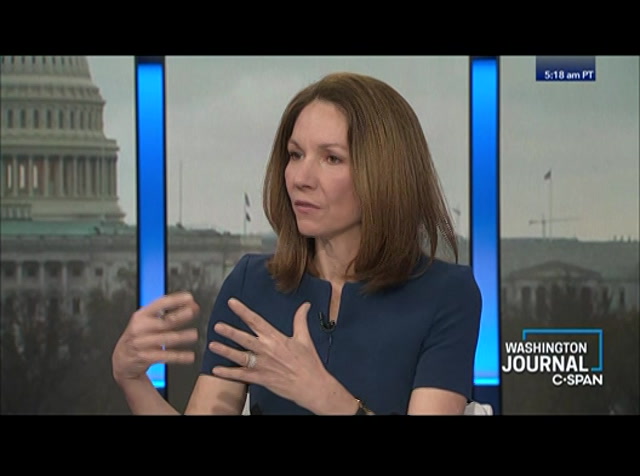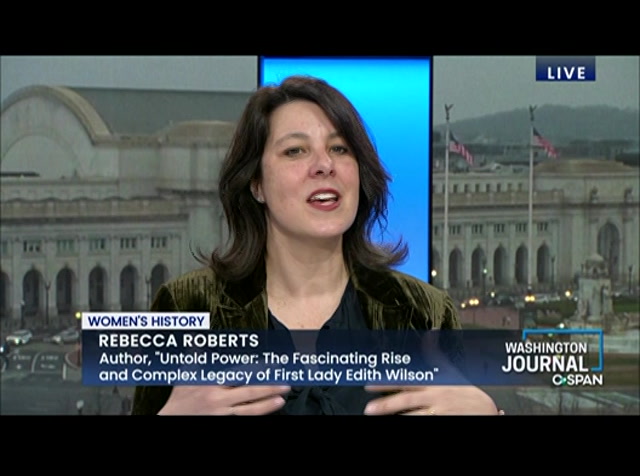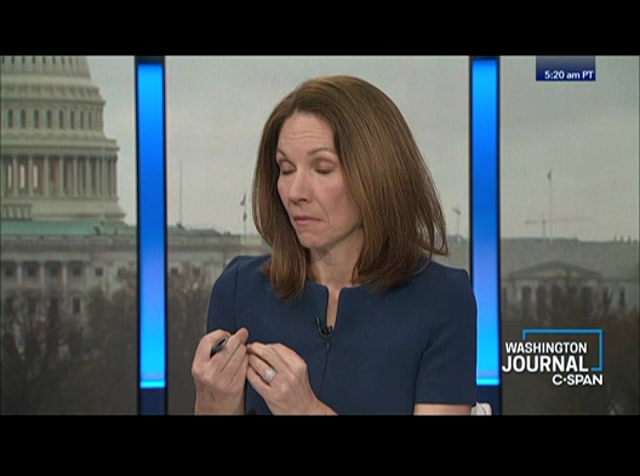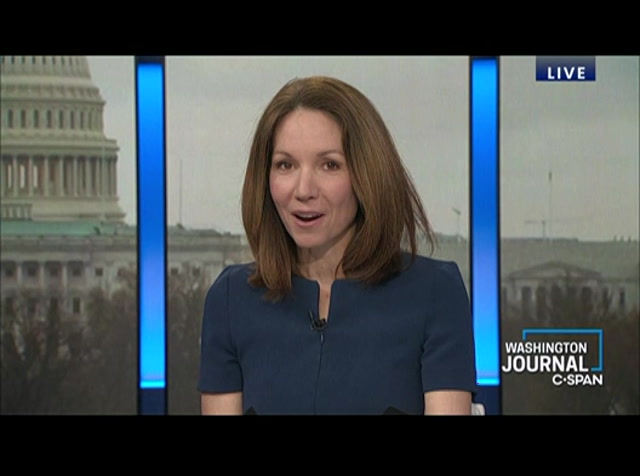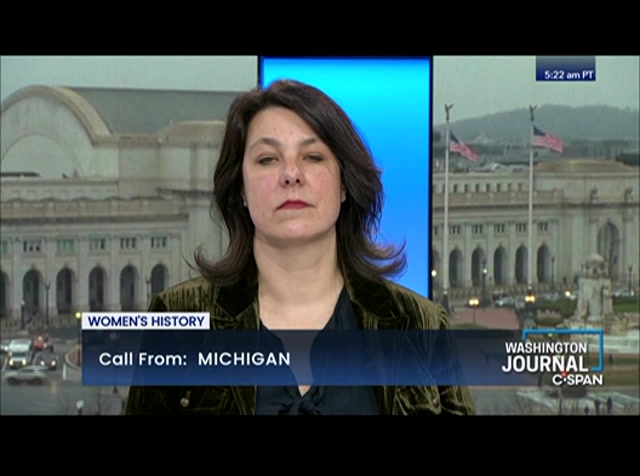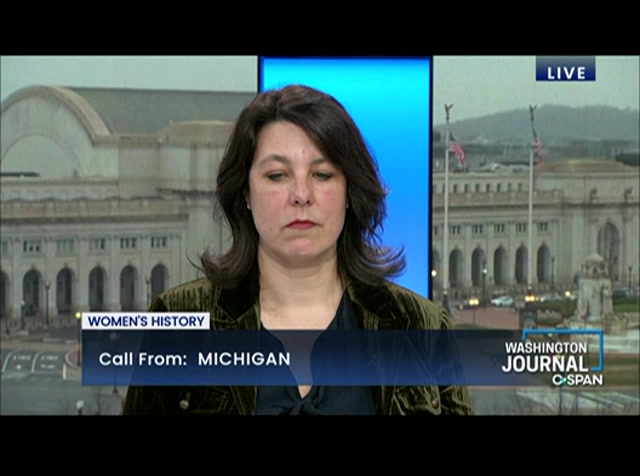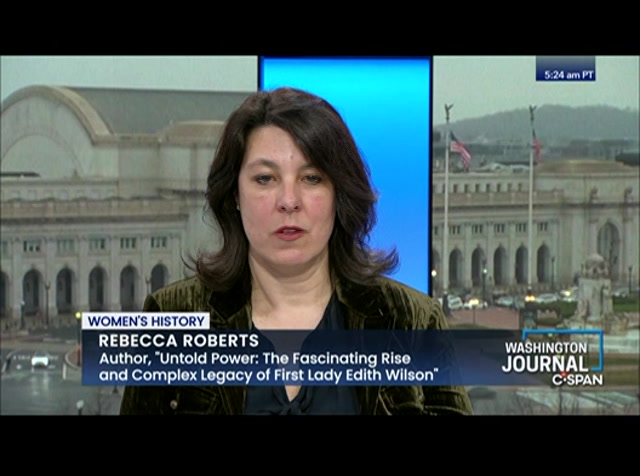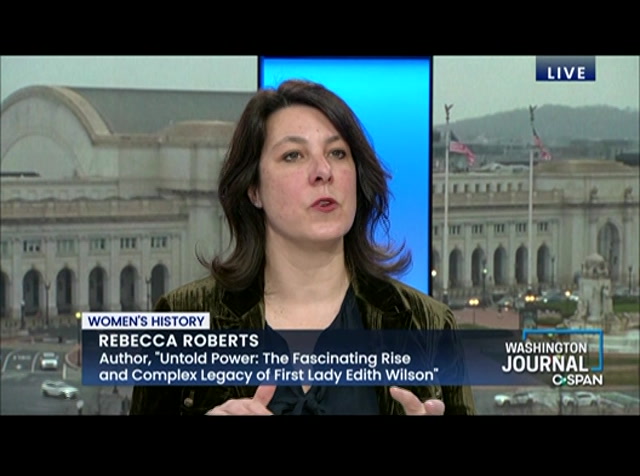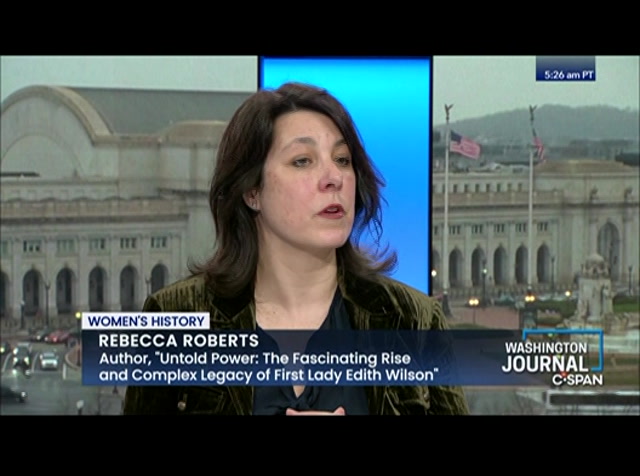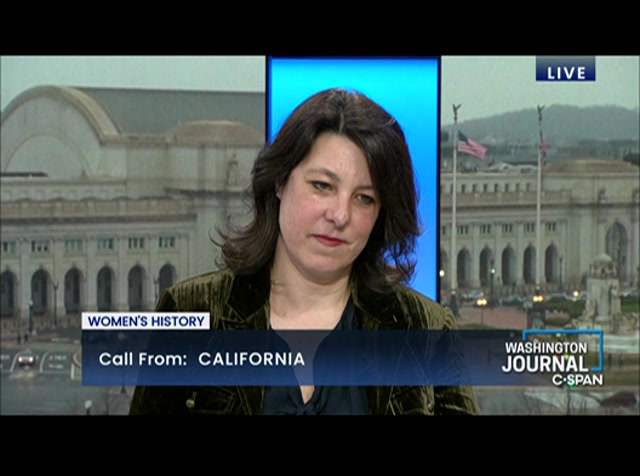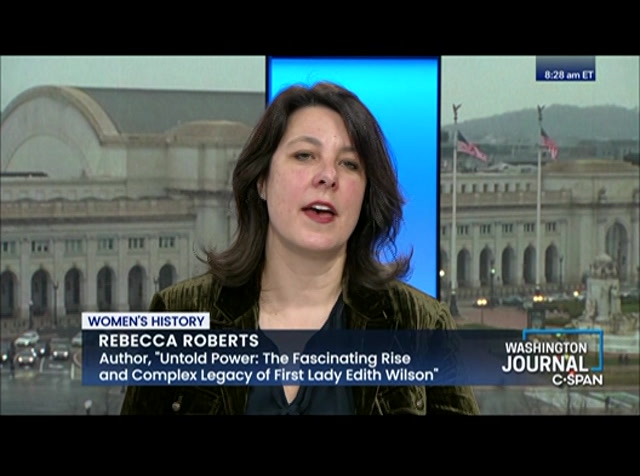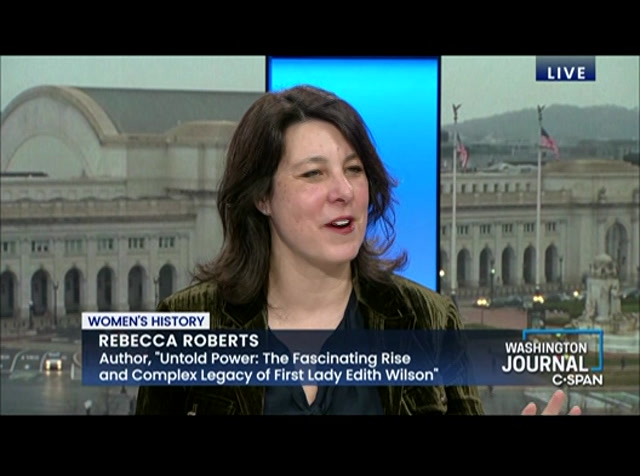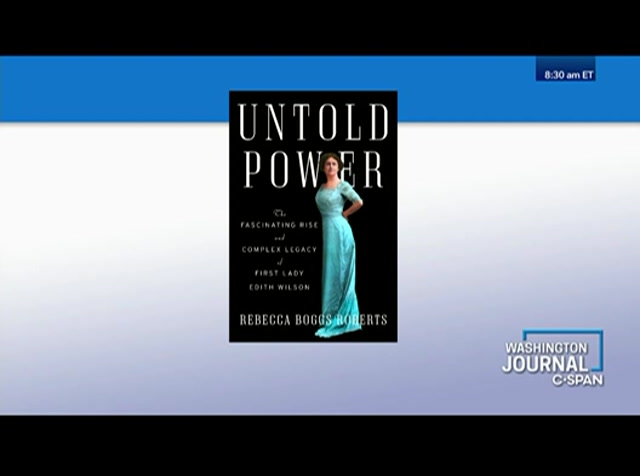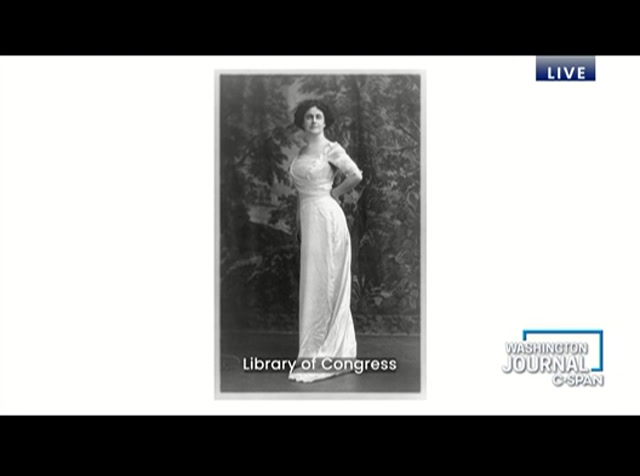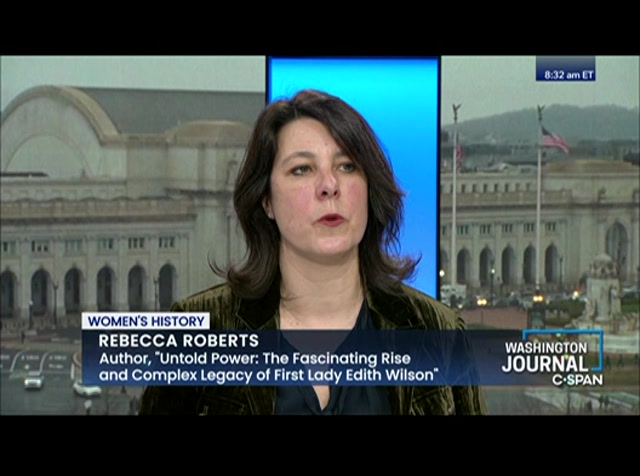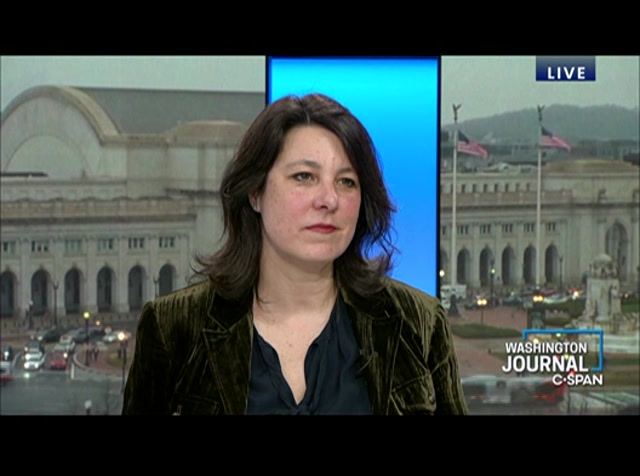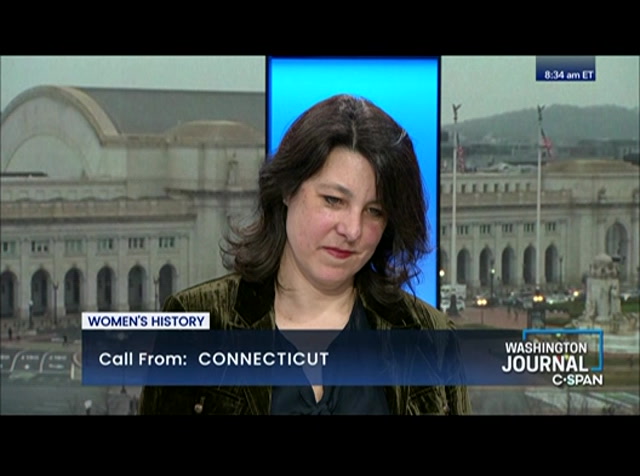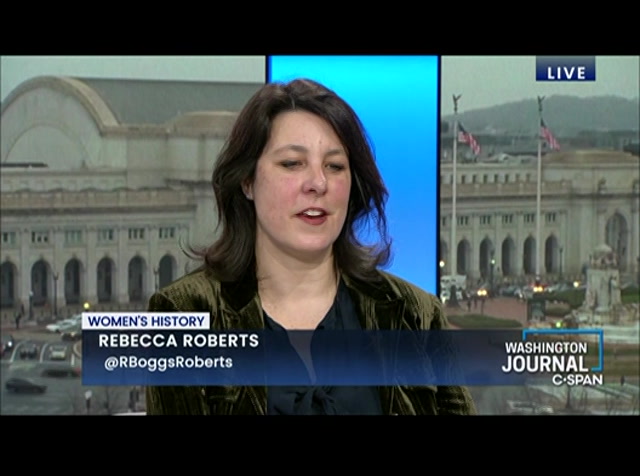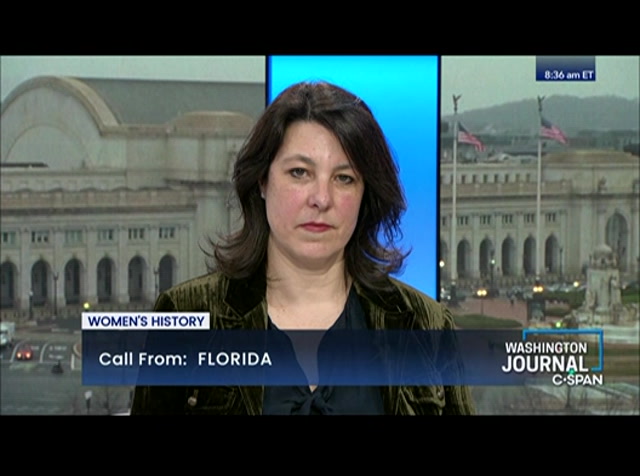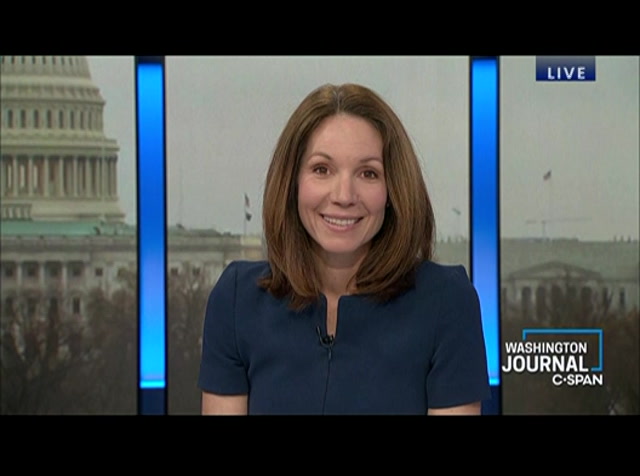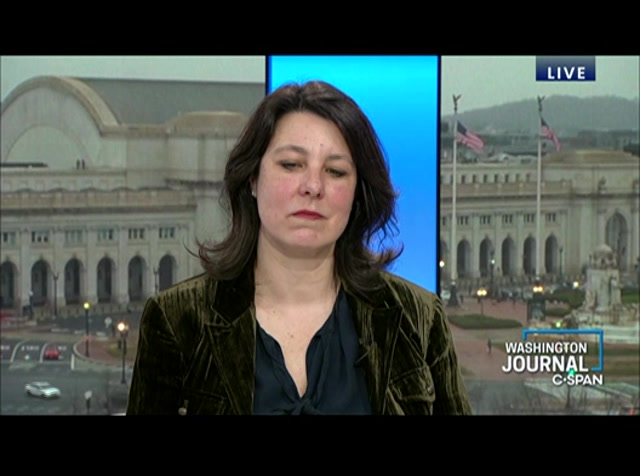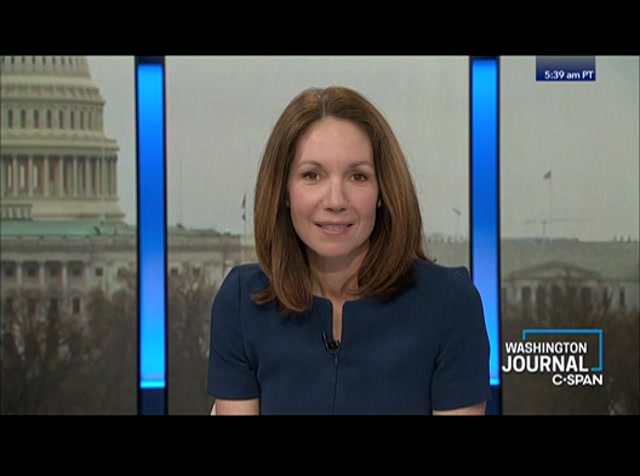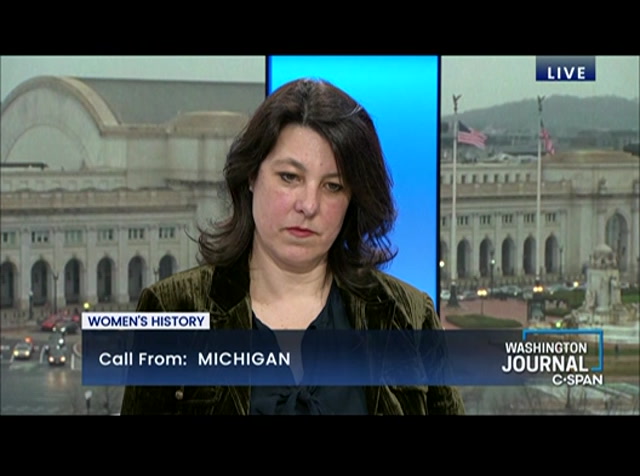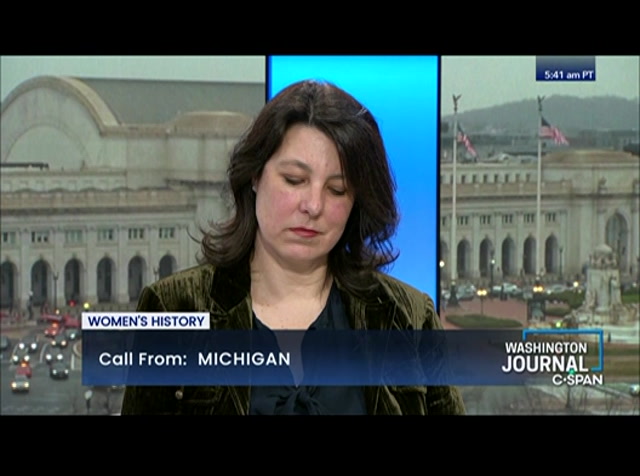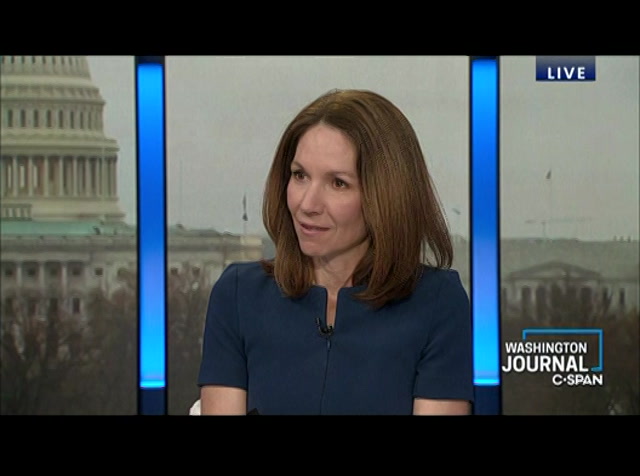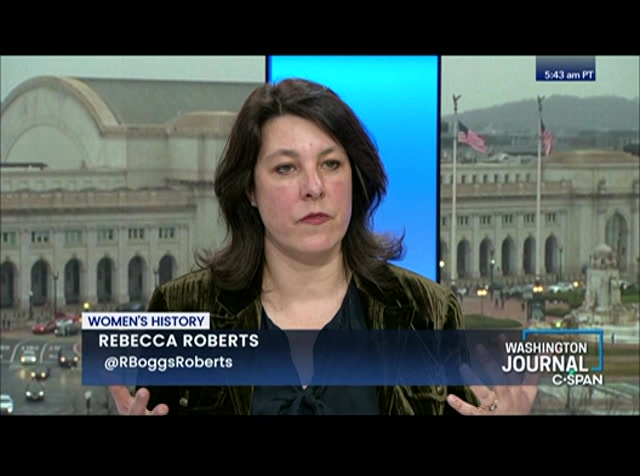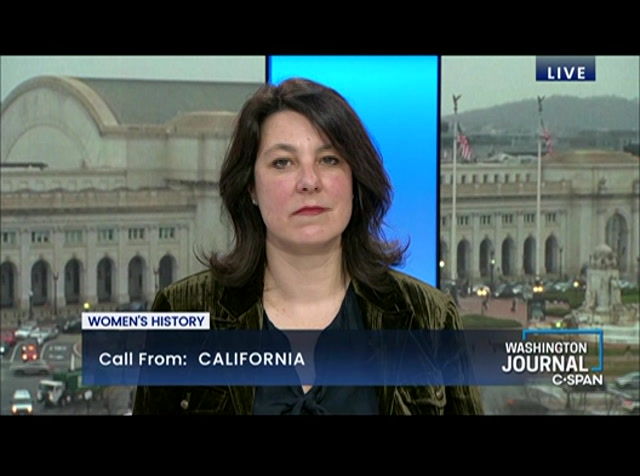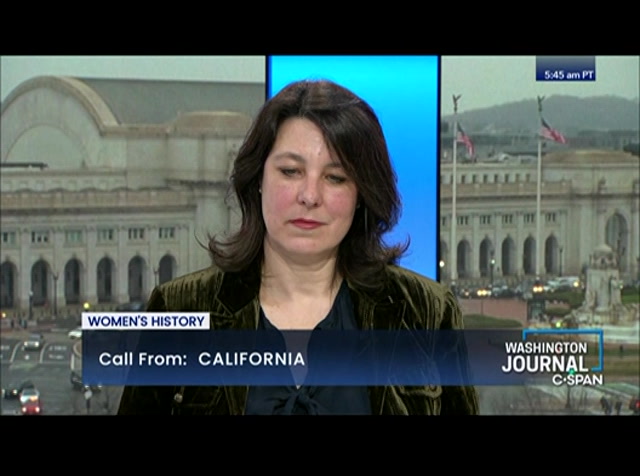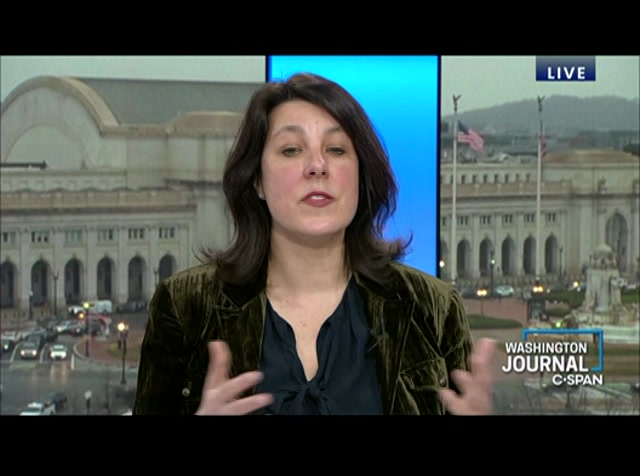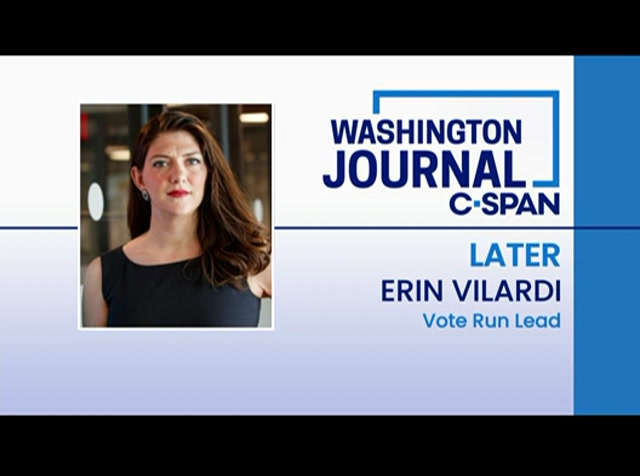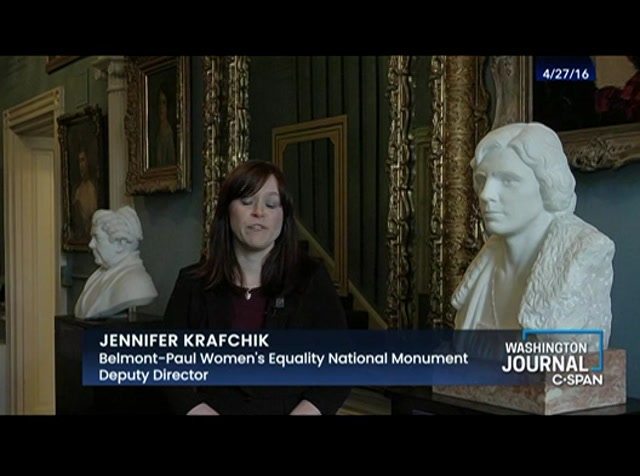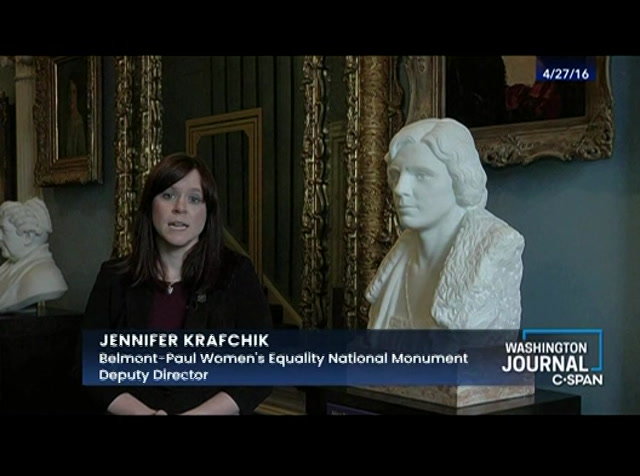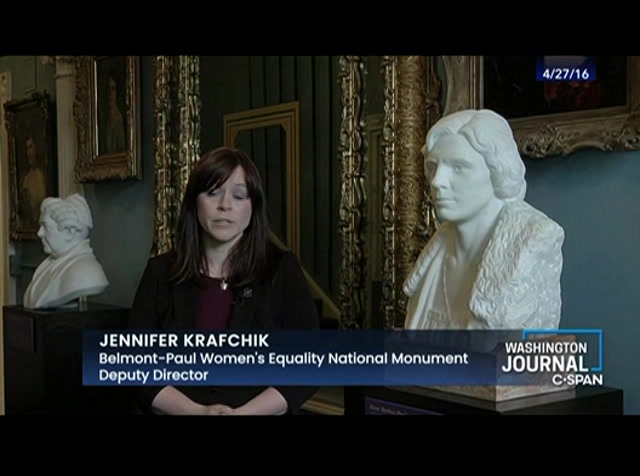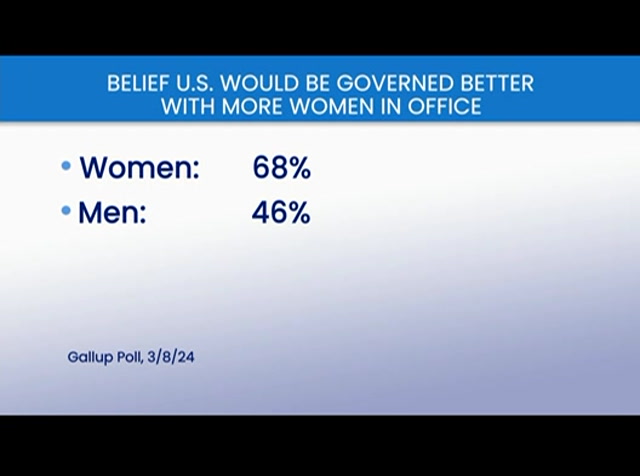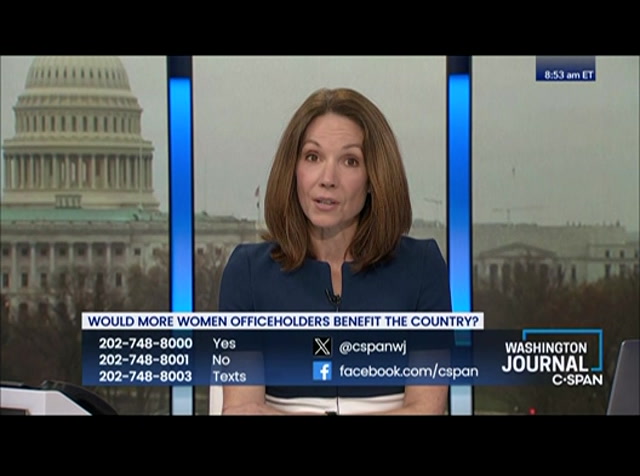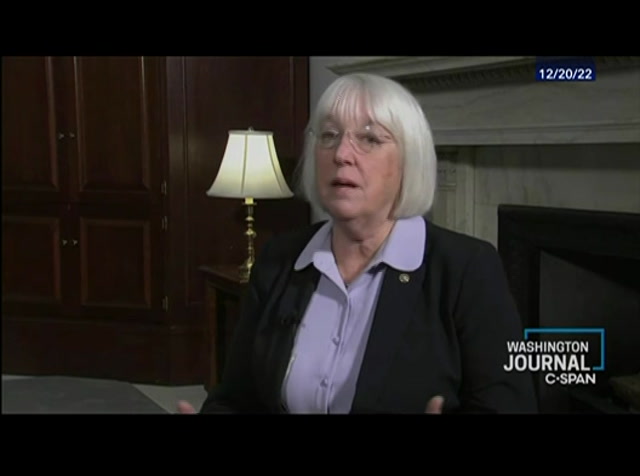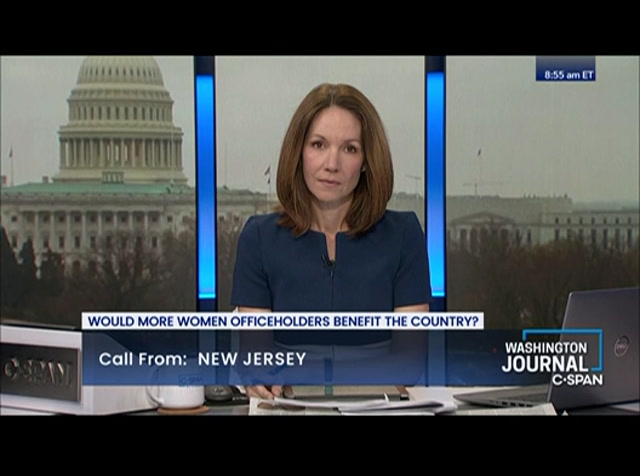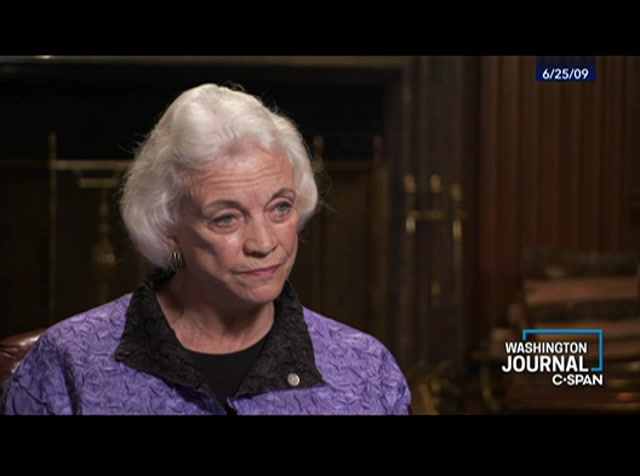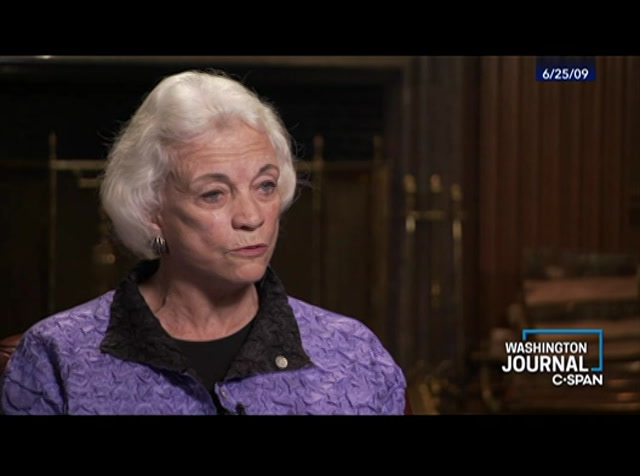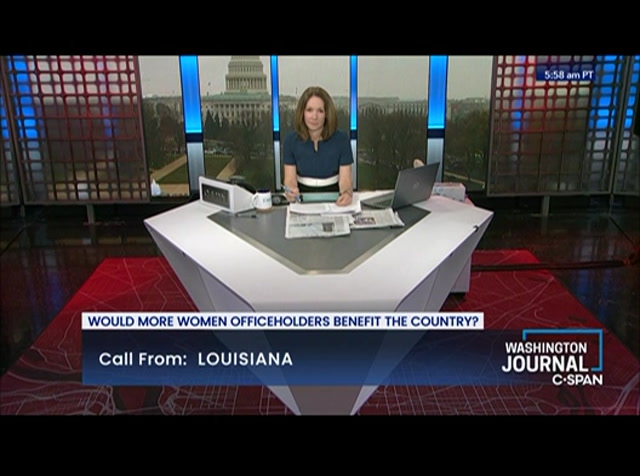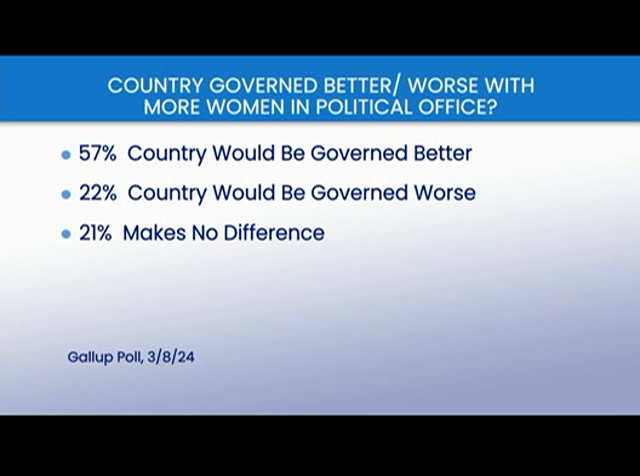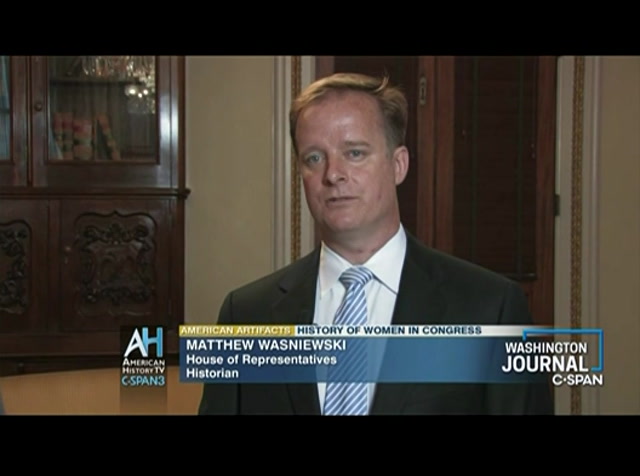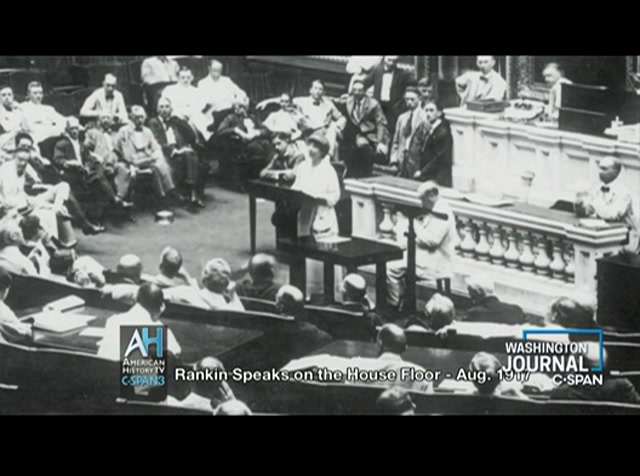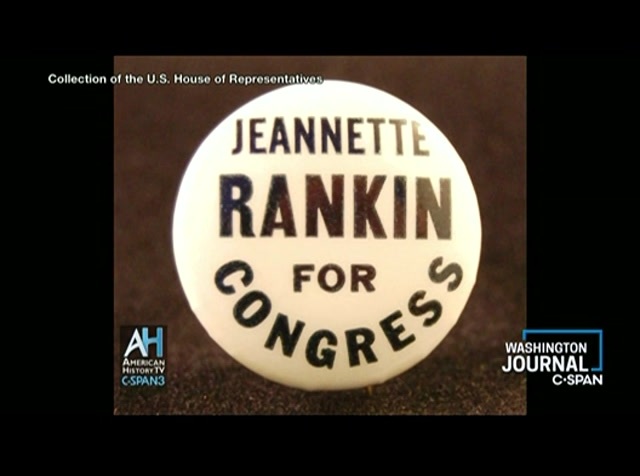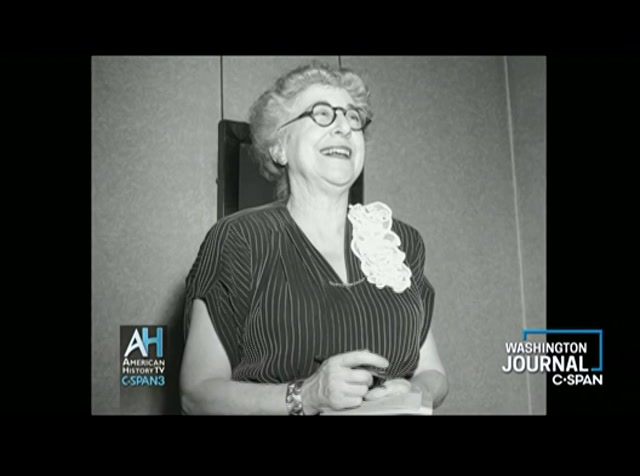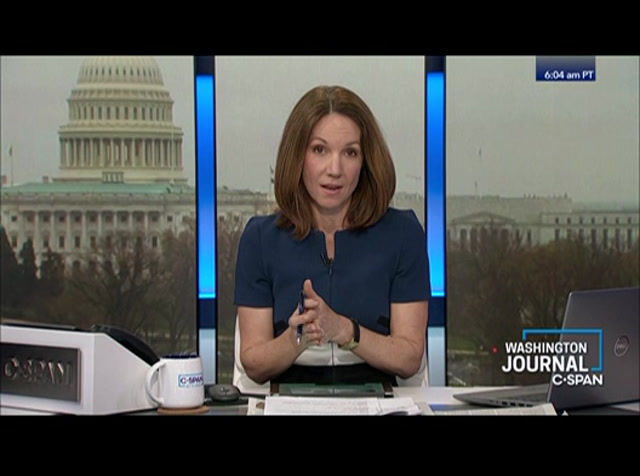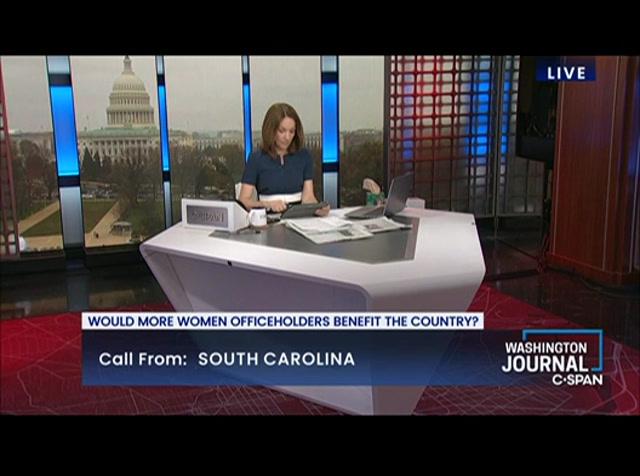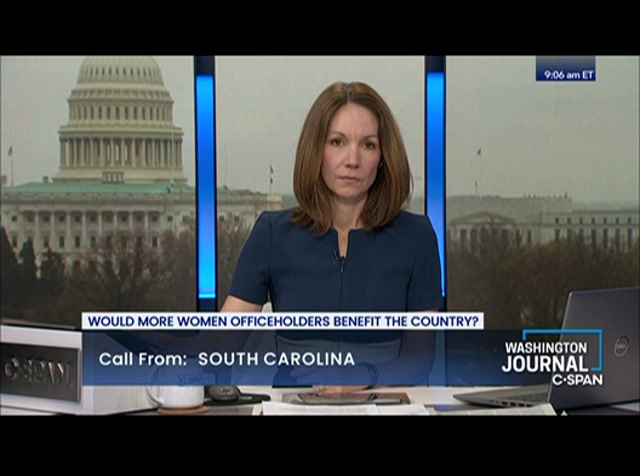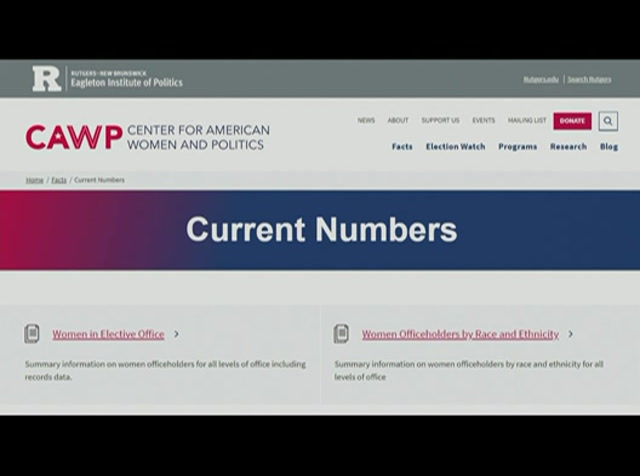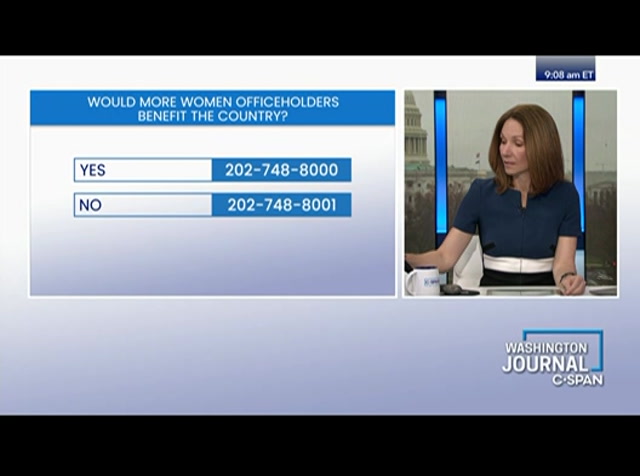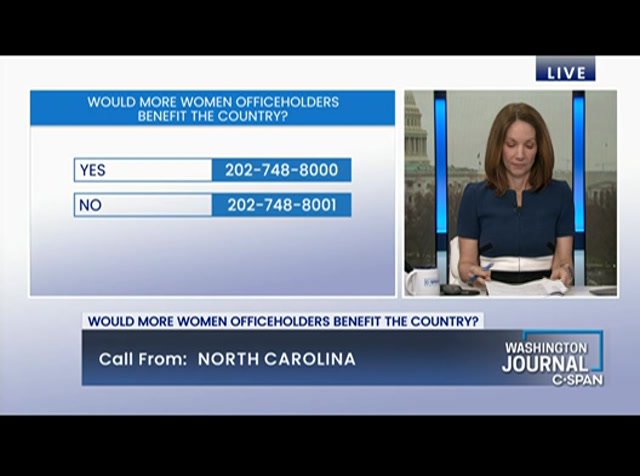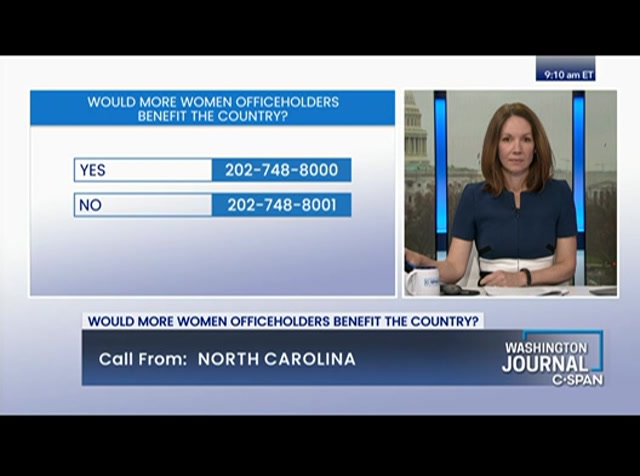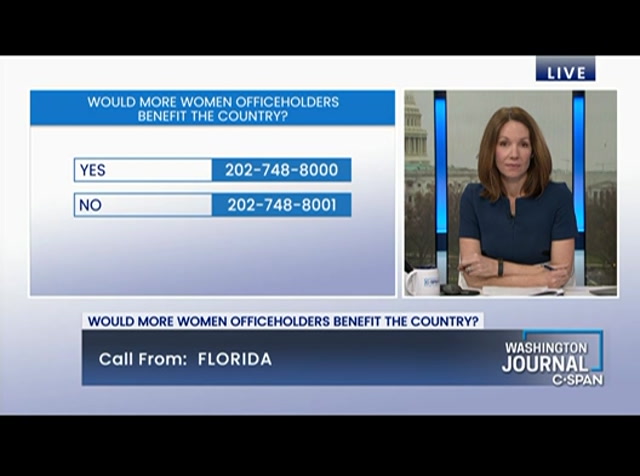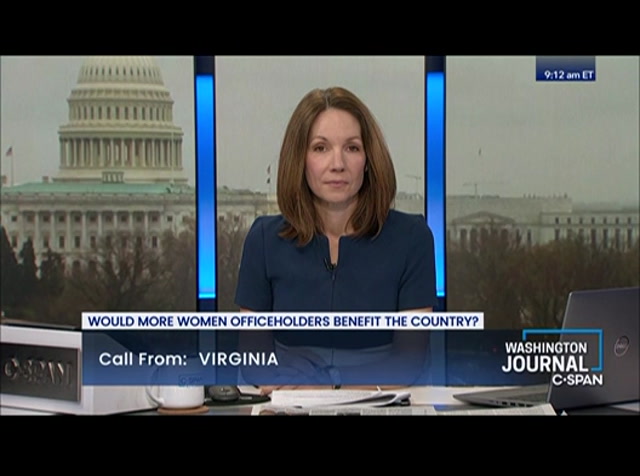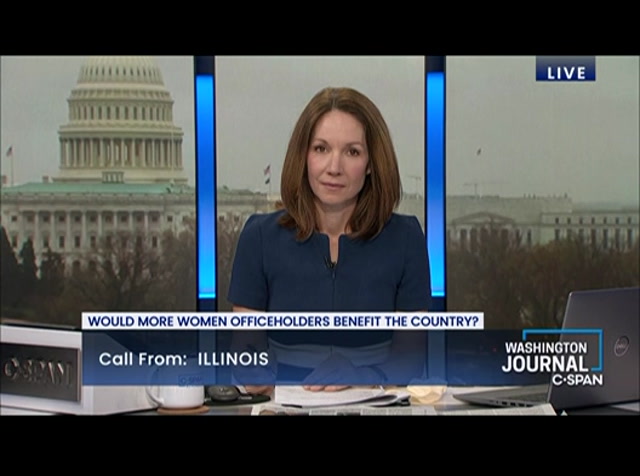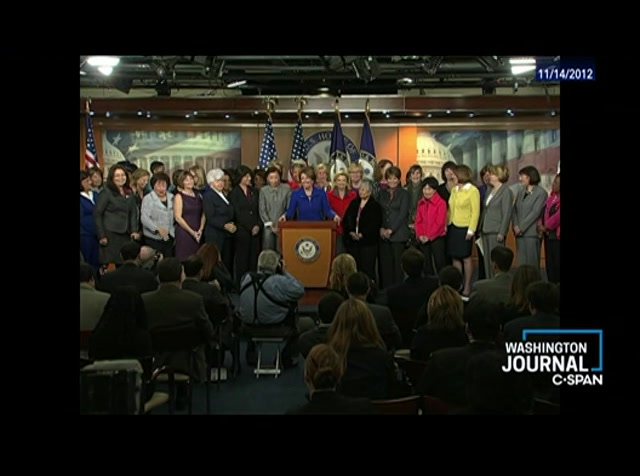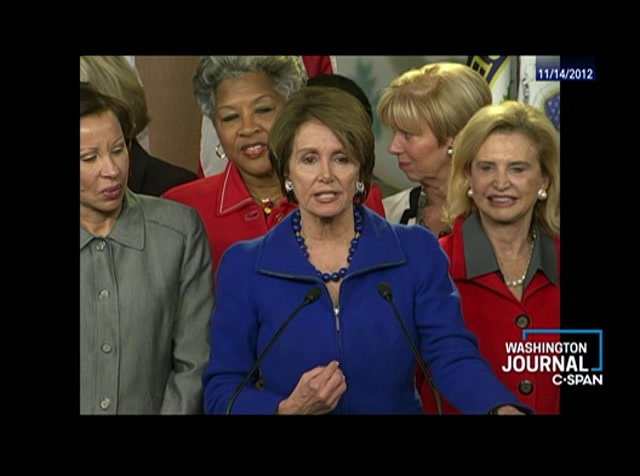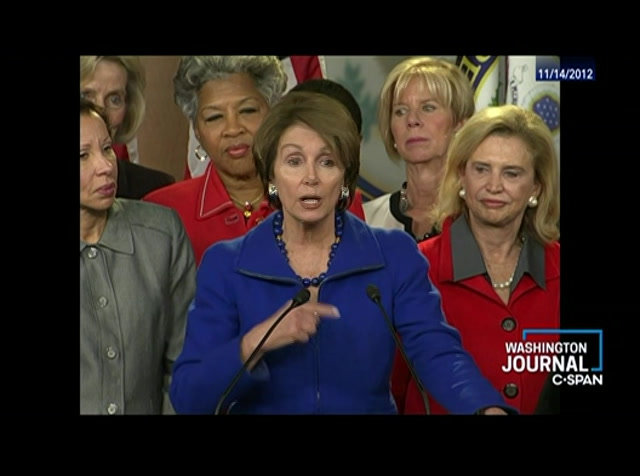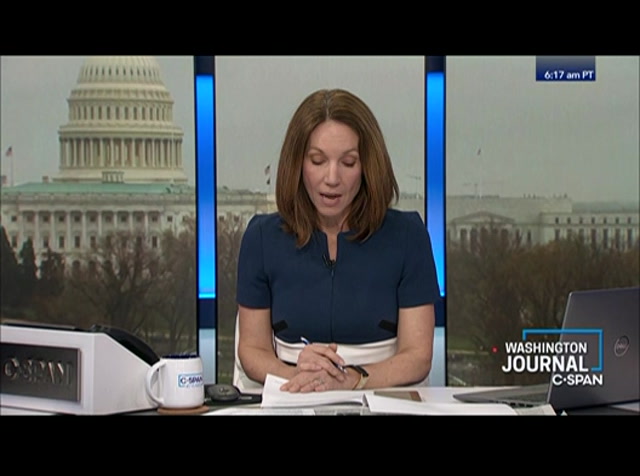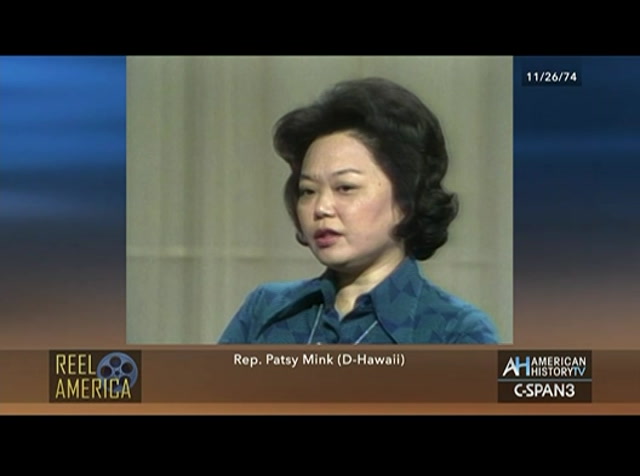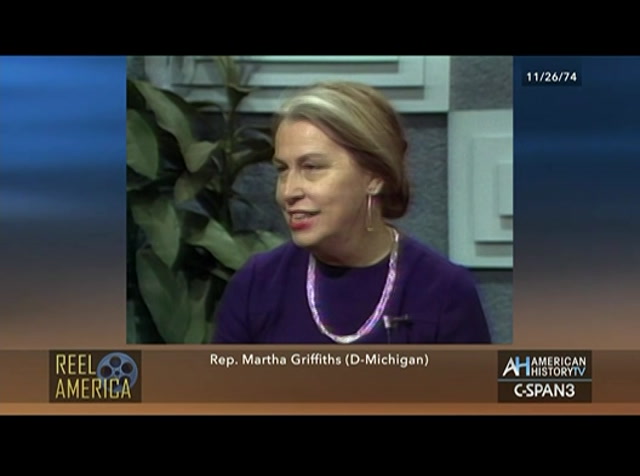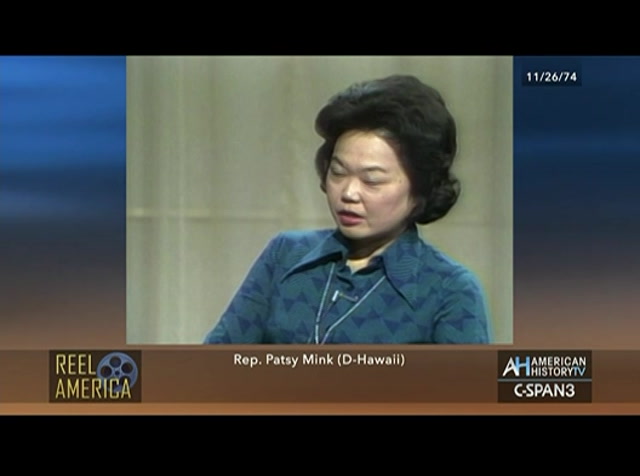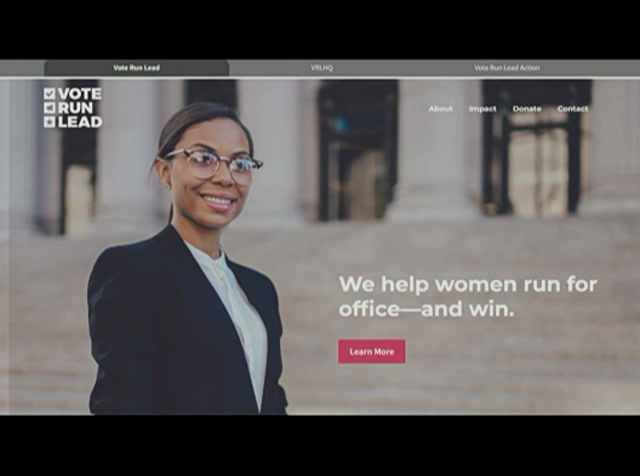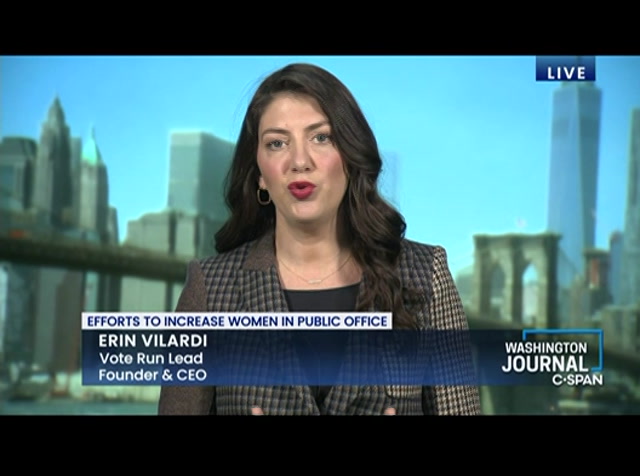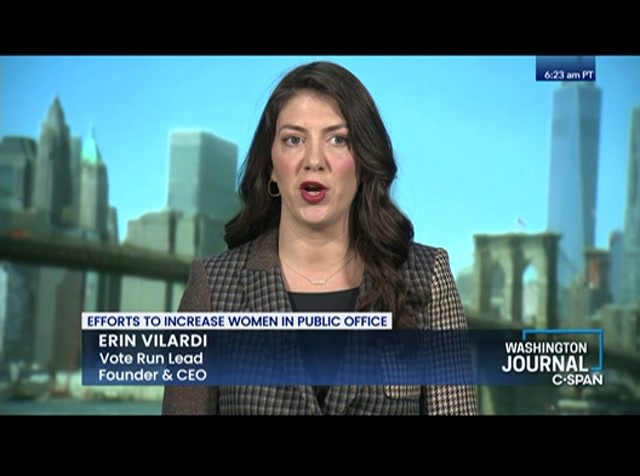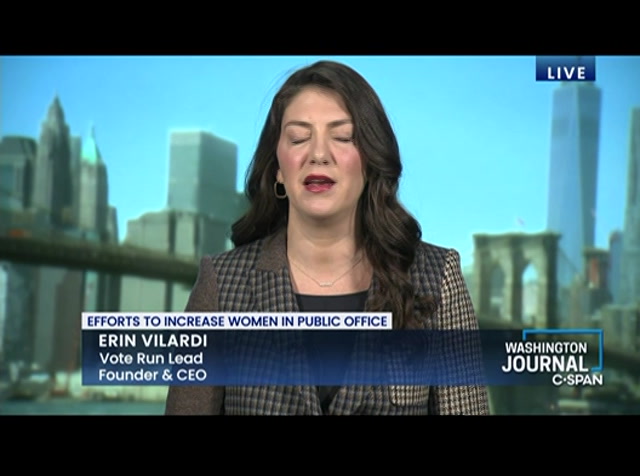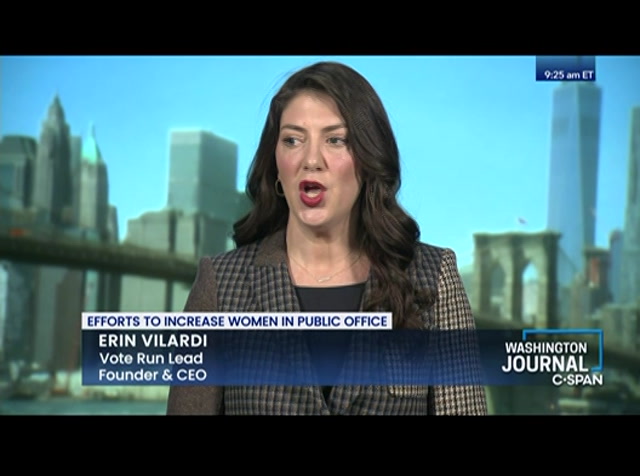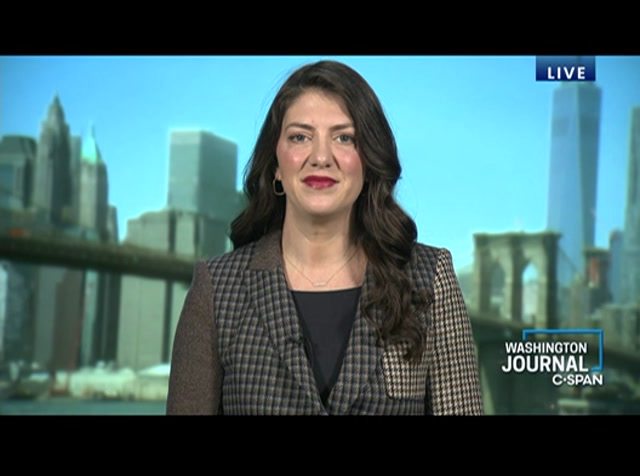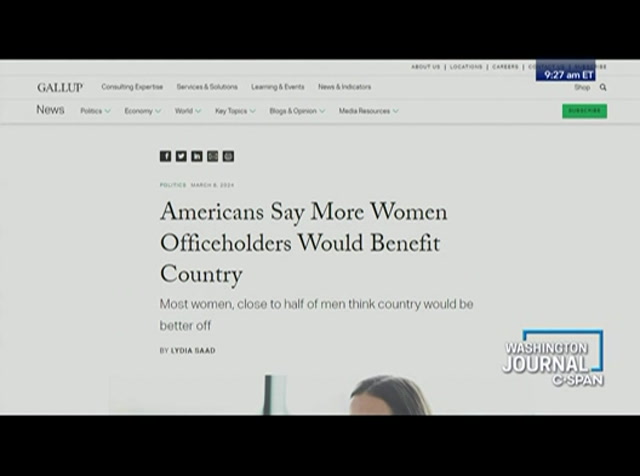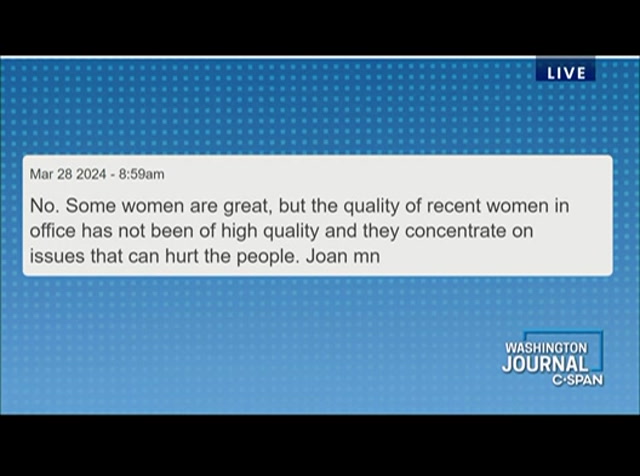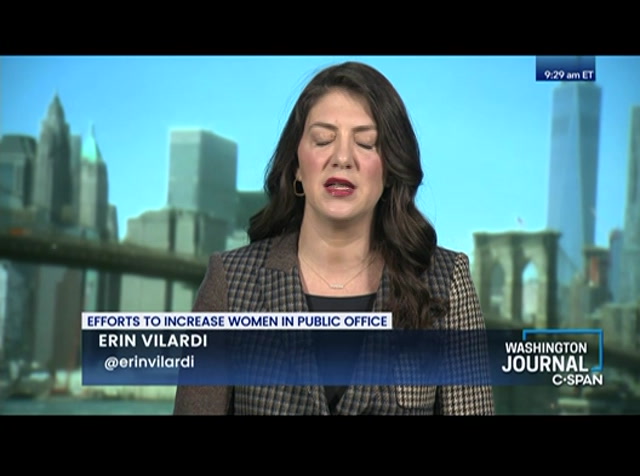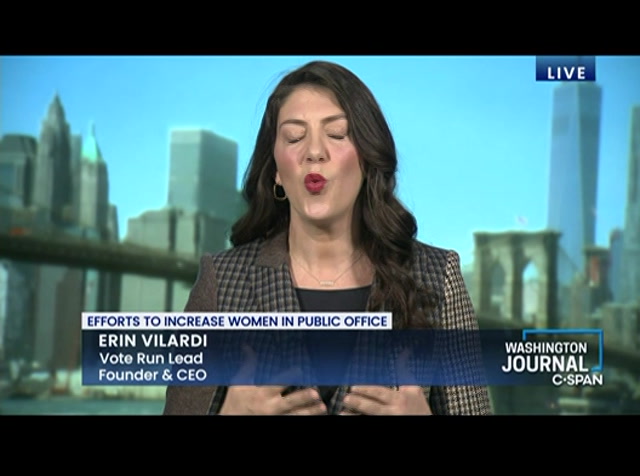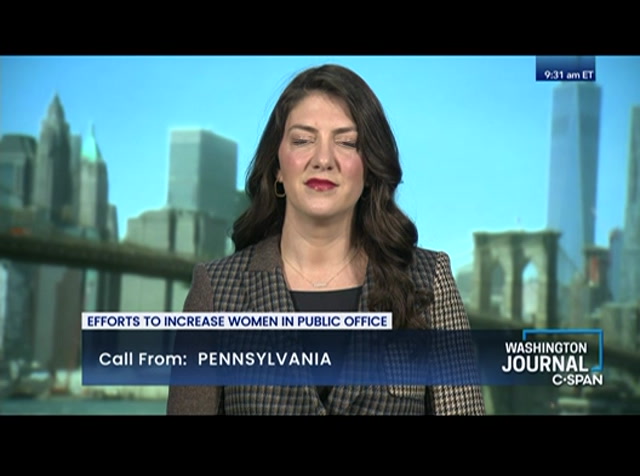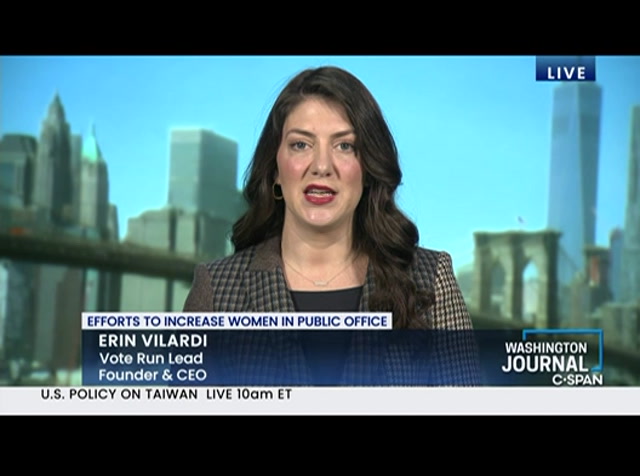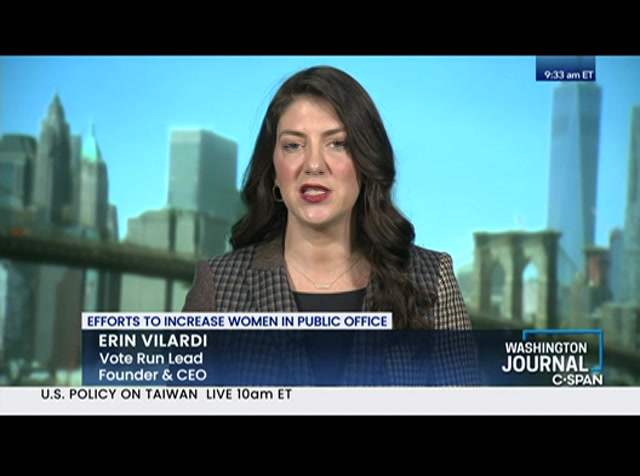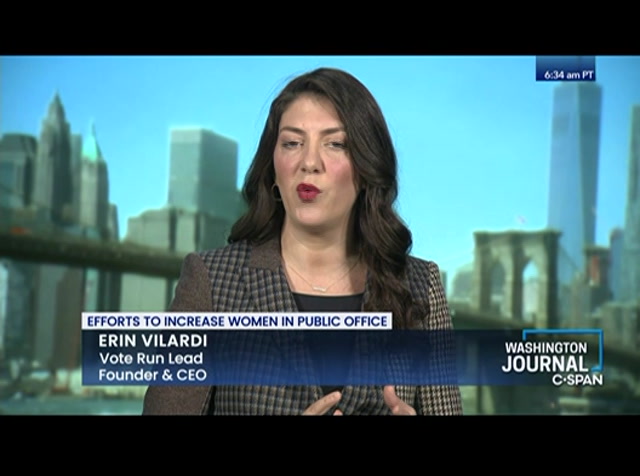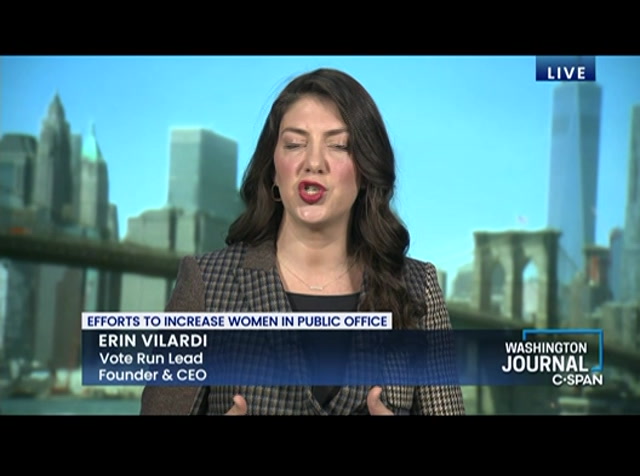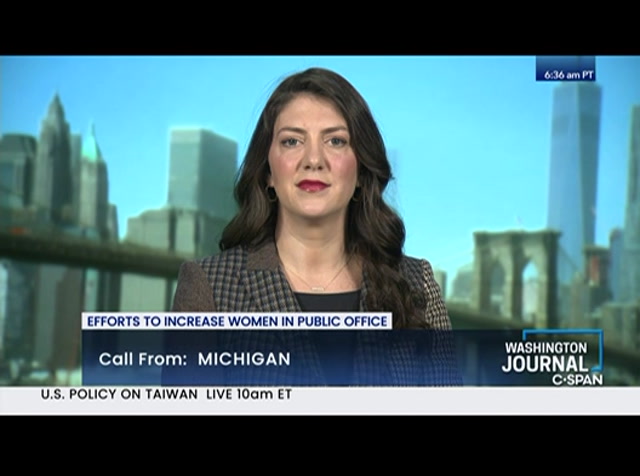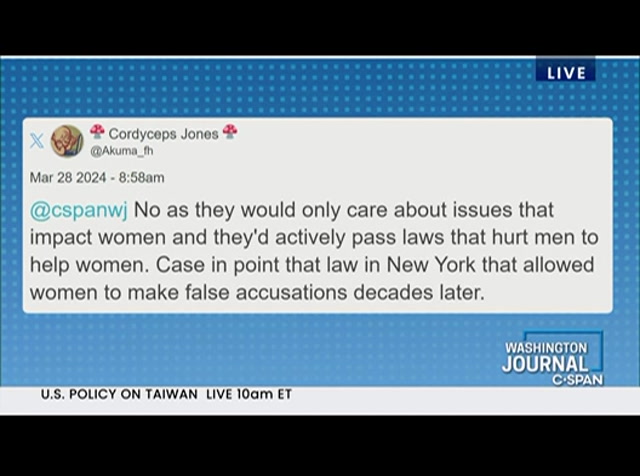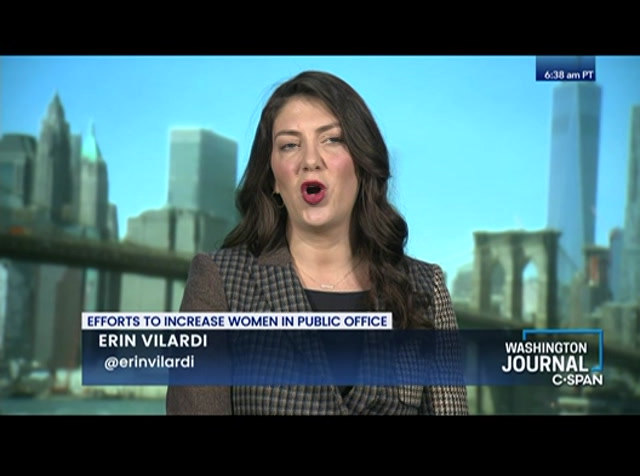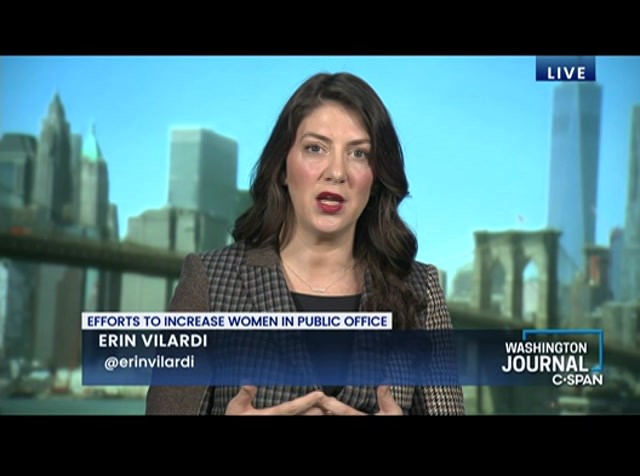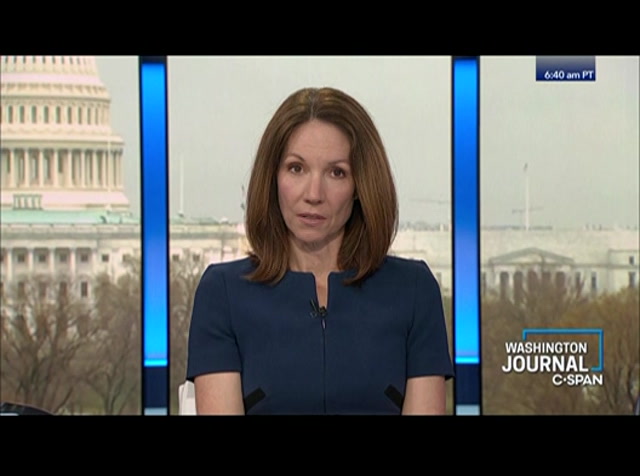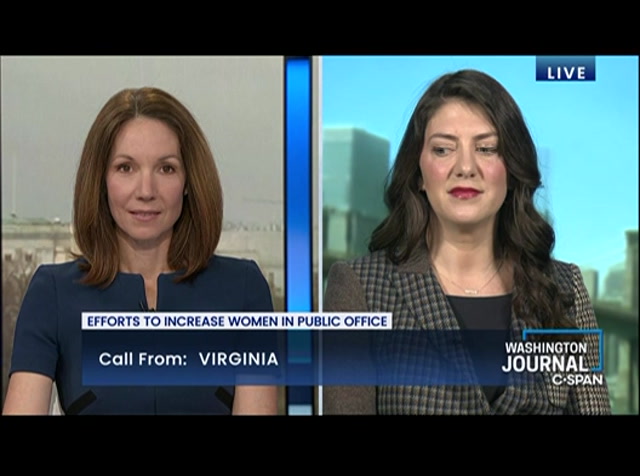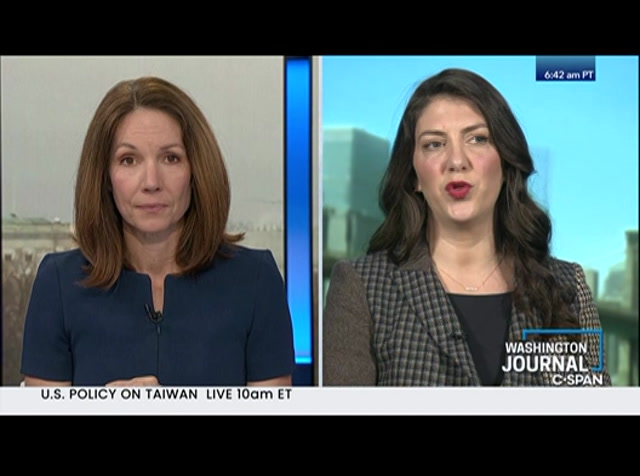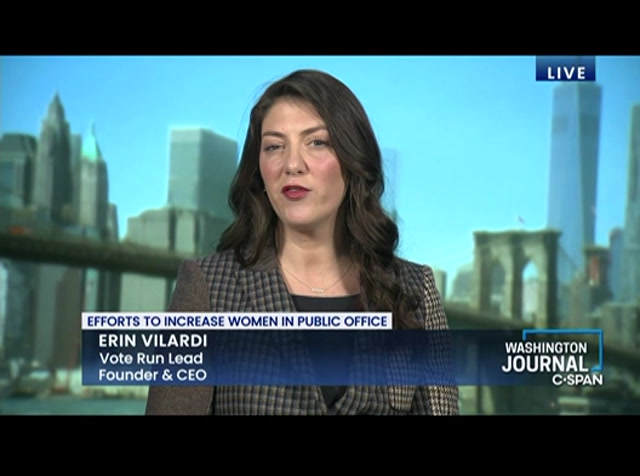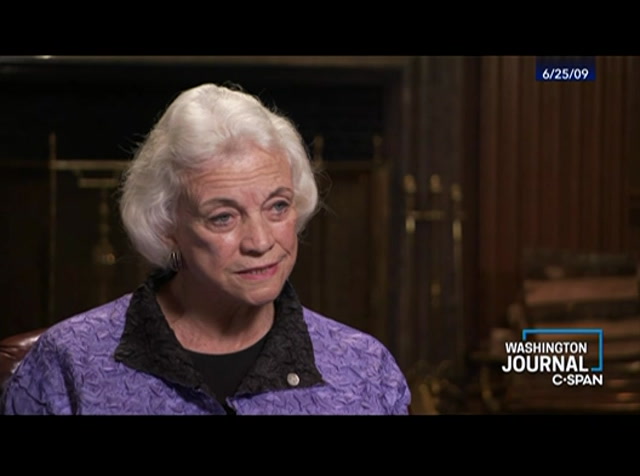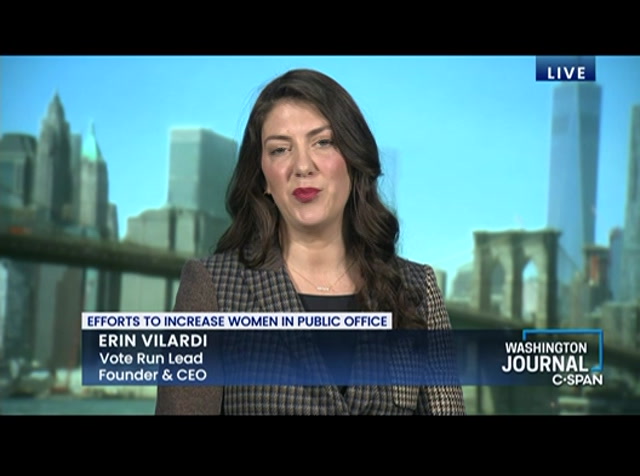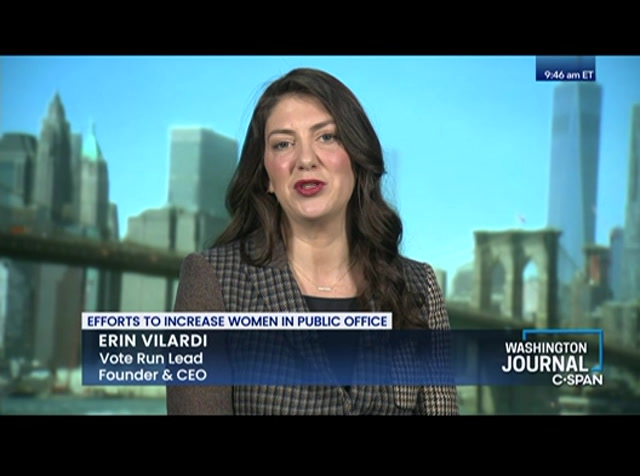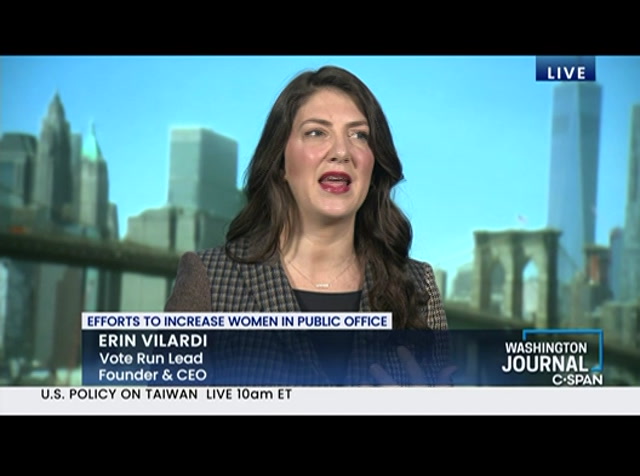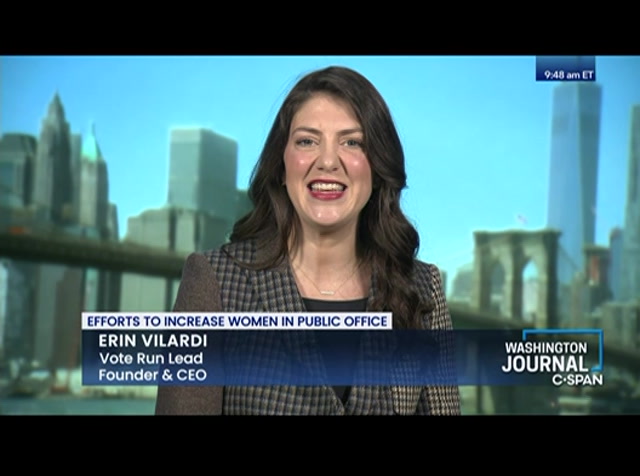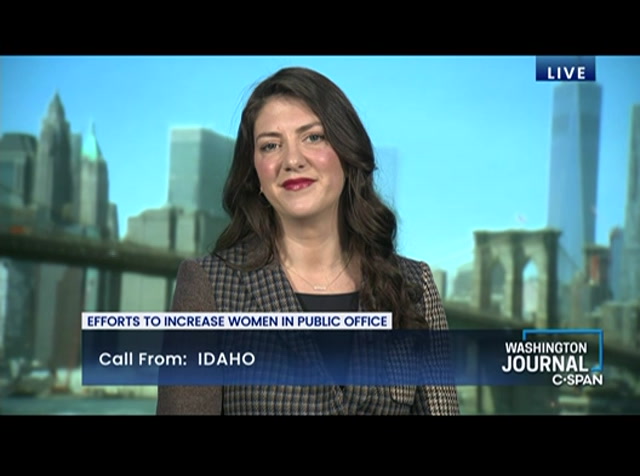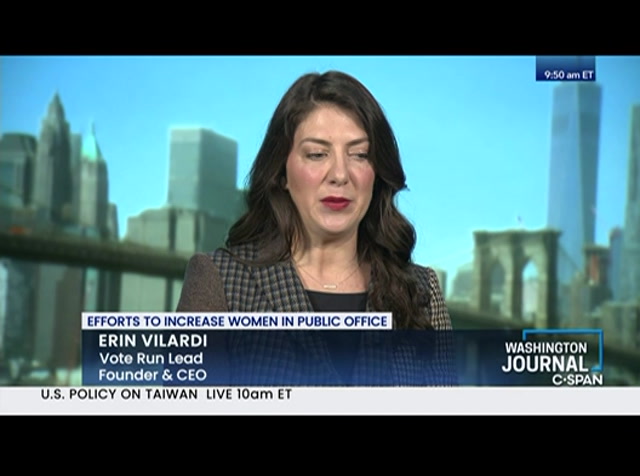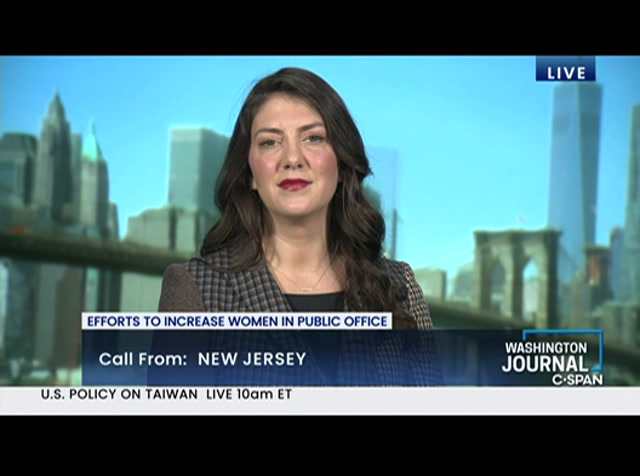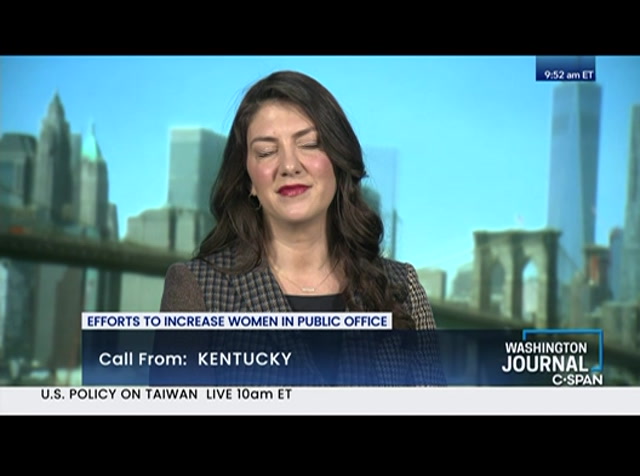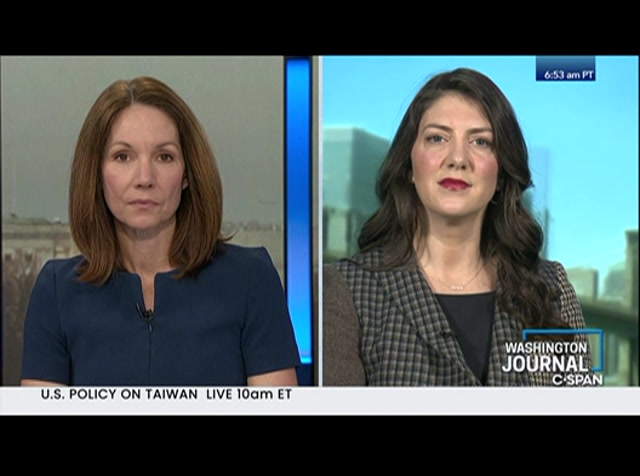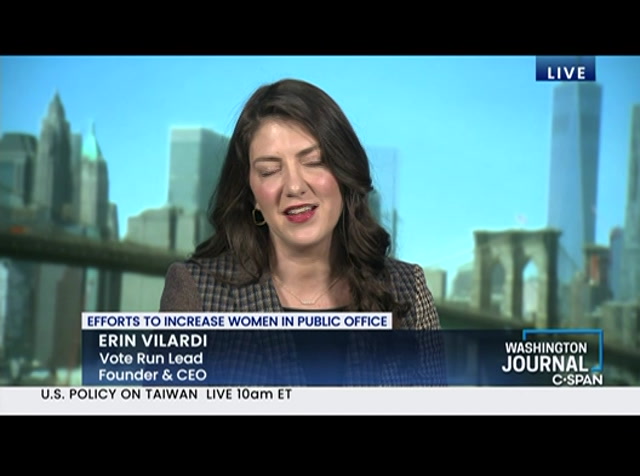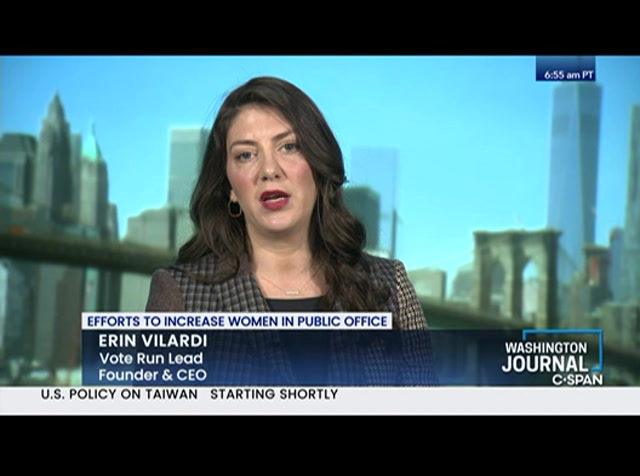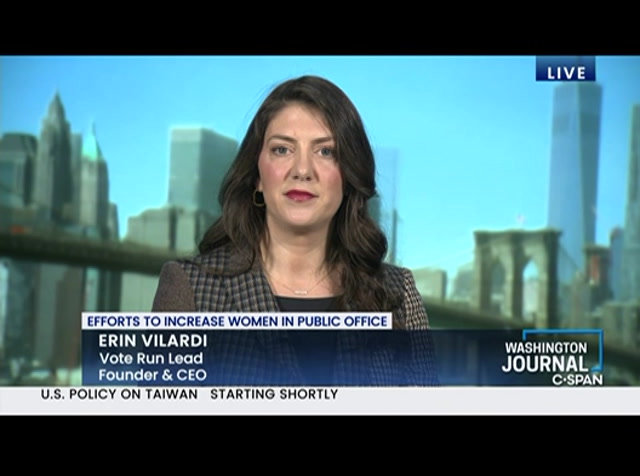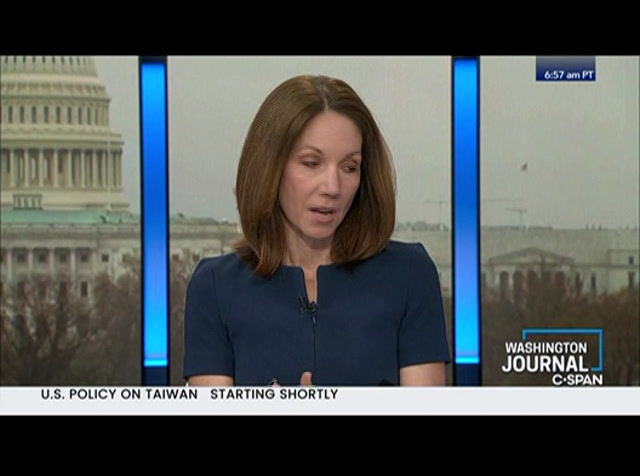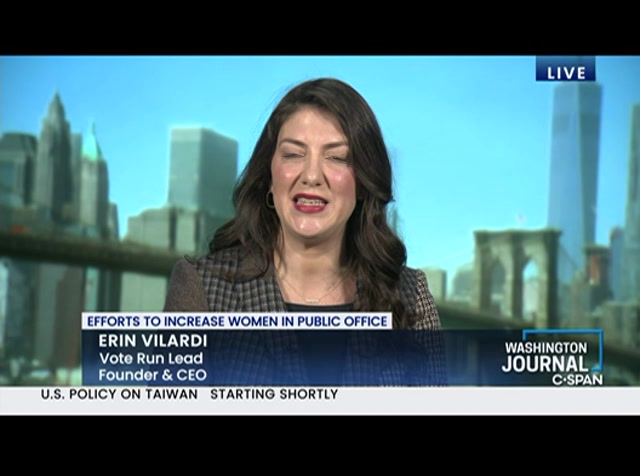tv Washington Journal 03282024 CSPAN March 28, 2024 7:00am-10:01am EDT
7:01 am
four-time senator from connecticut and running mate of al khor passed away yesterday at the age of 82 from complications of a fall. the one time democrat turned independent legacy coming up. we mark women's history month beginning with a conversation with the role women will play in campaign 2024. they are the largest group of registered voters and tinted turn out in high levels. women only we wanted to know your top issues in 2024. if you live in the irpin section of the country (202) 748-8000, if you live in the suburbs (202) 748-8001 and if you live in rural america (202) 748-8002 you
7:02 am
can text us at (202) 748-8003 or join us at facebook.com/c-span or on x at cspanwj. take a look at the latest polls, the quinnipiac poll where women stand right now. 58 percent of females surveyed said they are supporting joe biden. 36% said they are supporting the former president. here is how females voted in 2020 according to exit polls. 55% said they had voted for joe biden while 44% said they had voted for former president trump.
7:03 am
women only, what is your top issue in campaign 2024? we want to hear from women only. divided by urban, suburban and rural. the council of foreign relations looking at the role women will play while former president trump is leading in polls as we just showed you it shows joe biden in a dead heat capturing 58% of the women's vote of five point game. trump support by women declined to 46% black and hispanic female voters provided him his edge.
7:04 am
in contrast, trump retains the loyalty of white women whose the largest block of the electorate. women only, your top campaign issue in 2024. nbc news with the headline about the role women will play. women voters could sway the 2024 presidential campaign. the boost for provided in that quinnipiac poll as more women say they will support biden over trump 58% for biden with 36 for trial. unchanged among men with 53% saying they would support trump and 42% for biden.
7:05 am
women have shifted away from the former president into president biden. this comes as trump was ordered to pay 83.2 four his claims against her assault and a department store and mocked nikki haley and her clothing choices before she dropped out. nikki haley on the campaign trail talked about reproductive rights and male politicians talking about it. here is a moment from nikki haley earlier this month. [video clip] >> the focus needs to be banning late-term abortions and making sure doctors who don't believe in a forces don't have to provide them and making sure no state law that a woman having an
7:06 am
abortion won't go to jail. the fellas don't know how to talk about this. this is not about a number this is about babies and women in a personal situation and handled without respect. host: nikki haley talking about reproductive rights which could be a topic for women and 2024. that is a conversation we want to have on the washington journal. let's hear from diane and iowa. a rural part of the country. your top issue in campaign 2024. caller: can you hear me? host: we have you now. caller: i didn't think i was going to be first.
7:07 am
my top issue is the stuff of the republicans are doing. it gives me more hope for president biden. i still see trump sides. it's like you don't get it. i have seen farmers around here they are getting rid of their cattle and changing the way they farm. they have to know that there is climate change. in my own yard i see erosion. host: is that the top issue for you? climate change? caller: it always has been with me being diabetic. what do i do with all my
7:08 am
supplies. poor mother earth. the way the gop thinks what they say is true and to me, is disgusting. i don't have stuff in the stock market. it is only for the rich. my top issue is the way the gop thinks what they say is true. host: you are voting against the gop? caller: i always have. it gets me mad. host: holly you are in the suburban part of the country what's your top topic? caller: the economy and
7:09 am
immigration. host: why those issues and how you plan to vote because of them. caller: the economy because things are not getting better. i hear from the democratic party that prices are lowering which is not true. prices are not coming down and it is taking a big chunk out of my budget. with immigration, it was fixed under donald trump. joe biden totally ruined it. i can see him undoing everything trump did and it's a disaster at the border. those are my top two issues. i am leaning towards voting for donald trump.
7:10 am
but i will not vote for joe biden. host: what would make you not vote for the former president? caller: i liked his policies but he does have a big mouth. he needs to stay off social media and act more presidential. i am just questioning the motives of a lot of these lawsuits. that is what turns me off about trout. ump. host: who do you think he would vote for? caller: i did like nikki haley and if you write her in you are wasting your vote. i don't think so. we are privileged to be able to
7:11 am
vote there are a lot of places you cannot. if i would vote i would probably right in nikki haley but i'm leaning towards trump. host: vanessa from florida. caller: i am a black woman voting for donald trump proudly and what i am going to tell you is that there are many of us out there who are voting for donald trump. i proudly wear my shirt to give him all the support possible. the worst and most insulting thing is expecting all women are going to fall in line. that we all follow the democrats playbook which we do not.
7:12 am
i feel like the democrats will be in for an awakening. we don't believe he raped any of those women and we don't believe anything that comes in from the liberal news media. thankfully black people are beginning to wake up to the lies in the way they treat this one man. you are going to see a reawakening and realignment as far as blocks are concerned in this country. i am a black woman living in florida, thank goodness for ron desantis and thank god for donald trump. host: what are your top issues that make you want to vote for trump? caller: the way that the hatred
7:13 am
for this one man who has done nothing but try and help this country. the way you liberals and you too sweetheart promulgate the hatred for this gentleman has turned so many of us to donald trump although i have voted for him and will probably again. the nastiness towards this one person who has done nothing but try to help this country and god forbid not all black women want to stay on welfare and just followed the democrat playbook. host: we heard your point. brenda and oklahoma. your top issues. caller: they should have a
7:14 am
choice. god gave everyone a choice. i don't think any man ought to set up themselves as god and tell them they have the right to tell anybody what to do when it is up to god. host: reproductive rights? caller: yes. host: because of the dobbs decision, has that influenced your vote? caller: no, it hasn't. i would vote for nikki haley but i would never vote for trump because i know that he has done everything he has been accused of. he has deceived so many people. host: from the council of
7:15 am
foreign alliance his support could be softening because of reproductive rights. he garnered 39% but in the primary he could be losing some of that. 43% of women voted for nikki haley despite the fact that trump was widely forecasted to win by significant margins. south carolina will not cross over to vote democratic but it may mean that some women will refrain from voting for him. beverly and mount airy, north carolina. what are your top issues? caller: my most important thing
7:16 am
is our deficit. we spent 7.2 trillion on earmarks. neither party will earn my vote. you have to have good character. you have to be a uniter. trump is the biggest divider of ever witnessed in my lifetime and for that my vote will go against trout but not necessarily divided. -- against trump. we have to get the deficit under control i don't know why so many people are out the border other than the nooses telling them to. i haven't been affected by it and i suspect most people have not been affected by it. they are looking for a better life and i get we have to do something about it but be
7:17 am
realistic. we can't dump them back in the river and let the go. there are human rights to be considered here. for that, it will be a vote against trump. host: janice from chula vista, california. your top issue and how you plan to vote. caller: to the sister in florida i agree with her 1000%. i also wanted to state i called in a month ago and you cut me off before i finished my point when i got to the point about biden falling off the bicycle you did sensory because you have the delay. what she just said of florida i
7:18 am
agree with her. as far as who i am voting for and why i am voting for trump and i am also a sister and i voted for trump in 2016, 2020 and will vote for him again. biden is a disaster. everything he has touched he has destroyed. everything trump did benefited me and everyone else in america. i don't understand why people are voting on policies it's about food on the table, affording to live in a nice, comfortable home. people are so intent with their hatred towards donald trump that they would cut their nose to spite their face.
7:19 am
it's all about personality. i have always voted policy. as far as the main issues for me. emigration and economy which biden and kamala harris. how could anyone vote for that senile buffoon. biden is the worst president and history. and for black americans to say that trump person is a racist. the next time you wanted to talk about donald trump being a racist. i've never heard him say the n road. he is my man now and if there is
7:20 am
a god, he will win. host: janice in chula vista, california. we are talking to women only this morning. your top issue in this election cycle as women play a pivotal role in the outcome in november. gina and alabama, you are in a suburban area? caller: yes ma'am i am outside of huntsville, alabama. in a district representative dale strong. my top issue has been for a long time the debt. not so much the deficit, the debt. it seems funny to me, the
7:21 am
military budget is 800 billion it's been 400 billion on the military and then they crafted the budget with 800 billion, that's 2, 3 trillion right there. their refusal to address retirement reforms. i am generation x and we have 10,000 baby boomers retiring today and they hired extra irs and border patrol but no extra people working for social security. i have no problem raising the retirement age. i think they should raise that
7:22 am
cap and not started at 400,000. every dollar should be taken out of and with immigration we have had the declining birthrate in two years ago was the first time we had a declining birthrate in alabama. we are not having babies. we need these workers that i don't understand what the problem is about this double dipping stuff. now they have only six months to pass a budget and now they have six months suspended until november 30, 2024. they should have done a cr to pass a budget for 2025. host: how do you plan to vote? caller: i have no idea. i never hear anything coming out
7:23 am
of the democratic side. i always get that wrong. nikki haley did mention raising the retirement age. they should absolutely do that. they should not do it to people who are 57 because is 67. give them time to catch up. host: who are you going to vote for? caller: i guess i'll vote for my congress and skip president trump. maybe he is persuadable. i don't see president biden
7:24 am
being persuadable. host: what is your hesitation with president trump? caller: he said "gd" in his speech and took the lord's name in vain. but maybe i should have forgiveness in my heart. host: gina and alabama. -- in alabama. social security cost of living adjustment for 2025 may be less then it was in 2024. they forecasted it to increase by 1.75%. let's go to lydia in new york. your top issue in 2024.
7:25 am
caller: i am so concerned about the women i am listing two. this is not going to be black or white or the cost of eggs. it is about democracy republic is a truck trying to take away women's rights. it is so sad to hear these women. what is wrong with you? seriously. we are in trouble. i am terrified. trump is selling bibles for $59. i don't care about the price of eggs. i do worry about my rights of my daughter's rights. i worry about our democracy. next november i will vote for biden i don't care how old he is. host: in the new york times this
7:26 am
morning the democrats who spoke out for abortion access when and alabama state house seat. after campaigning on access to abortion and in vitro fertilization underscoring the political potency of reproductive rights she defeated teddy powell by 25 percentage points in an extraordinary margin where she lost by seven points in 2022. a special election was called after david crow pled guilty to voter fraud. marie on facebook said your top issue women only this morning get government out of my everyday life, reduce government
7:27 am
power. women's health care rights. her top issue in this campaign season. women's health care and bonnie, our safety and border with no regard for what criminal or terrorist coming through and men wanting to take away our rights. let's go to jamie in massachusetts. caller: my top issue is reproductive rights. to the larger issue which if the president gets to a point judges and we keep our judiciary strong and democratic. donald trump just gets a list he
7:28 am
signs in science and science and ends environmental regulation and allows christian nationalist and federalist society judges are the ones who are often unqualified and into positions. that is how we lost roe and i'm very concerned about the makeup of our supreme court. people who are vetted to rise through to their position. amy coney barrett came from a call. they have to divert to males which is the underpinning of the church he goes to. i'm concerned about the judiciary and i feel like
7:29 am
there's no difference between the republicans and democrats. i hear this in florida when i go down there, i'm retired. and i have to point out the civics that the judiciary is the most important thing. it's a capitalist society, you are voting of aquatica republican. there are similarities but i also want to say that biden economic have while my stocks of gone up. there are only six companies that control the price of food so one publican said they want to regulation you can't have both. you can't have de-regulation and not have regulation on things like health care, environment and information.
7:30 am
by listening to your callers everyone is listening to fox they don't listen to the newspapers. host: you may be interested in reproductive rights topic usa today justices are in sync. they are united over memphis prestone -- mifespristone. conservative and liberals picked apart the argument of a small group of abortion doctors seeking to rollback access to the widely used abortion drug. lawyers expected kid gloves and left tuesday's arguments feeling bruised. we have those arguments on
7:31 am
c-span you can go to c-span.org and listen to the questioning by the justices. charlotte and milwaukee, good morning to you. your top issue in 2024. caller: civil rights. trump wants to be a dictator and block people calling in who are pro-trump. the lady from florida was not locked. i am with biden all the way. host: susan in chicago. caller: hi greta, thank you for taking my call. might issue with the fact that i
7:32 am
really believe religious groups are weaponizing a way to harm women and men. let's face it. there are a lot of minority religions in this country. when roe was in place you had a choice. and i believe that is what should exist in a democracy. it breaks my heart that there is not a reality-based viewpoint in terms of this. i am not a christian woman. i never have been. it concerns me that the religious right is weaponizing
7:33 am
so many things in this country to undermine our democracy. as far as i'm concerned, trump reminds me of jim and tammy faye baker. he is a huckster, always has been and always will be. host: we will go to cheyenne and south petersburg, florida. your top issue in this campaign? caller: thank you for taking my call. i have so many issues it's difficult to narrow them down. host: give us your top three. caller: everyone is pushing children to get vaccinated with shots not required for the health and it seems to me people
7:34 am
are more interested in profit margins than our children's health. in the old days they had seven shots they took in school and now it's like 70 and i don't believe they are being tested properly. host: that's your first issue which you consider voting. caller: release the data so people know if these children are being harmed. host: would you consider voting for robert f. kennedy, jr.? caller: i don't believe his vice president choice isn't any rational except that she has money and she is divorcing someone rich. i'm disappointed in our choices,
7:35 am
and their voting systems. host: i'm going to leave it there because the feedback from your television is interfering. just remember when you call and you have to mute the television and talk to your phone. more of your calls and facebook posts coming up. women only, what is your top issue. continue calling in. jason dickens now. to talk about the passing of senator lieberman. let's begin with his legacy in the senate what will he be known for? guest: he will be known for quite a few things. he had a long career, for terms
7:36 am
and during those four terms he helped create the department of homeland security and was a different national intelligence apparatus we had before 2002. those scams out--those came out of the 9/11 commission. i think that's one of the big legislative achievements for senator lieberman. despite a lot of the attention paid to his conversion to an independent and support for john mccain in 2008 after being the democratic nominee he did still largely vote with democrats and in particular with the obama
7:37 am
administration. this was after he became an independent democrat and still voted to repeal don't ask, don't tell that prevented gays from serving in the military and voted for a big stimulus package that they push for after obama was elected and most notably although he pushed for his own priorities as part of the affordable care act he did vote for the affordable care act. that is a lot for any u.s. senator and more intangible lines one of the things that got him into trouble was his willingness to work across cio.
7:38 am
this is something we see a lot less of and led to a lot of dysfunction in congress. people are quitting particularly in the house. a lot of them are sliding the same thing which is impossible to get things done. even if you say things that are not popular with the base you get drowned out. those are some of the big descendant legacies. one of the biggest jewish nominees in the big national legacy there. at the end of his career when he was affiliated with the no labels movement he made democrats pretty skittish about what the effects would be but that would be part of his legacy
7:39 am
as well is being involved with no labels. that has not produced the third-party candidate that he would've liked but it will be a part of his legacy. host: remind viewers why he switched from being a democrats it independent? when did that happen and why? guest: after the 2000 election he began to drift away from his party on the most important issue of the early 2000's which was the iraq war. he was in support of the war even after it was not going well and it cost him in his run for president and when he was up for reelection the democratic primary voters in connecticut, they said they had seen enough and he lost the democratic
7:40 am
primary to the governor of connecticut but at that point, he was just an unknown rich guy. he wrote a wave of antiwar sentiment to win that democratic primary. he dismissed those results saying it was not representative of the state and ran as an independent and beat lamont and almost got 50% of the vote in the republican nominee. he showed that you could win under those circumstances but again it soured democratic party activists and that led him further along the lines of being willing to be independent. he did not run for reelection in 2012 and in 2008 when he
7:41 am
endorsed mccain is solidified he would be a different type of democrat at that point. host: why do we know about funeral services or any honor he will receive from congress? guest: there will be a memorial in new york, i'm sorry, connecticut. that would be in accordance with his orthodox jewish faith to bury him soon after his death and there will be services later on in a bid to honor his wife. i would expect there would be some sort of recognition in the capital when they return and some other public memorial for the family and close friends. those funeral services will be later next week. host: thank you.
7:42 am
guest: thanks greta. host: for those who would like to learn more about joe lieberman you can search our video library he has appeared several times i want to show you a portion of his farewell address in 2012 urging his colleagues to embrace bipartisanship. [video clip] >> i regret to say the greatest obstacle is right here in washington. it is the polarization of our politics. which prevents us from making principal compromises at which progress depends and prevents us from restoring our fiscal solvency. we need bipartisan leadership to
7:43 am
break the gridlock in washington that will unleash all the potential that is in the american people. i would respectfully make this appeal to my colleagues especially the 12 new senators who will take the oath of office for the first time next month. i know how hard each of you has worked to get elected to the senate. i know you work so hard because he wanted to come here to make a difference for the better. there is no magical mystery about the way to do so in the u.s. senate. it requires reaching across the aisle in finding partners from the opposite party. putting the interest of country and constituents ahead of the dictates of party and ideology. when i look back at my own career the legislative
7:44 am
achievements i am proudest to be a part of like passing the clean air act, stopping the genocide in the balkans, creating a 9/11 commission and department of homeland security reforming the intelligence community. repealing don't ask, don't tell. they were only achieved because we found common ground and that is what is desperately needed now to solve our nation's biggest problems and address our biggest challenges before they become crises or catastrophes. host: joe lieberman in his farewell address in 2012 passing away yesterday at the age of 82 after a fall. chuck schumer who was his colleague and the senator from
7:45 am
new york put this out and tweet. i'm devastated to hear about the passing of our colleague. my heart goes to his beloved wife and family and all those who knew and loved him. from chris murphy from connecticut, the former senators home state. in the field of carbon copies he was one-of-a-kind. you will recall last week the late senator penned an opinion piece in the newspaper critical of chuck schumer and his recent remarks about israel. in our first hour here we are talking to women only. they tend to vote in the highest
7:46 am
numbers, 68% of women voted in 2020 so we wanted no your top issues of 2024 coinciding with women's history month. we are talking to women only and divided the lines rural, urban suburban. surely, your top campaign issue? caller: my top issue is the children of the world. i want all of the trump voters to remember when he was invited to office the first thing he did was separate 5000 children from their families.
7:47 am
when you go into the ballot box think about your own children and families. i raised three generations of children and they need to be respected and taken care of. think about the children and our country and how they were children when he became president and for everyone to have a happy easter. host: terry on facebook says it's the economy and wages. janine and fort mitchell in the suburbs. caller: i'm not new york i'm in kenton county. host: sorry, i need glasses. caller: i listen to you all the time. i'm on counsel here in northern
7:48 am
kentucky and very much involved in our country and lack of constitution paid no attention to our constitution and i always tell my people, patrick henry had an issue with madison because he wanted a strong federal government and he said if we have a strong federal government you will destroy the republic and ben franklin said what do we have and he said we have a republic if we could keep it. we are losing our republic. we are not paying attention to the constitution. the debt is unbelievable. we print money and basically have to pay back money to china and all of these countries. one of the things i've been
7:49 am
working on in our area's housing choice vouchers. that's an alarming program by biden for anyone needing subsidies they can come into your city and if there is a house for sale they could basically buy that house and we get to pay for their choice of house. it sounds unbelievable but it is true. this is part of critical race theory. as far as equity and inclusion and diversity. these are huge issues destroy the family unit and or neighborhoods. host: how will you vote in november? caller: i will be voting for
7:50 am
trump. i have been on the bandstand since the beginning. i think he did so well the few years he was an and i noticed a huge difference in my life and money and i am a retired teacher. i've met a lot of people and met a lot of -- i have been a lot of places. people don't like the way he speaks but i think you so much for the washington journal. i am also the vice president of the officers club and the secretary and what i've been able to do so further civic engagement, bring people to the process. our students don't know much about civics or our constitution and i have programs where
7:51 am
children come and we teach them the constitution. i have people on the ballot in kentucky who will be speaking to our group and broadcasted in northern kentucky and i'm trying to get the message out. host: for those students in civic education go to c-span.org because we haven't education component with a lot of resources that you might find useful this well. let's go to whitney in maryland. caller: thank you for having me. for someone who is against de i is voting for trump. my top issue is reproductive
7:52 am
rights. democracy and the rule of law. i think the rule of law needs to be applied to those people who have money. there are a lot of people in jail right now who did not have billion-dollar lawyers. they did not have the luxury. if donald trump applied to work for the post office has application would be denied because he would not be able to pass the background check. but yet he is running for president. the rule of law in this country is out of whack. there are a lot of people who talk about gas prices and prices at the grocery store.
7:53 am
they are not set by their president. i have family in canada complaining about high gas prices and food prices and in the caribbean. how is joe biden responsible for inflation in canada, the caribbean, asia? it makes no sense. it is conditions that cause inflation in that condition was a global pandemic. he has nothing to do with prices at the pump. two dollars 89 under trump it was 1.99 under clinton. we need to focus on what is impacting our lives for us and our kids with me with the daughter seeing what they're
7:54 am
doing with reproductive rights. i don't want that to happen my daughter. we decided to stop to go to college that are in states with these draconian laws. we had to keep her out of those states. those of the things were thinking about i can even said my daughters to the states and god forbid something happens to her and they are forcing her to have a child from a rapist. these men making these laws they have to understand most of these women don't want to abort. abortion is necessary to save their lives if the child is not viable and there is no such thing as apportionment nine months. no woman in this world cares their baby up to nine months to
7:55 am
tell the doctor to get rid of it. host: let's go to shirley in texas. caller: good morning. my issue is the lying. when i was a little girl i read the newspaper. it is sad to hear the women of this world and the things -- they have hatred in their hearts. god is all about love. host: how are you going to vote in november? caller: i'm going to vote democrat. just like she said earlier it is not biden's problem, inflation.
7:56 am
one million people died from covid. they could've put a lot of things in place, the masks, anything. it is so sad. i had family members pass away and i was so scared. i was wearing 4, 5 masks. i got covid but thank god i was able to get through it. the ones we lost was very sad. host: we will go to sue in massachusetts. how will you vote in november and what are the issues defining your vote? caller: the reason i called is how i will vote in november i
7:57 am
will hold my nose and vote for joe biden. i don't like the fact that i have to choose between these two people. but my number one topic is the push to turn our democratic republic into a theocracy. i will do everything in my power to stop that. we are not a white christian nation and that appears to be what the other party would like us to become. host: are you voting for joe biden and kamala harris? caller: well, yes. i am voting against donald trump i am not voting for joe biden. i am an independent but the democratic party need to stop
7:58 am
appointing people because it is their turn. we are a government of old man and i think they are too old. host: what about kamala harris? caller: i'm not a huge fan of hers. back then i was a p buttigieg supporter. that's another thing that concerns me. then we will have president errors that i don't think she's ready for prime time. host: kamala harris became the first woman of color to become vice president and here's a portion of her speech. [video clip] >> my mother was always in our hearts.
7:59 am
when she came here from india at the age of 19 she did not imagine this moment but she believed so deeply in an america where a moment like this was possible so i am thinking about the generations of women, black women. asian, white, latina, native american who throughout our nation's history have paved the way for this moment tonight. women who fought and sacrificed so much for equality and liberty and justice for all. including the black women who are often overlooked was so offered proof they are the
8:00 am
backbone of our democracy. [applause] >> all the women who work to protect the right to 100 years ago and now in 2020 with a new generation of women in our country who cast their ballots and continue the fight for their fundamental right to vote and be heard. tonight, i reflect on their struggle. their determination, and the strength of their vision to see what can be unburdened by what has been. and i stand on their shoulders. and what a testament it is to joe's character that he had the
8:01 am
audacity to break one of the most substantial barriers that exists in our country and select a as his vice president. but while i may be the first woman in this office, i will not be the last. host: that was kamala harris back in 2020, her victory speech on becoming the first woman and woman of color to be vice president. we are marking women's history month today on washington journal. we will show you other female figures that have risen in political power, republicans and democrats throughout today's washington journal. coming up, author and educator rebecca roberts discusses her book untold power about first
8:02 am
lady edith wilson and the significance of women's history month. and then later, founder and ceo aaron filardi discusses the organizations efforts to increase number of women, democrats and republicans serving in public office. but first in 2019, historian kate clark gave american history tv a guided tour of the national portrait gallery exhibit that marketed centennial of the 19th amendment. here's a clip from that. >> she was well ahead of her time. she started her own business with her sister, she advocated for free love, which was definitely outside of the norm, and she also ran for president on a trd-party ticket and she was the first woman to do so. and we have a really nice
8:03 am
portrait of her attempting to vote or asserting her right to vote, as she would see it. she voted when you weren't supposed to vote as a woman. here is the instant she is asserting her right to vote, she's just dropped her vote into the ballot box. and lots of women at this time were dealing with what would be illegal voting because it was supposed to be illegal for women to vote, and so she wanted thousands across the country to change the system by going out, boating, getting arrested, not paying the fine, then serving a sentence in jail so that then they could appeal through the court system, and they tried to change the laws that way. but they failed, and there was another severe blow that was dealt to the suffrage movement when the supreme court needs
8:04 am
against a woman named virginia minor who had tried to vote and had gone up to the court system but then the supreme court found that women should not vote legally in the united states. so we were discussing how victoria asserted her right to vote by placing a ballot in the ballot box, and here we have a different type of ballot box. this one is made out of metal like the one in the portrait that was most likely made out of wood. and what i like about this ballot box is that it specifically says women's pallets on it. so it is very much in your face that women were voting separately and not on equal terms for equal types of suffrage, so they couldn't vote for municipal suffrage or school suffrage or in some states before 1920, about 15, i
8:05 am
believe, were allowed to vote in presidential elections. so this spot is from elwood, indiana, one of those states that allowed women before the 1920's to vote in the presidential elections. and it was made by a company out of st. louis and they made these boxes between 1860 and 1920. and i think it is a real interesting peek at the culture that illuminates what women's rights were like and what it looked like, what it felt like. announcer: washington journal continues. host: rebecca roberts is at our table this morning, the author of "untold power: the fascinating rise in complex legacy of edith wilson." she's also the event deputy director for the library of congress here to talk about women's history. but let's begin with the significance of making martial women's history month.
8:06 am
guest: keep trying to convince people they connection talk about women's history all 12 months of the year but it is nice to shine a light every march i think that it gives these organizations like yours, museums, anything that is public-facing a chance to highlight different stories and excuse to promote the narratives that maybe might not be in the mainstream. what i find so fascinating about it women-centric view of history is not that it is just saying women were there too, it is actually that women make history differently. we effect social change differently. so when you look at these great moments in american history, you can't pretend that there were women at the signing of the declaration of independence or something like that. you can't force some there are two that isn't true, but you can say hey, maybe the declaration is not the full story. maybe that is not actually the only way we can tell the story
8:07 am
of how america came to be, and that if we broaden the story and talk about affecting social change in a way that is not just about these kind of hall of fame moments, then suddenly you are telling the whole american story. host: and how do you do that? guest: at the library, we have such an incredibly vast collection and we have so many fingers in so many different pies that we need to narrow down our story. everyone who works in a place like the library of congress and everyone who has worked in all of the constitutional positions is so enthusiastic that we are like golden retriever's. come see this, this, that. this one is also cool. at the library of congress we are very aware that we are americans library, that we are this institution that was founded to showcase the innovation and knowledge of our
8:08 am
nation, and we are patriotic about that. we also do have collections that are global, so it gives us the chance to tie-in all of these stories and even go broader about story that might affect each other and interesting connections. post: talking about women's history month, you've course have to talk about women's suffrage. the 19th amendment was ratified while woodrow wilson was president. how did edith wilson feel about the movement? guest: this kills me. she was anti-suffrage and the is and is because she was this fierce, independent, business- toning, car driving -- she was the first woman in washington to get a drivers license. time after time she proved herself to be this very innovative, aggressive independent. she wouldn't have used the word feminist, but i will.
8:09 am
not interested in exercising her full rights as a citizen and not interested in other women exercising their full rights as a citizen i actually got interested in her because of suffrage. i was talking a lot about it especially around the centennial of the 19th amendment, and people kept asking the did woodrow wilson come who dragged his feet on suffrage, he finally changes mind because she told him to? and i wish that were the case, that would make a pretty good story he changed his mind for reasons like politicians do all the times. he was worried all the new voters would become republicans if the democrats didn't suddenly do something about suffrage. and i don't know why she was anti. i wish that she made more definitive statement about it. i think some of it was especially with the last part of the movement, the more radical branch of the movement, they
8:10 am
were taking the white house, they were directly criticizing belton, she really hated that come the nastiness about her husband. but i think that there was just kind of a lot of women who were anti-suffrage, and what they said was we race the families and we run the household and that is vitally important, and if we insist on mucking around in the public sphere, the men's sphere, we not only feed our moral high ground by getting our hands dirty, but we somehow imply that our world is less important and not more. and we start to see echoes of that generations later against the e.r.a. and so i think she was raised in reconstruction era virginia and she was getting this cult of true women suffrage and i think there is something a little not nice about being out there. host: you've written two books about the suffrage movement.
8:11 am
what are some takeaways from your research and from your books that people need to know and understand about that movement? guest: i think the essential thing, and i think this is true of all history, because what makes it turn the corner from being interesting to being relevant is what can you personally take away from it? the suffrage movement in particular is a really great blueprint for becoming an activist. they were really, really good at what they did. now, it took a long time, but that is instructive to understand that there are smaller congressmen along the way to the big bowl. and if you look at women in washington, the shadow of the capital right now, how many times have you sat and been sort of annoyed that there is a march on pennsylvania avenue and it is just kind of a traffic headache. no one has marched on washington before the suffrage is did it. if you go to the white house, i promise you there are picketers there. those are the people who i think lived in lafayette square with
8:12 am
picket signs. nobody picketing at the white house you start seeing these tactics that they invented when they sit in front of the white house with emblems in -- embroidered on banners, those were tweets. that with a 1970 way of making things go viral. make sure someone gets a picture to put in the paper. so it is incredibly interesting to me to see what they were able to do 100 years ago and i think no matter the cause, if you want to be an activist, and i hope all young people do, look to the suffrage movement lessons, no question. post: some move us into the e.r.a., and how did it move to that and where does that stand today? guest: there's a direct line. in the suffrage movement, by the end of it, by the ratification, it was sort major organizations.
8:13 am
the larger, mainstream group, they became the league of women voters. they decided one for 19th amendment was ratified that their role was to educate this generation and future generations of women voters to make sure that they were participating. the national women's party, the more radical wing decided to stay a political party in order to write the first version of the e.r.a. and so the e.r.a. absolutely was considered unfinished business i the activists. -- by the activists. they were a little naive at the time. they didn't quite understand some of the class distinctions and have some of the rights that working women had achieved in terms of workweeks that enforce breaks would actually be hurt by the e.r.a. because men didn't have those traits at the time, but as the labor movement has progressed and as the e.r.a. became more of a unifying factor and less of a divisive factor,
8:14 am
they kept being introduced and introduced. now it is in an interesting situation. i'm not going to speculate on where it goes from here. it is interesting to me that it is not dead, that people are still talking about it. it is interesting to me that in 2024 women still feel that we need it, that in quad -- equality is not enshrined. host: it will be interesting to talk to our viewers about the equal rights amendment marking women's history month by talking about women's history. you can join the conversation. here is how you can do so this morning. start dialing in. remember, you can also join us on social media, you could text us, include your first name, city and state when you do so. rebecca roberts as our guest, the author of the book open but untold power: the fascinating
8:15 am
rise and legacy of edith. she is also the events director at the library of congress. caller: hello, good morning. i have a question. i'm a democrat. i was listening to call her this morning talking about abortion and the rights of abortion, but my question to you is i'm seeing women's rights fading. i'm seeing women that now have men enter exports with women, which diminishes the women. i see men being able to go in women's bathrooms, locker rooms, the whole bit. how is this helping women? to me it looks like it is taking down women. i think they're losing a notch or two. new yorkers, they are getting
8:16 am
punched in the face by men. it is going viral. women are not doing well under this administration. they are fading, and i don't get it. you should be fighting everything here for women. women should be stood up, not taken down. host: rebecca roberts? guest: i think this is an interesting aspect of a movement maturing. when you look at pictures of the suffrage march 8, 1913, for instance, they had a huge banner that said we demand a constitutional amendment to franchising women. they have is very clear goal. it wasn't we hope and pray, it was we demand. they were organized behind one thing. and they had to be, because they didn't have anything. the fact that the contemporary women's movement can say we demand abortion be safe and legal, we demand equal pay for equal work, we demand freedom
8:17 am
from sexual a precedent, it is actually a maturing of the moment because we don't need to force this very basic right. we can, as women, move on 12 of these different causes that add to greater equality. >> alexis, independent. caller: good morning, i'm sorry, i haven't read your book but i'm going to get it. as far as the abortion issue, nobody ever hears that with parenting. i think that women know themselves well. some people can't parent. unfortunately, contraception isn't 100% effective, and therefore people have to have that.
8:18 am
they might make good neighbors, they might make good aunties, but just because you have a uterus doesn't mean that you can parent. i would love to see people admit that and not think just because you can get pregnant, you can parent. that's why we have so many people in our foster home and running away. if you could speak to that i would love to hear it. guest: thanks, alexis. i think all the women standing up and say i don't want children is also still heavily judged. and i hope women who don't want children don't have them. but i think if you are on any social media and you start getting sent memes from people
8:19 am
who are proudly child free, they seem a little aggressive. they seem a little judgey. but it is hard. it is still hard to say i don't want to be a mom. that, i think if this legacy of gender roles and what we are supposed to do and what is expected of us, and i absolutely agree with alexis. if you are not going to make a good parent, please don't be one. host: the suffragist movement is associated with wearing white. we've seen when it came up on the centennial that women in congress were wearing white on big occasions. explain why. >> this is another topic the suffragists were really good at. they understood how a visual element could make their message go far. and so white, think of it at the time, pictures were black-and-white. a whole lot of women in white is a very striking image.
8:20 am
this also is of symbolism behind the color. the colors of the movement were purple, gold and white. purple often associated with royalty, gold had its roots in the sunflowers of kansas where there were early suffrage movements, but actually began about black-and-white. purple visibly saturated color, white is not, gold is somewhere in between. it contrasts beautifully in pictures. and so this imagery was designed , again, the 1913 equivalent of instagram. a white down on a white horse because she was beautiful. she was a labor lawyer, she was totally accomplished, but everyone kept calling her the most beautiful suffragist and talking about how pretty she was. if you are going to talk about her looks instead of her brains, i am going to put her on a white horse and she will never leave my parade.
8:21 am
so i love that it is still a symbol. when you see the state of the union or another era where women are the minority and men tend to wear dark suits, it still contrasts really strikingly on television. you see that scene of the senate floor and suddenly there is this isolated bundle of light. the suffragist knew what they were doing. this time around, women are in congress and the house women decided to wear white to associate with reproductive rights. talked about taking that and the suffrage movement and applying it to the reproductive rights. guest: it's interesting. one of the antiabortion rights groups is called the susan b. anthony and, trying to draw a line between suffrage and antiabortion. there is not a clear through line from suffrage to abortion lights -- right the way there is
8:22 am
with the e.r.a. but the tactics again are things that were successful ban and are successful now regardless of cause. there is a messaging around abortion rights that is about women's empowerment and women's control of their own bodies and they are trying to limit abortion rights to be misogynistic and that is the through line for people who chose that symbol. but it does go directly back to the suffragist in the early part of the 20th century. host: pat, democratic caller. caller: good morning, thank you. i would like to tell my story. i wanted to be a truck driver when i was a small child. i grew up, went into the army to learn how to drive a truck, came out of the army, got a job and i've been retired for eight years now.
8:23 am
my husband and i both retired at 2 million miles, accident free drivers, and we hold everything from campbell's soup and nabisco and we were hazmat endorsed, called explosives, poisons, chemicals. we were out for a month at a time and worked for 23 years for warner enterprises out of omaha. and when we retired, it was because they finally gave a raise, what it was for everyone under the one million mark, and we had 1, 2, 3, 4 and one 5 million miles driver, and they didn't give us a raise, so he got angry and quit. but for women that don't believe
8:24 am
that women ought to be doing this or that in a time like this, i wanted to know that i succeeded. host:host: thank you. before you go, did you make a much is your husband throughout your career? guest: we made the exact same. all along. and that was one industry where women got paid the same and that is through my eyes because that is what i experienced. but now i see women that have the opportunity to do these things but were turned away from such employment and say that you ought not be doing this. it seems like everything is turning backwards and even to the went where i met a black neighbor of mine who said that he doesn't believe in unions. and you know why i retired?
8:25 am
i was so angry and i admit that i overreacted, but initially, our company wasn't unionized. i had nobody to go to to voice my concern about being overlooked. host: ok, pat. rebecca roberts? guest: i be curious in the 23 years pat joined that industry. i think that you can talk about statistics and obviously is an industry where women are severely underrepresented, but it is very clear what women need to make industries more friendly for them. long-haul driving probably isn't one where there is a lot of access to childcare, for there is flexible leave, things like that. so i think her story is fascinating. i can't believe she started driving 23 is ago, one million miles, that is really a story.
8:26 am
and i think that we who work have all experienced workplaces that make it easier for us to work and we've all experienced make it harder for us to work. host: feel free to jump in with your text and have a conversation with every risk. what impact to the labor movement? guest: it is interesting you look at the suffrage movement, there are times when those women were blind to the class differences. you can't go attend a march in the middle of the day if you have to be at a factory job. for a while, it felt like it might be the privilege of wealthy women to be able to participate in that, and finally there were some suffragists, call it intersectionality today, who understood that working-class women have some more political need and then additionally it's.
8:27 am
there was an effort to include working women to advocate for them as one. the message was if you can vote, you can fight for the things you need in the workplace. i do think that we are still fighting the fight. there are plenty of women who worried that the contemporary women's movement is a movement of privileged white women and that the labor movement is distinct. as i say, i think a sign that is a sign of the movement maturing that they can employ -- include many more voices. host: republican. caller: good morning, rebecca. guest: good morning. caller: ic women's history and i'm always intrigued, why did we
8:28 am
never hear about alice roosevelt? i consider her a 21st-century woman born in the 19th century. she was something else. guest: she sure was. caller: that poor girl, two days after she was born, her mother dies and teddy's mother dies within eight hours of each other. tenney is so distraught he runs to the west and she has to live with her on and when she comes back another family is already started. she was such an outgoing -- to me, it feels like a tracer -- trailblazer of women, but you never hear about her. at least, i don't. i just think that it is the strange. seems like they just don't talk about alice. she was so ahead of her time in
8:29 am
history, the things she did to be dubbed princess alice by the country and most of europe. she really was something else. host: let's take that. guest: i agree. alice roosevelt from his first marriage, she was a teenager in the white house and very, very beautiful and she had this very glamorous debut and she was also kinder wild child. she had a pet snake, his father -- her father famously said i could govern the country or i could control alice, but not both. she is talked about at this glamorous princess and she married an up-and-coming congressman and that with the society wedding of the year. i agree that to the degree she's talked about at all, she sort of
8:30 am
dismissed at the society that -- belle. she actually wrote in them why that is fascinating, absolutely worth reading because first of all that articulates this narrative of what washington looked like at the turn-of-the-century, but also you see that she had great political instinct. she was really savage, she was absolutely on top of the sender negotiations over ratifying the treaty of versailles. she just really had in the way that a lot of political kids who grew up in washington are, a knowledge and a thirst for those issues. she was funny and she was frank and she was not afraid of alienating people, and she also, interestingly really had a lot to do with sort of marrying federal washington local washington which still sort of have a social divide, but because she became a congressman's wife stayed in town and was sort of a social
8:31 am
arbiter in many ways, she bridge the divide between political washington local washington. and i agree with harry, there is a terrific biography of for as well that i recommend. host: let's dig a little into your recent book. why did you decide to write this book and focus on edith wilson? guest: edith wilson to the degree that anybody knows anything about her, with woodrow wilson's second wife and when he had a stroke in 1919 and he was debilitated by the stroke, his whole left side was paralyzed, he spent a lot of time in bed, he found it hard to concentrate on conversations, she lied about it. she lied, she circle the wagons with his doctor and chief of staff and among the three of them, they didn't tell the congress, the cabinet, the
8:32 am
american public, the vice president. the president himself didn't know how sick he was. and they just decided that edith would do his job for him until he was well enough to do it himself. and i get why people focus on that one year of her life, his stance and knitting and a little appalling. but if you are surprised that edith wilson took the reins of executive power in the fall of 1919, then you are not paying attention. she chose time and again throughout her life that she was going to trust her own instincts to do whatever she thought it right to do. so i thought there was room for a fuller biography of hers that made her a more three-dimensional character and didn't reduce her to either this kind of naive rube that was being taken advantage of by political men, or this late in the back receives power for her own agenda. she was neither of those.
8:33 am
host: how did she do in that year? guest: well, she didn't go rogue. not like she pursued some agenda that he would not have. she knew his mind quite well. but there were effects. i think the biggest effect was keeping him in the dark. he had gotten sick while he was out pushing for the ratification of the treaty of versailles, beleaguered nations. that was his to read, this vision of lasting global peace. it was why he wanted a seat at the table, how he justified america's involvement in world war i. and he went on this cross-country tour, and he collapsed on the train tour. so he thought that america still out there cheering for him. he thought they were still desperately interested in the league of nations. and because she wasn't telling him any different. she wasn't bringing him any bad news. and that was part of the
8:34 am
treatment for stroke at the time, that you had to be kept calm and not face anything hard. i think the bigger effect of her taking the reins is that even if he were making all the decisions behind the scenes, it was terrible because he did know what was going on. he even considered running for a third term in 1920 which was preposterous. he not only wouldn't have survived, he wouldn't have won. so when warren harding was elected an absolute landslide, the only american voter was surprised was woodrow wilson because he didn't realize that the nation had moved on. host: tony in connecticut, democratic caller. caller: good morning, ladies. thank you for taking my call. i have a mother, sister, and two daughters, and i'm from the 70's myself and i understand how my mother was treated. my question is back when women's rights started in the 70's, i
8:35 am
was all for that. i thought it was great. then when the incident with -- excuse me -- the plan and the three or four ladies that went after him, hillary clinton went after them viciously, issue sleep. i always wondered, whatever happened to the women's movement and why didn't they stick up for those ladies? can someone help me understand how that transpired and why they didn't stick up for them? thank you. host: rebecca roberts? guest: that is not my era so i don't want to offer any details anymore than the general public knows, but i do think that women are not about making political consolations. we are not morally superior to any other gender. i think there are times when people decide that the candidacy of their party's candidate or their family member is more
8:36 am
important than whatever principles they had outside of those decisions. i think you saw that in that case. this notion that women make better politicians because we are somehow morally superior is garbage. i can hold up plenty of examples of morally pure men and terrible women. host: did the women's liberation movement take its pointers from the suffrage movement? guest: shirt -- sure. the suffrage movement was a crash course for women activists going over. it taught women how to organize, how to write petitions, how to introduce legislation. all the things that you need to know to have a successful political movement. host: hollywood florida republican. caller: good morning. can you hear me ok? host: we can.
8:37 am
caller: yes, i would like to thank you for that book, i'm going to look for it because i'm always interested in history. i would also like to point out that i think it is a shame that condoleezza rice could not become a president of the united states. i believe she would have made an absolute president and still would the excellent president. i would just like to say one thing about abortion. the pro-abortion movement, i think, fails to take into consideration that unborn girls count for something also. they have bodies, they feel pain. i would recommend that people watch the film "the silent scream" which came out in the 1970's.
8:38 am
it shows a fetus reaction at the moment of abortion and in addition to that, boys also count for something. i'm kind of astonished at the pro-abortion movement has not tried to limit abortion, but only wants to increase it. host: alright, i will leave it there. susan in wyoming, republican. susan, we are talking about women's history this morning. go ahead. susan, are you there? caller: yes. i was wondering if your gasket tell me which state with the first state to allow women to vote? guest: well susan i know you are calling from casper, so yes, it was wyoming. although it is a little bit of a trick question because there was a brief moment for new jersey women could vote because they
8:39 am
forgot to include sex in their state law. so if you really want to get technical about it there was a moment in new jersey but it wasn't on purpose. wyoming is the first state to enfranchise women on purpose. host: susan, are you proud of that? caller: very proud. guest: in what year was that? 1884, am i right? caller: 87, i believe. i'm not sure either. because they enfranchised women in the territory and then brought that into their state constitution when they became a state. >> yes, and we continue to be on the cutting edge of all the social issues. wyoming is the best state in the union. and truly so, truly so. host: in what ways? tied to women's history and women, how are you on the cutting edge? caller: i believe we had the
8:40 am
first woman governor. we have equitable rights in the state. we have law and order. we are just peaceful, very wonderful people. host: all right, susan. michigan, independent. caller: hi. ok, didn't know if you were talking to me. i just want to say it is kind of embarrassing that today, the only responses we are hearing about our women's health rights on your previous callers from people that probably aren't even allowed to have children or can't have children anymore. i wish the concerns were more
8:41 am
than that because women are more than that. edith was about more than that. instead of enhancing the power that we do have, which is to have children, it was embarrassing to hear all of these people talk about women's health care. we overcame a lot where we as women eventually were able to make decisions about our body for health. men, our husbands could only do it at a certain time, but i've been thinking about strong women like nancy reagan when it comes to just taking care of ronald reagan, making sure that she was there. and i've been thinking about edith as well, particularly with president biden. and i just have an idea that you
8:42 am
might write about the complex legacy of joe biden. i think there is somebody like edith hyde joe biden today making decisions. the very fact that you can write a book and add your own name to it, i think that is what women fought for. more than just the right to have or not to have children. i think women voted so that they could have an input, and they do have an impact on this world. because after age 50 there is a lot more than just having children. host: barbara, understood. guest: i agree with barbara. i'm not going to write about anyone contemporary because i only write about dead people, you can do the live interviews, i can do the other ones. but i do think that she makes a point, that a lot of
8:43 am
conversation around women's equality seems to be coalescing around abortion rights this election cycle because it is still burgeoning. that doesn't mean other issues have gone away, that people aren't still fighting for equal pay and the violence against women act and plenty of other issues. maybe it is a coincidence that the callers today having to talk about abortion rights but i do think it is at the forefront. >> she mentioned edith wilson, the role she played as first lady. what was the role of the first lady during edith wilson's time, and how has it changed, if at all? guest: can we stipulate that first lady is a bonkers role? it doesn't have a job description, a changes administration to administration and it is not official. it is not capitalized. you can't be fired. in some way, you are meant to kind of reflect american ideals but american ideals are a moving
8:44 am
target. for someone like edith wilson who was first lady from 1915 to 1921, american womanhood was moving in real time. everywoman has to invented for herself. edith did not champion causes, she did not give speeches, she was not an activist lady but she was very visible. and because she and wilson went to paris to negotiate the treaty, he first american president to leave the country for any extended time. she was the first first lady to leave the country while first lady at all, just by the very fact of them being there, they elevated the role of first lady to this international stage, which we very much see now. we sort of think of that as part of the first lady's brief, that diplomatic role, but it really wasn't before edith wilson. host: ron n'sync lamented, california, republican. caller: good morning, ladies,
8:45 am
and rebecca, thanks for joining this interesting book on edith. i was blessed in my life to be raised by strong women. one of mine with my great grandma. the urban legend is that we were related in some way, second cousins to the wilson family. she said that she married into it. interestingly enough, she was a member of the women's christian union, and that was a direct result of world war i and all these guys coming back from world war i who became drunkards . and because of the ptsd that they had, they used to call it shellshocked. anyway, that was a direct result and she was a very strong advocate. antialcohol, that was a direct relationship that got her into the suffragette movement, and
8:46 am
she was a very strong suffragette and couldn't be more. so in the 1950's, oddly enough she was in her elder years and she was a cowboy writer. she wrote cowboy stories, but she had to use her son's name because of course, women weren't allowed to write cowboy stories or to write novels at all in those days much. i just love to hear what you have to say about the combination of the women's christian temperance union and suffragettes. guest: thanks a lot. guest:thank you. the women's christian temperance union was formed before world war i. led by frances willard. it is hard to underestimate what a big deal frances willard was at the time. she was an absolute superstar, reveille the best woman in the world.
8:47 am
she was just a celebrity of major proportion. and it is easy today to think of temperance as the sort of killjoy, judges spinsters who wanted to take away your cocktail, but at the time when women had so few rights, there is no such thing as marital rape , they didn't have access to their own money. if a man decided to get drunk and take their wages and beat them up, they had no legal resource. temperance was actually women's rights for a whole lot of other reasons. and a lot of suffragists got their start that way. also in abolition, those were two movements where women believed in those causes, got involved in those causes and realized life they can affect them. it was a pipeline for a lot of women at a training ground for a lot of women. how to be brave about standing on a street corner and handing out flyers which was for a lot of women pretty scary. host: that is a good place to
8:48 am
end this morning. rebecca roberts, author of the new book "untold power: the fascinating rise in complex legacy of first lady edith wilson." and suffragists in washington, d.c., the 1913 parade and the fight for the vote. thanks for the conversation. later on washington journal, aaron filardi discusses efforts to increase the number of women serving in public office. but next, we want to hear from all of you. with more women officeholders benefit the country? a new gallup poll shows over half of americans saying yes to that question. do you agree? there are the lines on your screen, yes or no. but first, the women's equality national monument is a historic house in museum of the u.s. women's suffrage and equal rights movement located on
8:49 am
capitol hill in washington, d.c. here's a clip from american history tv talking about its history. >> this house was the fifth and final headquarters of the national women's party. the national women's party was founded by women in 1913 as the congressional movement for women's suffrage and the congressional union for women's suffrage became the national women's already in 1916. these women spent seven years actively lobbying the president and congress for a proper suffrage amendment, at which time when they receive the amendment, they wrote and began lobbying for the equal rights amendment. during the period when they were lobbying for suffrage, they were working all over the country, actively garnering support from western women voters and bringing the fight directly to the president's doorstep. they had headquarters over on
8:50 am
lafayette square where they could walk out the door and you write at the president's doorstep in a matter of minutes, and they began picketing the white house, one of the first groups to do so when the united states entered world war i in 1917. at that time the white house was quite peaceful, but they quickly turned ugly when crowds watching these women to get the white house believed their behavior to be unpatriotic. so crowds would throw things at the women, they would converge on them and care the banners from their hands, and in june of 1917, the women began being arrested on charges of obstructing traffic, and they were taken to prison and sentenced to anywhere from three days to six months, and they were imprisoned at the district prison here in washington, d.c. and in virginia at the workhouse. they were treated like political prisoners, were treated like any other prisoners.
8:51 am
at times, they were handcuffed abov them. and so these women began protesting that treatment and they went on a hunger strikes. because of their activities, there was a lot of press around what was happening to them, which ended up garnering a lot of public sympathy for the cause. and in 1919, thanks to not only the work of the work of a national women's party but also other organizations were for similar goals, the federal amendment was passed by both houses of congress for ratification. and in 1920 traffic -- stratified and became law. by 1921 81922, national women's cardi, believing that suffrage was only the first step in the many step process to achieve full women's equality, began working on the equal rights amendment. they wrote the equal rights amendment and presented to the
8:52 am
party in 1923 and from that time, the national women's party worked for legal, social, and economic equality for women throughout the united states and later throughout the world. >> p house will be in order. >> each year, c-span tolerates 45 years of carbon -- covering congress like no other. 1979, we've been your primary source for capitol hill, providing balanced, unfiltered coverage of government. taking you to where the policy is debated and decided all with the support of the american cable company. c-span, 45 years and counting, powered by cable. host: marches women's history month and we've been marking it here all morning. now the conversation turns to whitmore women officeholders benefit the country? we've divided the lines yes and no. when gallup asked this question,
8:53 am
here is how folks answered. 57% said the country would be covered better if there were more women in political office. 22% said the country would be covered worse. 21% of those surveyed said it makes no difference. gallup also asked about the belief that the u.s. would be covered better with more women in office. when they brought this question down by women, this is the response. 68% of women said yes, the u.s. would be covered better with more women in office, while 46% of men believe it would be covered better. that is how it broke down by gender. we've divided the lines yes and no this morning. if you say yes, more women officeholders would benefit the country, i'll in at (202) 748-8000. if you say no, dial in at (202) 748-8001.
8:54 am
now, many of you earlier this morning during our conversation talked about women running for office, the women who have run for office in a previous cycles, and those that have run in cycles before. not just for the presidency, though. there are officeholders, women in high offices throughout our government at the start of the 118th congress. democratic senator patty murray of washington state was sworn in at the first woman ever to serve as president pro tem of that chamber, a position that is third in-line of the presidential succession. we had a chance to chat with her about the significance of that moment a years ago. here is that exchange. guest: that to me is such a great thing because i remember when i came to the senate.
8:55 am
there were two women in the senate before me. it was a big deal, the year of the women. and remembering that this isn't about me, it is really saying to gun girls today, go out, work hard, dream your dreams and you will be able to do big things. it has always been about being able to say to other young girls that i did this, you can. because we need their potential in this country. host: can you talk at using that platform to reach out to young girls? guest: i did that all the time and this would give me another opportunity to do that. dr. democratic senator patty murray of washington when she was sworn in at the first woman to ever serve as the chamber president pro tem, a position again that is third in line of the presidential succession. this morning, with more women officeholders benefit the country? yes or no? catherine in new jersey, you say gas. why is that?
8:56 am
>> good morning. i say gas again because women, we have foresight. we can see things. we wanted to speak about, harris, vp. i think she would be a wonderful president if she had to be, and people are putting her down. last week i was very disappointed there was a guest on that had a book called "amateur hour" and he had painted such an ugly picture. anyway, you take care. host: ok, thanks for playing along with our 30 day rule, you appreciate that.
8:57 am
she discussed her history making role of the first woman to serve on the nation's highest court. >> i didn't believe for a minute that i would be asked to serve. i went back to arizona after those interviews and said to my husband how interesting it was to visit washington, d.c. and to meet the people around the president and indeed, to meet the president himself and talk to him, but i said thank goodness i don't have to go do that job. i didn't want it. and i wasn't sure that i could do the job well enough to justify trying. i've often said it's wonderful to be the first to do something but i didn't want to be the last if i didn't do a good job. and indeed, when i retired, i
8:58 am
was not replaced by a woman, which gives one pause to think what did i do wrong that led to this? but i'm sure that the future will show that we have other women serving on the court. it is hard to be the only woman on the court which i experienced for about 10 years or so, in a population which these days produces at least 50% of law programs which name women, it is realistic to think in terms of a number of women on the court, not just one. host: that with the late sandra day o'connor back in 2009 to talk about the first woman to serve on the highest court. whitmore woman officeholders benefit the country? that is the question here this morning, yes or no? nancy in louisiana, you say yes. caller: good morning.
8:59 am
thank you for taking my call. i say yes and i don't mean all women, but what i do mean is women have a better judgment. we multitask better than men and we understand what is good for this country, which is peace. we cannot continue down this road. women are lovers. we love the world, we want the world to be free and peaceful, so women have a better judgment but not all women. thank you for taking my call. host: she says yes. you also say yes, dial in this morning at (202) 748-8000. if you say no, call us at (202) 748-8001. you can also text us with your answer, include your first name, city and state.
9:00 am
join us in the conversation on facebook.com/c-span or on x with the handle@c-spanwj. a reminder of the answers that gallup received when they asked this question earlier this month. with the country governed better or worse with more women in political office? 57% say the country would be governed better. 22% say the country would be governed worse and 21% said it 60% of women said they the country would benefit with more women in office while 46% of men said yes. what do you say? this morning on "washington journal" as we mark women's history month. american history tv did a
9:01 am
profile of the first woman elected to congress, jeannette rankin, a republican from montana. here is a portion. [video clip] >> the story of women in congress begins with jeanette rankin who was elected in 1916. she is elected four years before women have the right to vote nationally. she is a bridge from the supper jury -- from the suffrage movement to women obtaining full political rights. she was active in a national women's suffrage organization. she helped women get the right to vote not only in montana but states west of the mississippi. she runs in 1916, elected to one of montana's large districts. she's a pacifist. she is sworn into the house april 2, 1917 and the house has
9:02 am
come into special session because the president that night, woodrow wilson, delivers a message to congress asking for a declaration of war against germany. rankin when the vote is held is one of a group of 50 members who votes against u.s. intervention in world war i. she served a term in the house, she was on the women's suffrage committee. she was on an important assignment for a woman from montana with much of the land being held by the federal government. she serves on the interim in the house and tries to run for senate in montana. she runs as an independent. edit uphill battle, she gets a
9:03 am
fifth of the votes and she goes back to private life and she is involved in women's rights issues, a driving force behind the maternity and infancy act which house passes. she is involved in international peace organizations. fast-forward to 1940, she runs for congress again. she runs on a platform to keep the u.s. out of the war in europe. on december 8, 1941, she is faced with a tremendous vote, the day after pearl harbor. fdr has come to the house chamber and addressed a joint session of congress. >> yesterday, december 7, 1941,
9:04 am
a date which will live in infamy. >> descendant that the senate goes back to its chamber and dachshund the senate goes back to the chamber and -- the senate goes back to their chamber and unanimously votes to go to work. we have some oral histories of people in the chamber who recall members going up to rankin and asking her to vote present, don't vote no. she votes her conscience and she opposes the war. she's the loan vote for entrance into world war ii. that effectively ended her political career. she goes back into private life. she is a force in the antiwar movement for another couple of decades. in remarkable career. host: to spend's -- c-span's
9:05 am
american history tv with the first woman elected to congress. for more, you can follow them on x @cspanhistory. saturday's on c-span at 8:00 a.m. eastern or anytime on c-span.org/history. this morning marking women's history month with a conversation about woody more women officeholders benefit country. charlie says yes in texas. caller: hi. how are you doing? i voted yes because there are more women that are governors, more women that are heads of corporations and women-owned businesses than ever before. it makes sense there should be more women in congress. host: david in south carolina,
9:06 am
you say no. caller: the question implies the government would be better because there are women. i would like people to listen to this, i would like you to give me a chance to explain. i think at this deep politics is inherently divisive. a big example is when obama was elected. as a conservative republican, i was happy. i felt good for him. and then refilled eight years of identity politics which divided the nation and led to trump's election. i am not for enforced diversity. i think it is a natural thing. what is wrong is riveting women from voting or running for office. nature should take its course and more women will come into government but not because they are women. that is identity politics which
9:07 am
is divisive. it is a sad thing. another example is. goldwater is considered a racist. he was one of the greatest supporters of immigration and index immigration -- ending segregation. he voted against the civil rights act of 1964 and for the civil rights act of 1957. he feared causes in -- -- clauses in that act would leave -- leads to hiring quotas. that is what he was concerned about. if you look at his record, they call him a racist. host: we are asking if more officeholders would benefit the country. look at the numbers by women in politics. we have one female vice
9:08 am
president, 11 women serving in cabinet conditions. four on the supreme court, 25 in the u.s. senate and 186 women, 29 percent, serving in the u.s. house. 25% in the u.s. senate. there are four females serving as u.s. delegates. 12 governors. 22 lieutenant governor's and other statewide elected officials elected executives, 65 -- elected executives, 65. aurora, you say no. caller: i say no because i believe women in office right now are too the world. a lot got elected just because they are female. we should be elected because we have a head on her shoulders and a brain. i am a republican, an activist, a proud texan.
9:09 am
i am 70 years old and i feel like i'm just getting started and i am going to try to get into political office. i am in uvalde, texas, trying to organize the families of the shooting. there is any injustice to the children and any injustice to the parents. i am going to tell people to remember who we are. it has to be the right kind of woman and that is what this country needs, the right kind of women. we don't kill babies, we promote life. host: kerry in north: a company say yes -- in north carolina, you say yes. caller: absolutely. you have many things that have gone unnoticed. anybody watched him eat him -- watched jimmy kimmel the other night probably got a laugh that he had a skit showing men these
9:10 am
historical women figures. rosa parks come harriet tubman, the queen of england. the only thing the men concentrated on were women in porn. if you look at the makeup of congress over the span of time and you look at the population come how much women are in this country, how many men in this country, i don't care which were you swing, but when you are not seeing the complete chair of a complete society -- the complete picture of a complete society, you are losing access to ideas
9:11 am
and innovation. you are losing so much skill power that sits behind it. have we progressed over a period of time? absolutely. when you have a broader society that literally does not know many key figures, and that includes all the way around the world. there have been many women leaders and one of the things i was thought was funny was talking to military men. i am old enough to live through when women were not allowed to do certain anxiety military and you have a lot to say women are incapable. -- a lot who said women are incapable. host: we lost you right at the end. more women in the military. caller: yeah. the ultimate goal would be peace no matter what all the way around the world.
9:12 am
they also doubt in case we get stuck in wartime era. . tubman led -- harriet tubman let. d. the queen of england led. host: i'm going to go to matt in florida. you say no to this question. caller: i say absolutely no. host: white? -- why? caller: women are not forced to sign selective service for work. they are not asking that you become something. they are not actually equal to men when it comes to this kind of stuff. host: doug in new word, virginia. also no. caller: i am not no or yes. it doesn't matter about gender,
9:13 am
what matters is if you are going to go introduce your job. host: who will do their job? caller: someone who is there to do what they do. . they're not doing their jobs. do you go to a meeting you are required to be at and don't show up? you lose your job. if you don't pass a bill to fund your country, you still get paid. the country doesn't get paid. these people need to go to congress, stop silly crap, do one vote and one bill and straighten this country out way it is supposed to be. it does not matter if you are a man or woman, black or white, do your job. host: edna in chicago.
9:14 am
i know you already yes -- you are a yes. caller: good morning. women have always been smarter than men. there are some things i don't agree with women doing, football and basketball. when it comes to the senate and the congress, women have better ideas. we have a much better country and we have more women in washington, we would not have that orange one up there making a mess out of everything. hate is so thick in this country you could cut it with a knife. i have never seen it like this. host: she says more women in washington. nancy pelosi became the first female speaker of the u.s. house, making history there. i want to show you a clip from the c-span archives. this is when the newly elected
9:15 am
nancy pelosi answered a reporter's question about her age. she is flanked by women serving in that congress at the time. [video clip] >> your colleagues probably say your decision to stay on prohibits the party from having a youngerp. what is your response? >> next. we have always asked that question except to mitch mcconnell. [applause] >> you are all over 70, does your decision to stay on a bit younger leadership? >> you are suggesting everybody
9:16 am
step aside? >> no, simply delay younger leadership. >> let's honor that that is a legitimate question although it is quite offensive. you don't realize it, i guess. the fact is that everything i have done in my decade now of leadership is to elect younger and newer people to the congress. my own personal experience, it was very important for me to elect two young women. -- elect young women. i came to congress when my youngest was practically on her way to college. i knew mike kelly -- my male colleagues had, they were 30. they had a jump on me. i did what i had to do, i was blessed to have that opportunity
9:17 am
to raise my family and come to congress. i wanted women to be here in greater numbers at an earlier age so that their seniority would start to count much sooner . it wasn't confined to women, we wanted to keep ringing and a younger people and some of the decisions we made over the years . the house in 2006 and others as before and since was to encourage people to come. when they come, to give them opportunity to serve. i don't have any concerns about that. i was home raising a family, getting the best experience of all in diplomacy. the answer is no. host: that was nancy pelosi back
9:18 am
in 2012 talking about her decision to seek the house minority leadership post again. we are marking women's history month here on the washington journal. up next, we will talk with vote run lead ceo about the organization's efforts to do what nancy pelosi was talking about, increase the young women serving in office. -- sponsored a discussion with chris women about efforts to advance the elegy -- to advance the quality. here is a clip of that conversation. [video clip] >> in recent years women's in the united states have begun to organize themselves to improve their status in society. what do you think has caused this movement, this women's liberation movement as it is sometimes called? >> one thing is they are much
9:19 am
better educated. so many more of them have been forced by economic necessity to go to work. when they have gone to work with have discovered discrimination against them. they have discovered tremendous discrimination against them. this is the real need. >> i think that is probably true. especially in social security which has been a leader in calling attention to blended the country of discriminations against women. women have not until recently reached retirement age after having worked a full lifetime. only now i am beginning to realize there is inequity in the law and brought his matters to the attention of the people back home.
9:20 am
this has created a greater interest in politics and government. >> how is there in equity in social security -- inequity in social security? >> a woman's husband cannot draw husband's social security. even if she had been out of the workforce, her own children could not draw if she died. one of the incredible inequities came the other day. a woman who had worked for years under social security went to draw her social security. they asked if she had husband and she said yes but he was killed in world war ii. they said was he under social security? she said i believe he was. she brought in the number. he had worked 18 months under social security and she had paid in 35 years. she drew more money under his entitlement than she ever would on her own. i think that is absolutely
9:21 am
awful. >> wide -- why doesn't the ways and means committee do something about this? >> we need more women on the committee. >> we have been working very hard. this is where the discrimination lodges. i tried to fix this business in man's mind so they can understand what we are combating about. for a woman to work for whole life and not receive benefits from her husband is a discrimination against the man. a man in congress thinks i do not need my wife's support or benefits, i'm capable of working. this mentality prevents us from seeing the basic law is wrong and women should not be taxed if they cannot leave the same benefits to their husbands. we are working at it.
9:22 am
we are at the beginning stages of this movement to reawaken a sense of equality in this country. >> "washington journal" continues. host: we are back with erin vilardi, the ceo of vote run lead. guest: vote run lead is looking to make statehouses 51% women. host: white? -- why? guest: we believe a future lead by women is as strong as any other effort in our democracy. what women are bringing to the table in our legislatures is what we need for a healthy democracy advocate for the voices of all americans are heard. host: what is the difference between a male and a female in office? guest: we have 30 use of research that shows women prioritize a different set of issues, we pass budgets on time, we bring my money home to our districts, we are willing to work across the aisle, we are to
9:23 am
sit in the offices as long as male counterparts. . we are somewhat better at government. it is not something matter of what we are doing, but what could we possibly do if women were running the committees, the chairmanships comedy midship positions that got a different set of bills on the floor and a different set of legislation to the american people. host: why focus on state legislature? guest: for state legislatures are the most critical office of our time there it congress is pretty dead locked in passing continuing resolutions, not doing the business government should doing. state that is they choose controlling lens of dollars that goes out into their states. whether that is reproductive justice, democracy, taxation, or everything happening, it is happening through state legislatures. all of these scotus decisions
9:24 am
down to the statehouse. it is critical right now. especially important for redistricting, drawing fair maps . in 34 states, state legislatures control who draws congressional lines and they can control who draws their own minds. -- lines. it's critical to how our government is run. host: does it matter which party? guest: this is about values. the values of vote run lead our democracy. we are sent one political party question the integrity of election in government. this is but a feminist value sensing a future lead by women. this also means what does it mean to be on an antiracist attorney and bring in voices of color that have been systematically and individually left out of the conversation? host: are you supporting republican candidates? guest: everyone is welcome to
9:25 am
take out free resources. every woman deserves high political and literacy. host: how do you support candidates? guest: one side is educating and training and the other is looking district by district to say we have coaches for you. if you are running for office, get on board with our coaching program. ask real questions for women to in your shoes. vrlhq.org has resources that are totally free for managers and women candidates. we are providing a full map how to run but we have tethered event for the legislature. why is this a critical office? how much money do you have to raise? what is a state senator do that is different than a state representative? we believe this is a transformative office for women. host: how much money do you need? >> -- guest: in some places you made it only $30,000, and some
9:26 am
places you are seeing up to $1 million. it is a larger range than in past years but it is doable. host: do women have a more difficult time raising money or is it that they like the -- dislike the act? guest: men have been more difficult time giving to women then mail candidates. this is about men and women having a hesitancy to invest in women candidates. men and women have different networks and that affect can have some effect on fundraising. women are great fundraisers. we teach women how to talk about themselves. we are good at raising money to lots of causes. the hesitancy is in the party infrastructure and in some of these donors not seeing women as viable which comes down oftentimes to sexism. host: how do you recruit candidates?
9:27 am
guest: we have a network of women in public office, a great peer-to-peer effect. we are coming on programs like this and telling you to head over to the website. we have nine offices across the country where we have was on the ground. we are partnering with amazing organizations that help us get out there and having a strong social media voice to patrol your reaching audiences. we have veteran's from to 70 in our program. host: we are talking with erin vilardi committee founder and ceo of vote run lead about efforts to increase the number of women on the state legislature level. we asked our viewers before you came on, and this is a continuation of that conversation, off of a gallop poll that asks where this country benefit with more women in office? gallop found 57% said yes, this would be governed better.
9:28 am
22% said worse, and 21% said makes no difference. guest: often you see those numbers. now by different are you here you see women trust women more often, conservative man tend to trust women less. i am not surprised by this numbers. but we have facts on our side that talk about how women do government different the, particularly the prioritization of issues that is left on the sidelines and how we do the business of government. the meat and potatoes is there. this is about trust. this is about power. this is about sharing power. those compositions have more to do with feelings than facts. that is why groups like ours exist and the infrastructure to neutral women who have ambition to run who have been asked by their community verses to forward have the resources they need to run and win. host: erin vilardi will take
9:29 am
your questions and comments about the same women in office. democrats, republicans, independents is how we are dividing the lines. numbers are on your screen. you can also join us on social media. you can go to facebook.com/c-span. x with the handle @cspanwj. text us with your name, city, and state at 202-748-8003. here's a comment from earlier. this person says no, some women are great but the quality of women in office has not been of high quality and they concentrate on issues that can hurt people. how do you respond? guest: without more context it is difficult. i think i handful of women getting a lot of media attention right now that are highly divisive, questioning the election, talking about things
9:30 am
that probably don't show up in a poll as to what americans care about. there is attention on handful of women contributing. the minnesota is that you have seen a hughes rice, one third of them are alumni and they have bills flying out of their legislature. the efficiency that came out of the statehouse was remarkable, the change in their ship. we helped elect the first black men in minnesota. that makes a difference to the dialogue that happened. when you go to the capital and you see the diversity that is in that state and shows up in the ship, it is powerful for the precipitation of the voters in that state. we have been working and in minnesota the 20 years and the rights of women and women and color -- women of color has been a net positive. host: where do you see -- which
9:31 am
states do you see more women serving in state legislatures than others and wipe? guest: places like washington state, oregon, nevada is the only state that has a majority women. colorado. the pandering west has been a strong job of seeing women to representation at near parallel levels. it is not just about equity. we are trying to see if there could be a future where women are at the helm, 60 percent to 65% of our statehouses. what difference does that make? we don't know what that future could look like. i think that future is promising. i think that future brings how women have been living to the forefront. the issue today we are talking about is childcare. it makes good economic sense for us to have childcare policies. you put more women in this statehouses coming have any effect where solids childcare
9:32 am
policies that work for businesses starts to take hold. you see more women in the workforce. that has a ripple effect were you end up with legislation and we become one of the countries that takes care of who takes care of. host: tony in philadelphia. welcome to the conversation. guest: i definitely support women -- caller: i definitely support women. i have two girls. my worry is we talk about skin tones and gender and we don't focus on public policy. i like that are against talked about the need for good childcare -- our guest talked about the need for good childcare. i would like to dock about health care and housing. there was a princeton study that looked at legislation passed and what causes legislation to pass. what they found is that there is not a relationship between your
9:33 am
preference or even -- voter preference or even those in office. our government, our elections are captured by special interest. the rich, the billionaire class. i don't believe electing women in the millionaire class is going to help. the fundamental need to change our government. i do like the idea of more women in office, i just don't that is going to work, we are going to have to do more than that. host: erin vilardi. guest: that reminds me of a minnesota state senator. i think she is 29. she did a priss -- a press article and 18 vogue where she talked about that she is in office to get things done, she is not a lifelong petition. her motivations are not simply to get reelected again. these are the types of young women that renovate vote are attracting.
9:34 am
we are not interested in you coming into office and spending 40 years there as a career. we are interested in you getting things done and women to do just that. i agree. this idea of elites captured in our democracy is very real and something to think about. it means we have to make sure we are recruiting our candidates from working-class backgrounds. making sure moms and hairdressers and folks who don't have a significant income are still able to run for political office. we make sure in our pool of folks are making under $150,000. that is still a lot of money, but a larger number of people do not have high incomes. that range might be $15,000, that might be $60,000. these are women who often have
9:35 am
college degrees but have chosen professions like social work where they are seeing the connections between social work and running for public office. if you look at what statement is that you get paid, it is paltry. $70,000 is the state legislative pay in georgia. you are not going to get folks who are able to move away from their jobs and run for that office if you don't create real legislative pay. you end up with elites who are able to have consulting jobs or folks who have retired or have a laptop of wealth tilt up. that is another thing to look at. new mexico is one of the places where there is not legislative pay. one of our team members is working on fixing that. host: that is a challenge to recruitment, the number one challenge to recruitment. guest: it is a challenge, especially for younger folks. the conversation i am hearing is can we get things done?
9:36 am
we see women get into public office because they want to get things done. it is not a place that feels like action can happen, that is the biggest deterrent. the second piece for our rural forks -- rural folks is what this looks like in our life. can i make this work financially? can i make this work with our job? legislatures run from january to the orchard. some folks have off yearly to stagers. they are looking for eligibility. following the pandemic, the change we are -- change in conversation should lend itself to how we get counted folks into government and having a professional life that affords the quality of life they want for them and their families. host: daniel in utica, michigan. independent. caller: i am against people being denied based upon gender.
9:37 am
however, when it comes to identifying what a female is, you have a supreme court justice that because she is not valid just -- not a biologist could not identify what a woman is. if women are not going to support their own gender, how can i expect them to support the needs of other people? they cannot even stand up for their own women's rights because they don't want to trot on the transgenders' feelings. guest: i am not sure i understand the question. we are looking for fellowship with men. we are not looking for men poking holes at not all women this. we are looking for ally ship with men who want to be in power, with non-binary folks.
9:38 am
this is going to take all of us. we are not interested in saying that women over there debunks a decades long meant towards women's liberation and creating quality and equity for women -- equality and equity for women. host: a post on x from one of our viewers, women only care about issues that impact women and they pass laws that hurt men to help women. erin vilardi? guest: the facts are on our side. this is misogyny at its best. when you are a group that holds a large amount of power and another group is coming to you and saying here is how we want to share power, the leadership and the policies women have passed have not just been beneficial for women and girls, they have been transported for men and boys.
9:39 am
they have opened up what it means to be a person. they have provided a letter sent of issues -- a larger set of issues that every person deals with. when you chop off half of the talent pool, chop off half of the experiences of mothers in a household, you are literally taking out not just people who could do a better job that the person next to them, but taking a set of ideas and solutions that are for pressing problems. that is a tweet or comment based out of fear. what we are trying to do out of vote run lead his creative leadership model not based out of fear, based out of action and collaborative ship -- collaborative leadership. host: what you said at the top of our conversation this morning
9:40 am
about giving the majority of state legislatures to be female. what is the current percentage? guest: we are at 33% nationally women in state legislators. we are 51% of the population so we are looking about reflective democracy. we are crating a strategy to get 51% women in our statehouses. not only 51% women but looking at racial and ethnic demographics, looking at our rule communities. state senate's is -- our states in its next state senates are overwhelmingly male, overwhelmingly white and aging. you are looking moving in the next 10 years, the next election cycles. i believe through our work we will probably have 5, 6, 7 states 51% or over by 2030. that is critical because we need
9:41 am
these pro-democracy women leaders in these statehouses to make sure the census is accurately done, that the work of how we do redistricting is also done well. host: there is no state right now at 51%? guest: nevada. and a couple of states where the lower house is a majority women, but it is not and now when you look at the state senate. the state senate is a place where we need more women. host: what are the stats coming out of the nevada house? guest: the legislature is about 60%. host: what have they been able to accomplish with that many women? guest: what is the trust women act which is a larger piece of legislation. it is also a small legislative body. when you see nevada being a small legislative body, he sees other places trying to replicate it, it doesn't necessarily have the same ability to be replicated.
9:42 am
it comes down to recruitment. putting a person who lives in that area who has connection to their neighbors and the ability to take ideas and work on a team body. you're looking for people willing to compromise and willing to take time away from their family to get the job done. host: but here from audrey in virginia -- let's hear from audrey in virginia. caller: this is my first time calling. the two women who called from florida speaking on the people running. i wanted to talk about the women in public office and i am so proud of that. i am proud of our vice president and the house and our speaker of
9:43 am
the house that retired, nancy pelosi. i am proud of the women that have stepped up. host: i am going to leave it there because it is very difficult to understand you. what role did nancy pelosi play and kamala harris and republican women, sandra day o'connor, etc. , what role have they played in paving the way for women who want to seek office? guest: there are two powerful impacts, one is policymaking. the second is there a percentage of affect, the will model effect. when you see women who look like you come who bring their children to the capital, when you see the inner lives of how these women make it work, it has a positive effect on women and
9:44 am
girls and seeing themselves in that leadership position. that is across industries, not just government. it is when we see women ceos -- in knots. it makes us believe it is possible to do those jobs. it also, less is that women belong in these positions and are capable of doing this work. it cut out the sexism that is built into how we are raising girls and boys. it is important we have that will model effect, that we see women at this national stage and they get covered by the media in a way that shows their full selves. -- full selves. host: c-span set down with justice sandra day o'connor in 2009. she talks about being the first woman to serve on the high court. here is what she says. [video clip] >> i did not believe for a minute i would be asked to
9:45 am
serve. i went back to arizona after those interviews and is said to my husband how interesting it was to visit washington, d.c. and meet the people about the president and to meet the president himself. i said thank goodness i don't have to go do that job. i didn't want it. i wasn't sure i could do the job good enough to justify trying. i have often said it is wonderful to be the first to do something but i did not want to do b -- did not want to be the last. if i did not do a good job, it might be the last. when i retired, i was not replaced by a woman which gives one pause to think what did i do wrong that led to this. i am sure the future will show that we have other women serving on the court.
9:46 am
it is hard to be the only woman on the court which i experienced about 10 years or so. in a population which these days produces 50% of law school graduates being women, it is realistic to think in terms of a number of women on the court, not just one. what host: did you hear there host: from her? guest: it is beautifully well said. she has nailed what it means to be a first and only, what it means to be a pioneer and have the weight of representation on your shoulders. we see it every day. we are helping to elect women who are the first women to their county board or the first women of color to hold that seat for the first square person to serve on the body -- queer person to serve on that body. those individuals really do feel
9:47 am
representation that the way i do my job, is it going to affect how we see the beautiful and talented diversity of all of us? that is what i heard. she wore that happiness like a crown and she was quite a pioneer. you see greater gender diversity on the supreme court today. you see the rise of women in law school. i think she had a direct effect on women believing they could be judges, they should go to law school that probably we will never be able to quantify. that effect is so important. host: commenting about that doubt, the fear of being the first and then the last, is that something you hear when you are recruiting? host: absolutely guest: -- absolutelyguest:. the double burden of wanting to be a great legislature but knowing you are representing
9:48 am
this larger community. the first latina state under the minnesota state senate, not only will she be first but it was the full population. they saw someone who looked like them. her job was bigger than the other jobs her counterparts made. understand that, making sure you are able to provide the mental, physical, financial resources to those legislators that have that -- legislatures that have that. that have the privilege of being able to serve their communities but we have to also make sure they are resourced in a way that they understand they have a job to do. they are representative of a larger community but they are just a person who goes to work every day like the rest of us. host: how do you train will prepare them for being may be the only?
9:49 am
guest: we put them in conversation and with women who have done that. the coaching program is a way to do that. that is such an individual conversation. you can see those women on our website. talking about it, acknowledging it is a real thing. talking about the middle capacity that takes fresh mental capacity --. . the mental capacity that takes making sure they have a community of folks that have been in their shoes. that is where the coaching program is critical to have a one-on-one conversation and say you are not crazy. that is misogyny or yes that is a bit of quite racism you're getting on the legislative floor. those things are real and we have to acknowledge them and make sure folks can be in community to maintain and do the job they have been elected to do. host: idaho, rick. republican. caller: i have an answer for
9:50 am
you. centeredness -- synchronize a ssent -- i looked at the panel of roe v. wade, it was any all-male decision. let women of america rewrites the entire definition of abortion. elect one director for each stage, each county, core that your information and synchronize a sequence of events. confront your public official in the office. [indiscernible] in other words, once you do this , you either get what you want or find another public official to replace them. you bring your car to my garage, i can fix your engine. to take it to congress, you get nothing done. synchronize a sequence of events, that is the blueprint.
9:51 am
hee hee for your hospitality -- thank you for your hospitality. guest: i am excited that rick is supporting the ship of women on the abortion debate. we know a majority of women in this country support a full suite of reproductive rights for women. getting more women into public office is one of the ways we are summarizing our sequence of events in order to make that happen and the abortion rights movement, the reproductive justice movement is working together to make sure our voices are heard. also making sure we are lobbying legislators and doing that work of running against them when they do not serve the people and a majority of folks -- for this
9:52 am
country. >> -- host: dan is next. republican. caller: i lived a majority of my life under the authoritarian rule of my mother and my wife. when they died, i relist how important they were to every aspect of my life. what are you going to do about that? you cannot be in two places at once as many women are discovering. the essential role that women play for better or worse the dictates how well it child will come up into the future. if you start putting quotas on race and everything, as if the quota does anything. you never even proved why the quota, why 60% or 50%. you make to credit statements
9:53 am
and don't think of the great variety of biological and social and so on functions throughout the history of the species. host: okay. we heard the point. guest: women are capable of using their brains and uterus is at the same time. women are capable of being mothers and legislatures at the same time -- legislators at this end time. host: from kentucky. republican. caller: [indiscernible] some of you women on the democratic party's and the house of representatives. some of these women are for themselves. they don't uphold their state and fight for their people in their state today. they are for themselves. you have nancy pelosi. she is rich. she has more money than other
9:54 am
democrat ladies. host: how is that disqualifying? do men do the same thing? caller: yes. some men have a lot of money. senator manchin had money in his house. he did not turn it over to the irs. where he got the money, i have no clue. host: derek in lakeland, minnesota. independent. caller: i have a quick question. you had mentioned one party is talking about the election. i am assuming you guys supported hillary clinton and she still has not conceded from the standpoint that she had an
9:55 am
illegitimate election in 2016. what percentage of your -- is republicans and democrats? and can you define what a woman is? guest: i am not going to take you define what a woman question is. it is a bait. it is this question to divide us. it is putting something that is very personal and trying to make it this wedge political issue. our political organization is open to training women and gender nonconforming people. we may not be perfect and have all the resources for our trans sisters and non-binary forks. we do what we can to be open.
9:56 am
part of what makes democracy work is to give value to every person in the democracy. what we are trying to do at front lead is make sure we are rightsizing the value we give women in our democracy. we have a broad spectrum of folks that have gone through. he wants he has put out democrat or republican. having the lens of women's that ship and liberation through the lens of republican and democrat is not my work. my work is to increase the political power, the civic literacy and did leadership of women. it is why in my resources free. we will always lead with our values. i am not interested in working with folks that are going to pull the letter up behind them. -- the ladder up behind them. that is not me and i will
9:57 am
withhold raising money or how to run for office. this is larger than the individual conversations we keep coming back to. most of the callers have been conservative republican or independent men. i can get that you are afraid. sharing power, having the status quo that has been this way for a long time change is scary. i can also tell you that when we put women and men at the political power table, better things happen. better things get done for everybody. host: steve wants to know have you had success with older male leaders help younger females? have you had the most replace men -- have you had females replace men? guest: there were lots of good conversations happening.
9:58 am
mental relationship is growing stronger as more women get into public office -- the mentor relationship is going stronger as more women get into public office. that is something we want to see more of, male allies when they look into the field of strong political behind them -- they are not just looking at men, they are looking at women, non-binary folks, other people who have proven themselves worthy. not just -- going beyond the bias of people who look like you. host: how are you funded? you financially assist these women running for office -- do you financially assist these women running for office? guest: which are not -- we do not financially assist these women. helping with candidates financing -- with campaign financing. we have got a full body of resources for women to learn how
9:59 am
to run for public office and how to win. we are most interested in making sure you have that know how to win your particular race. host: what are the breakdown of women seeking your resources by age, by class, by color? guest: we have a majority women of color moving through our program, one in five are from rural places. we have 40% that our parents of 18 and under -- are parents of 18 and under. we have a left-leaning group but we have 25% do not identify with the two political parties which is huge when you're running a program on how to run for political office. host: what does that mean?
10:00 am
guest: what your viewers are feeling, that it necessarily wanting to get a job done, wanting to serve your community, wanting to make sure the resources and the dollars coming through your state are well allocated does it always line-up with the democrat or republican party. host: are they winning, those not running on a political ticket? guest: there are nonpartisan bases that have been at the school board level. our win rates are high, about 70% for women of color and 60% for white women candidates. host: our viewers can learn more if they go to voterunlead.org. erin vilardi is the founder and ceo. thank you for the conversation this morning. thanks to all of you for joining us this morning for that conversation.
4 Views
IN COLLECTIONS
CSPAN Television Archive
Television Archive  Television Archive News Search Service
Television Archive News Search Service 
Uploaded by TV Archive on

 Live Music Archive
Live Music Archive Librivox Free Audio
Librivox Free Audio Metropolitan Museum
Metropolitan Museum Cleveland Museum of Art
Cleveland Museum of Art Internet Arcade
Internet Arcade Console Living Room
Console Living Room Books to Borrow
Books to Borrow Open Library
Open Library TV News
TV News Understanding 9/11
Understanding 9/11
